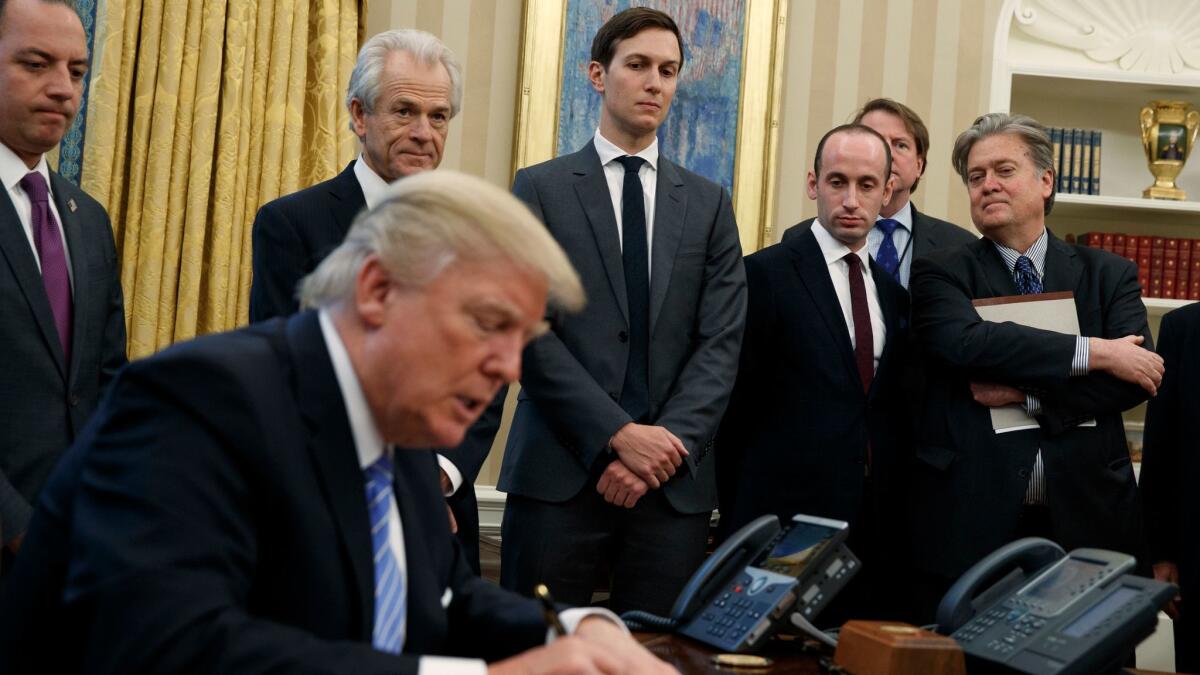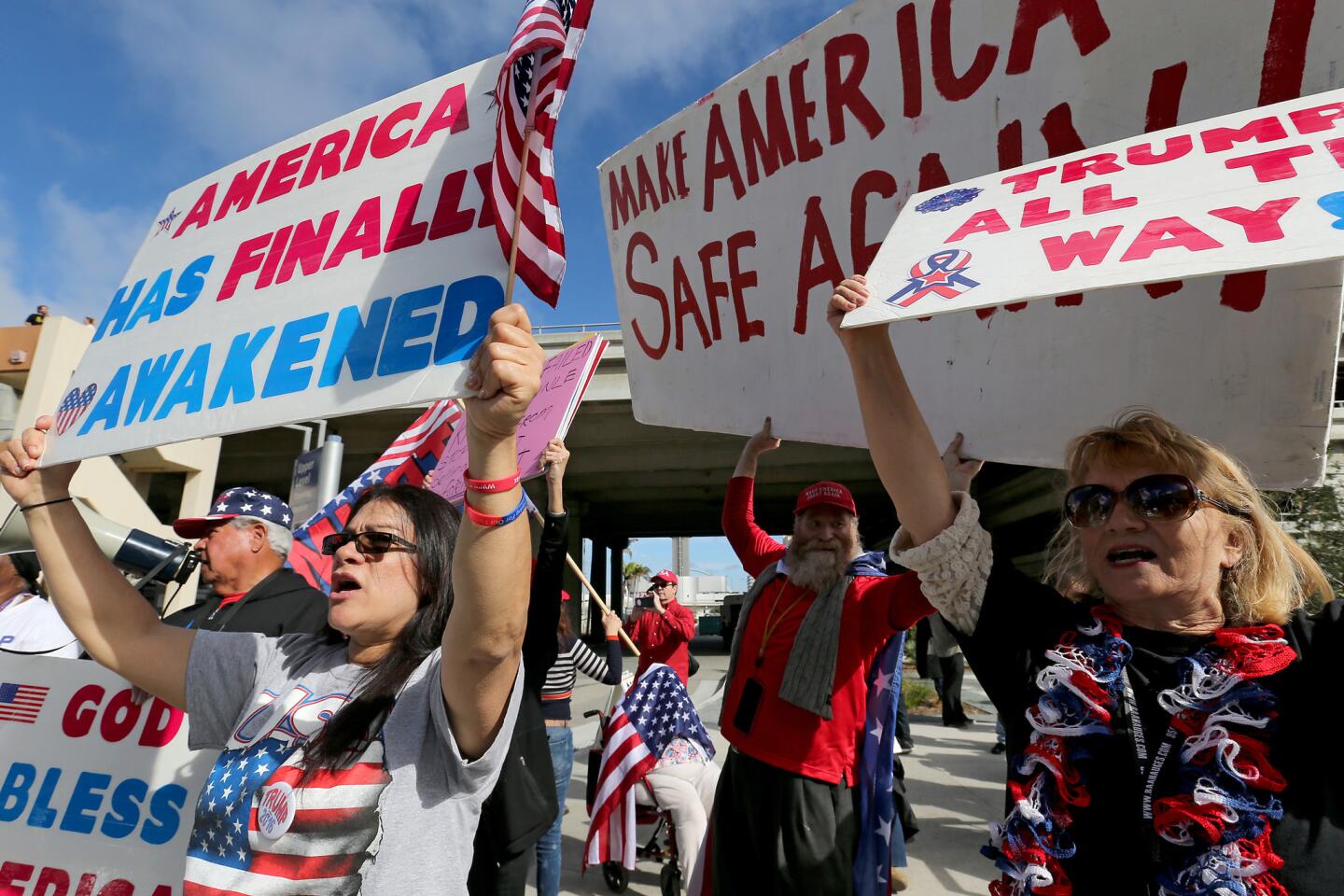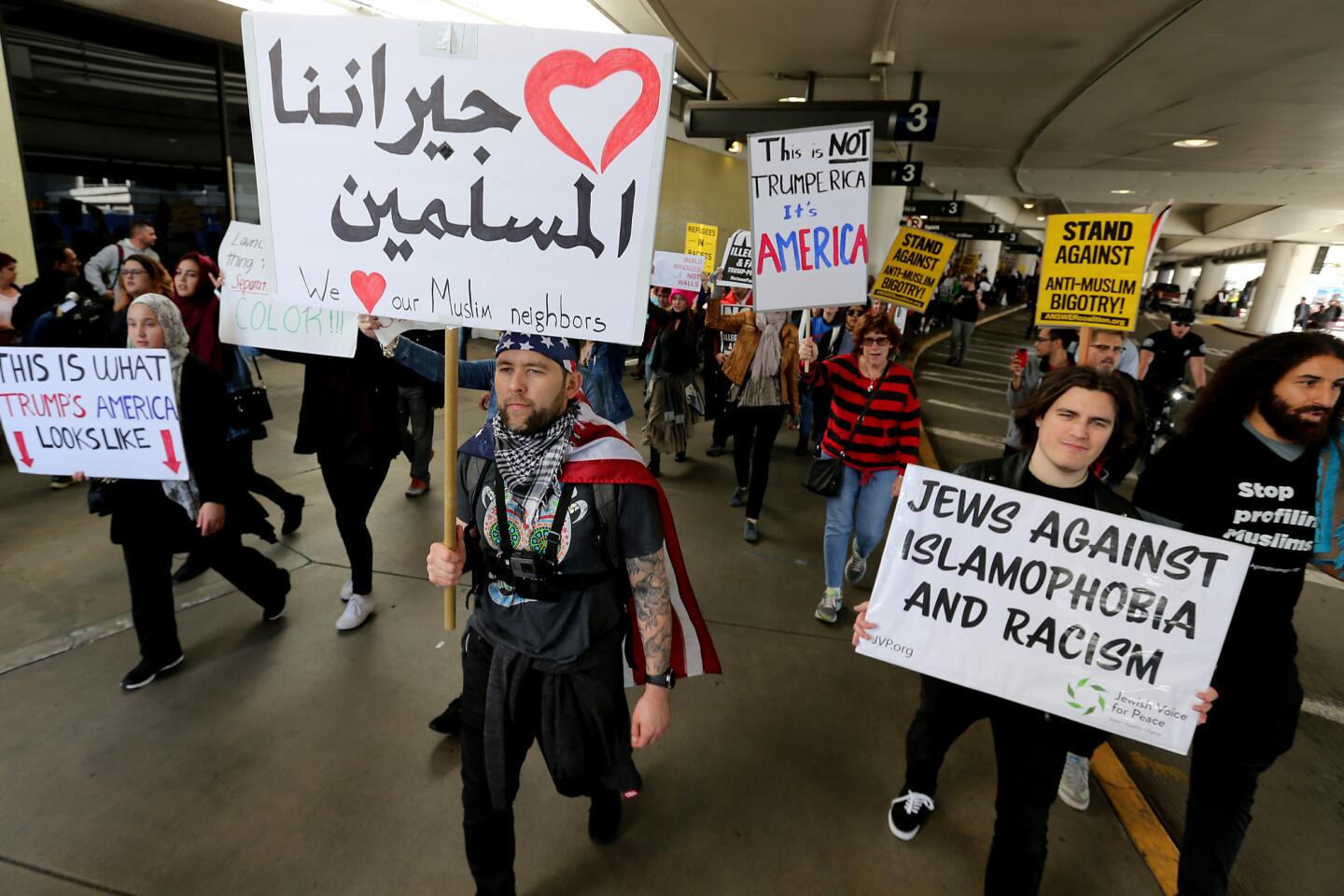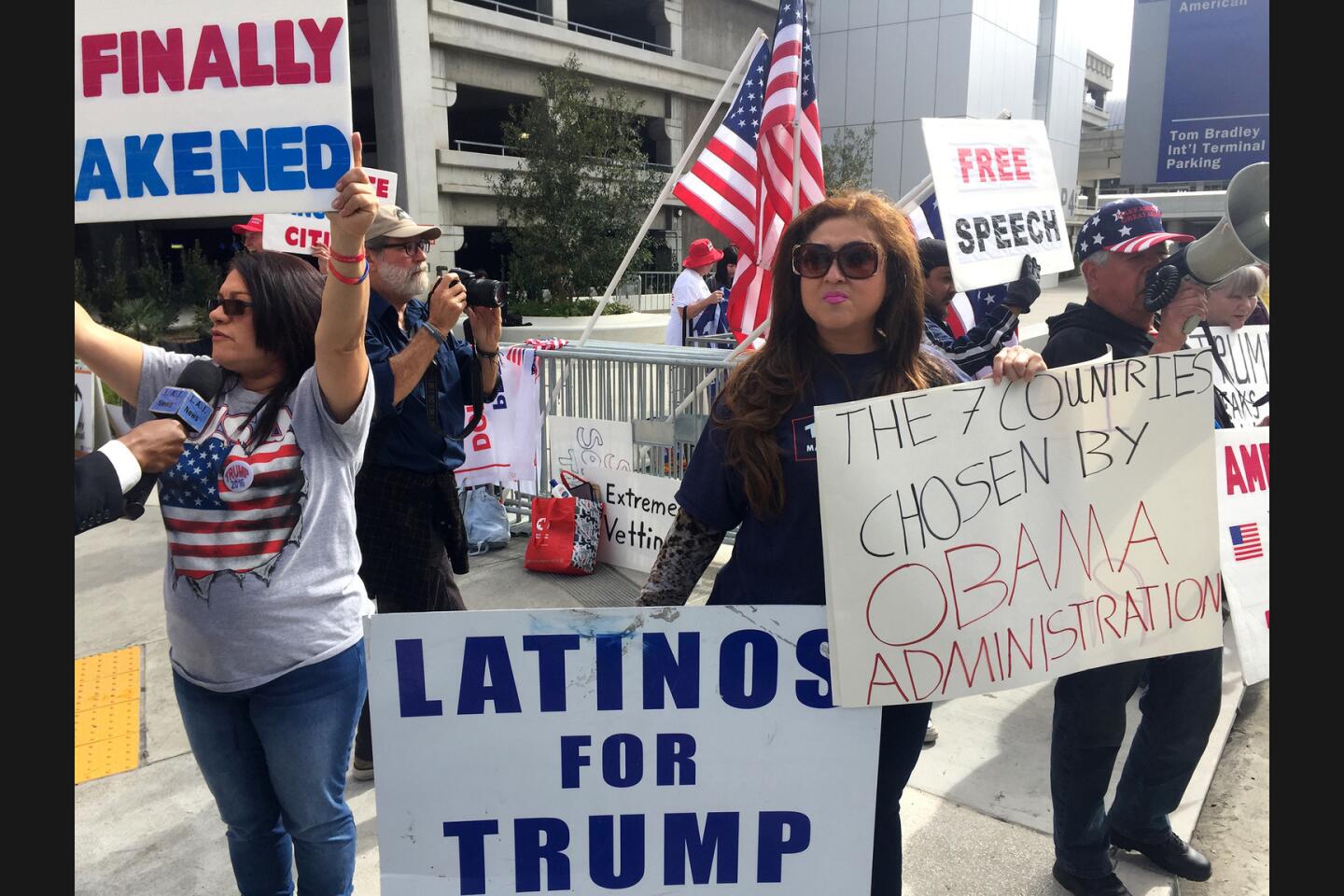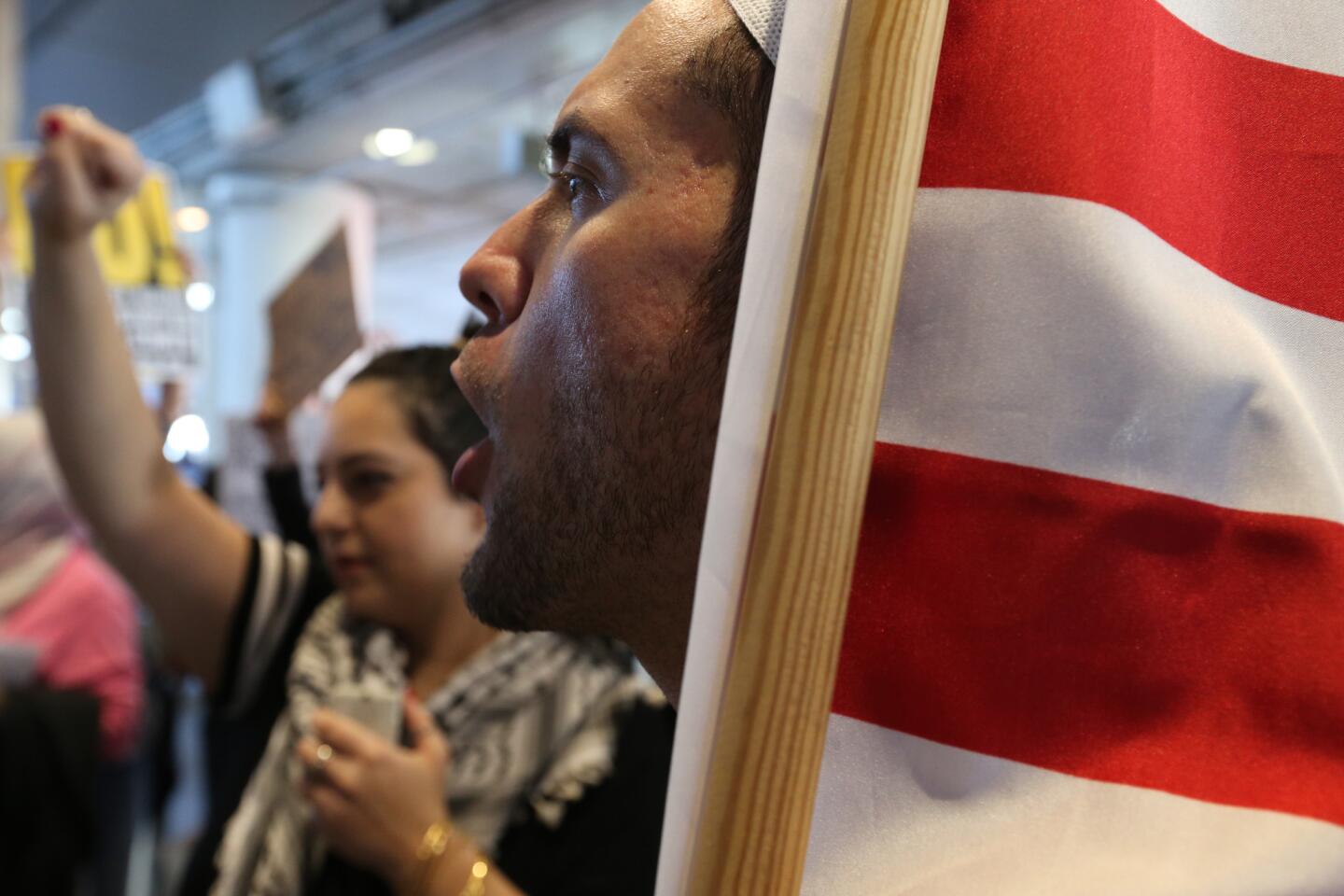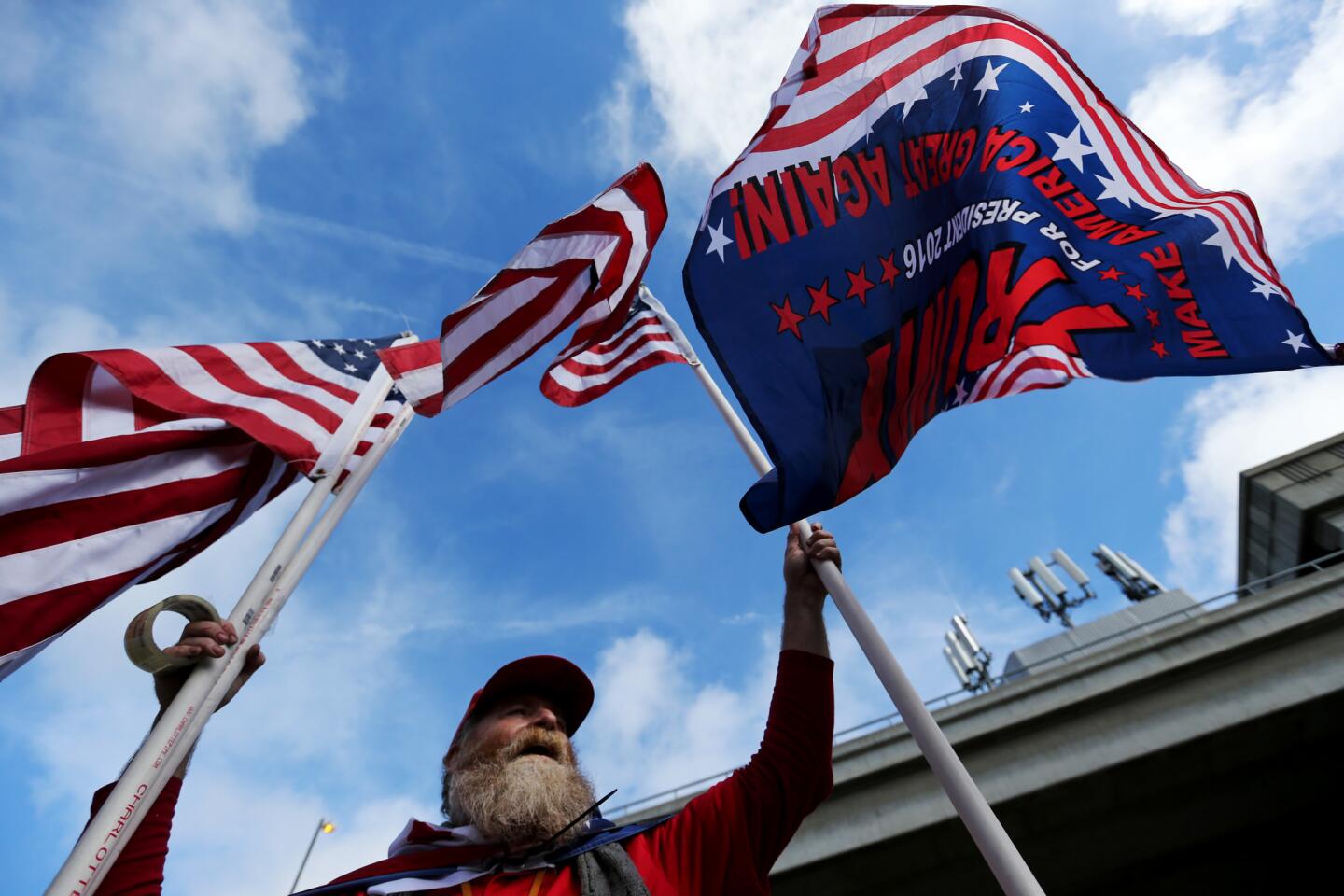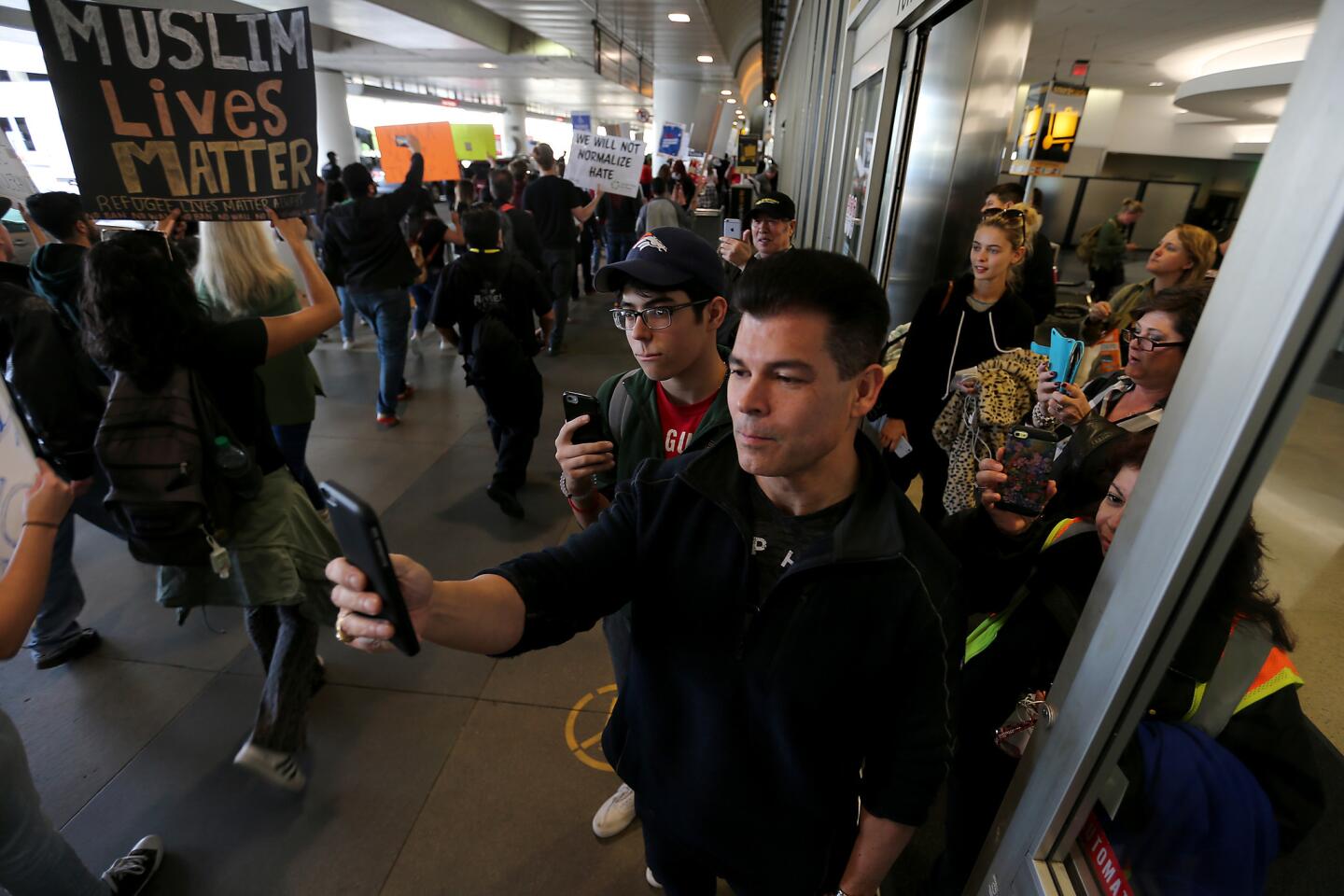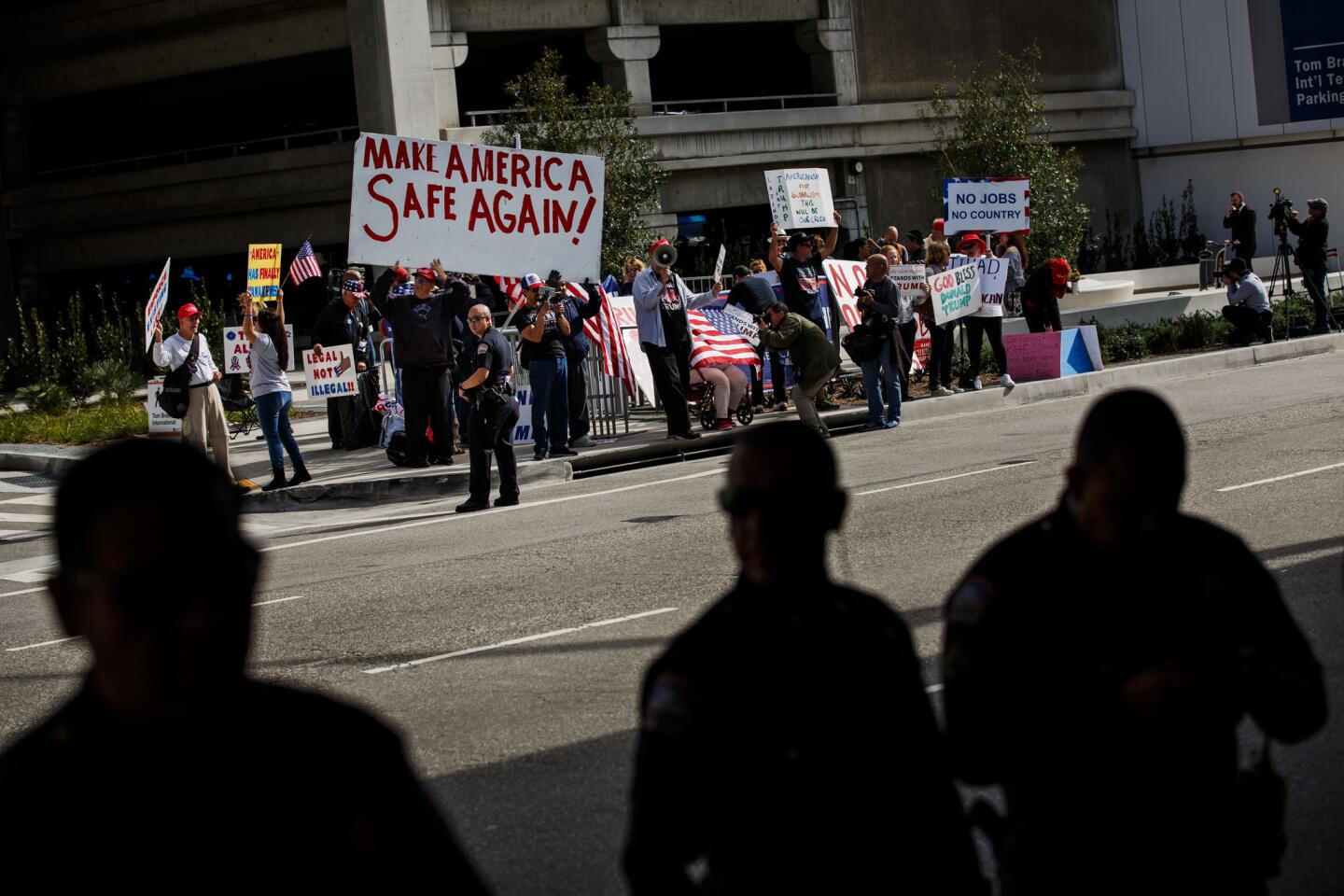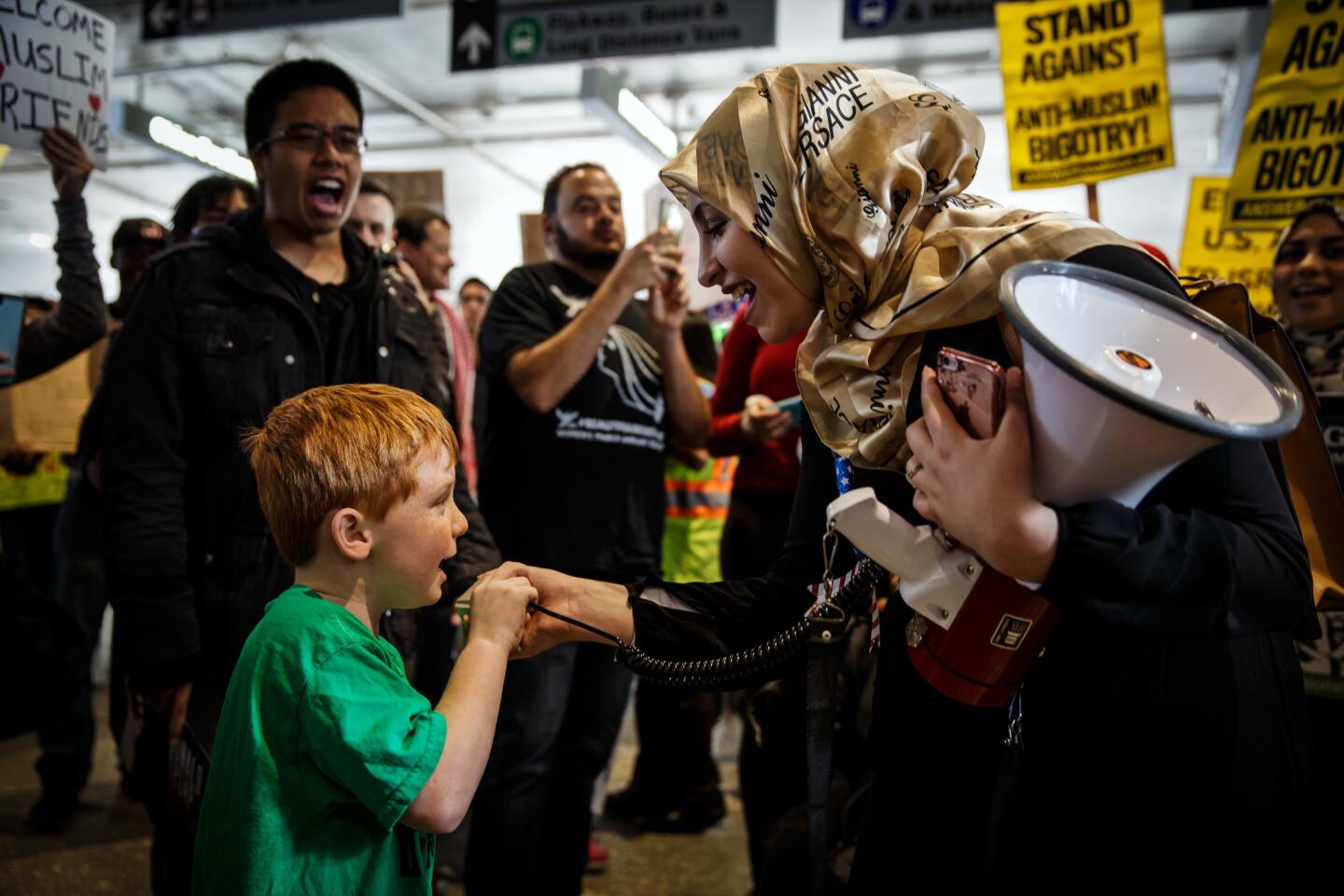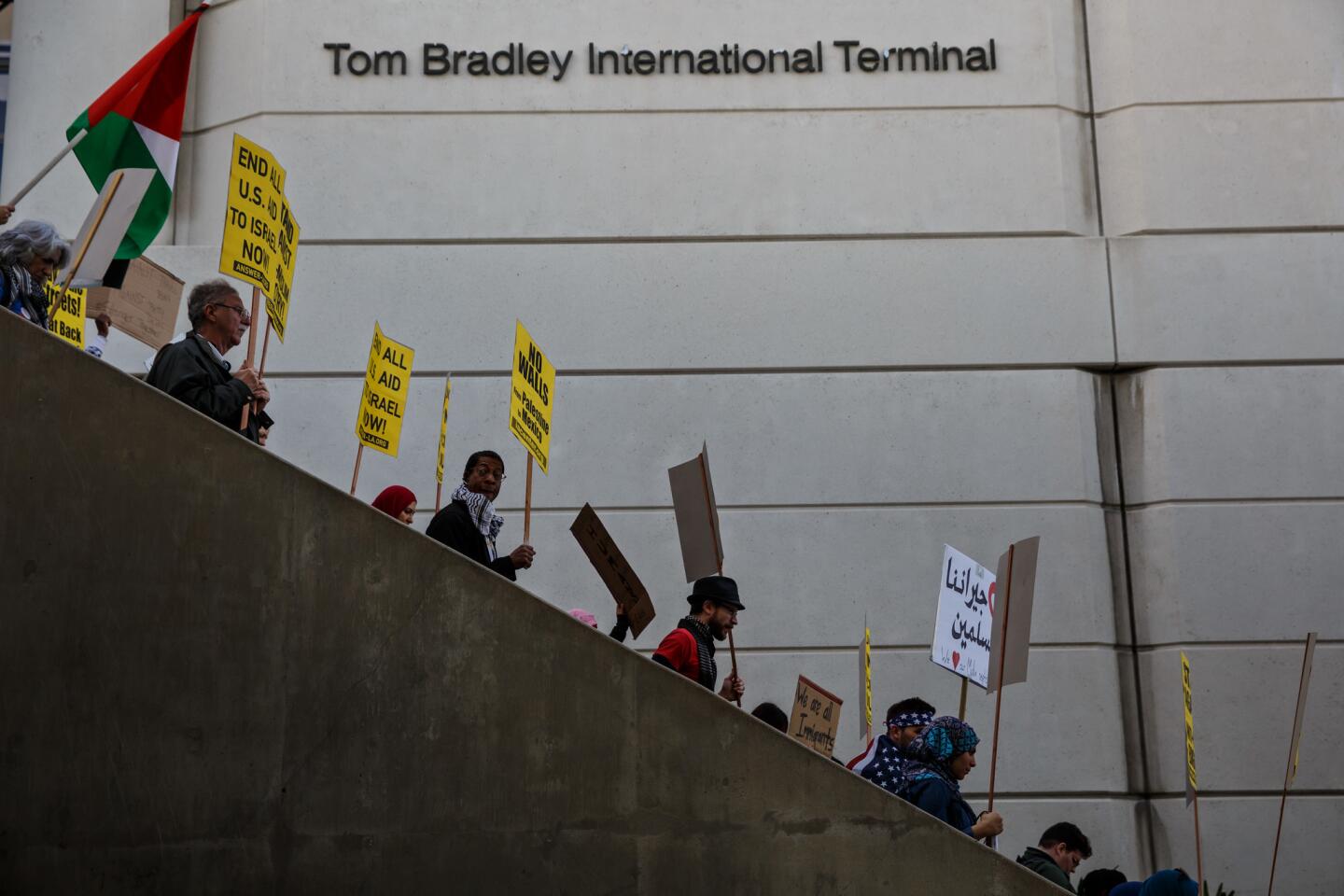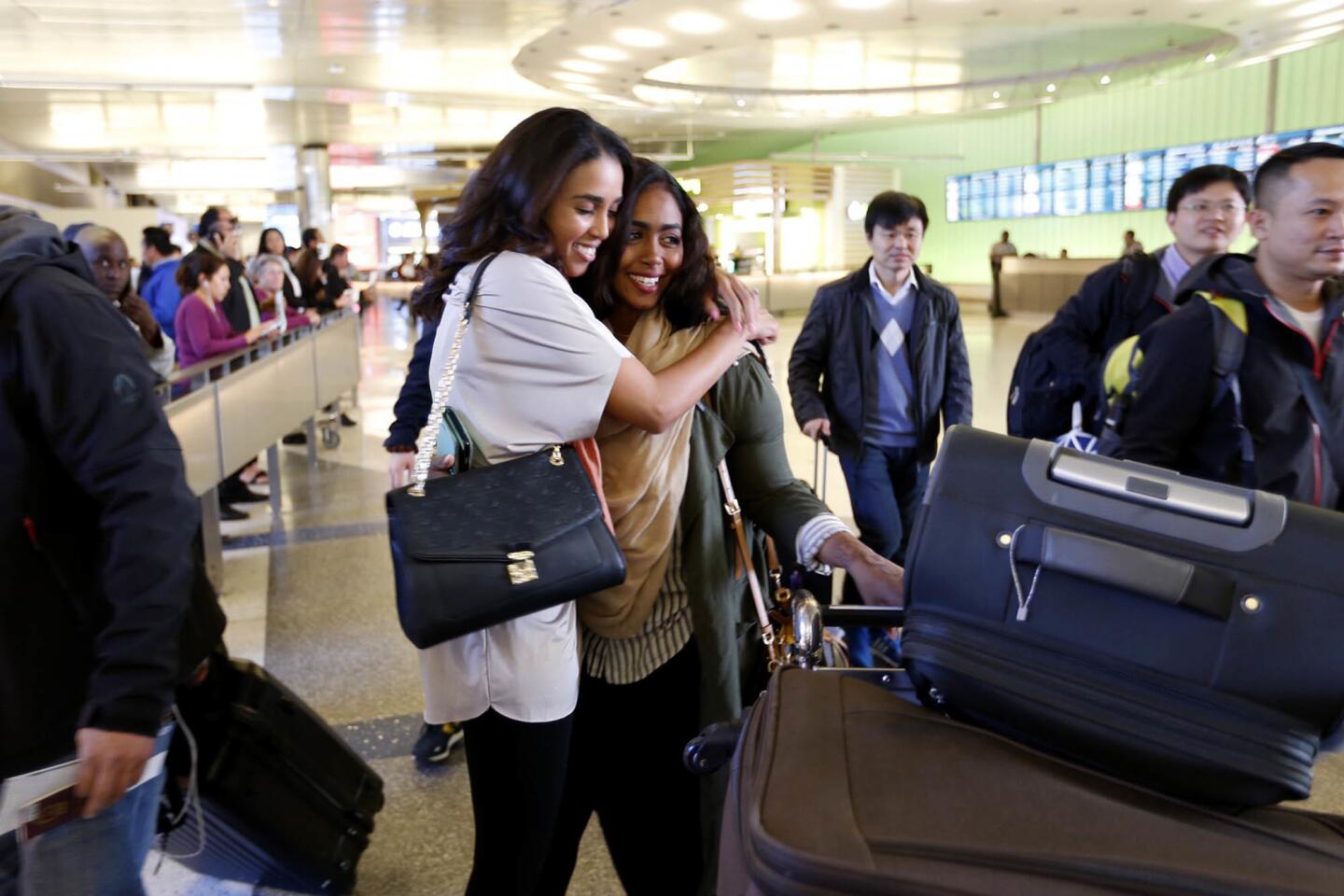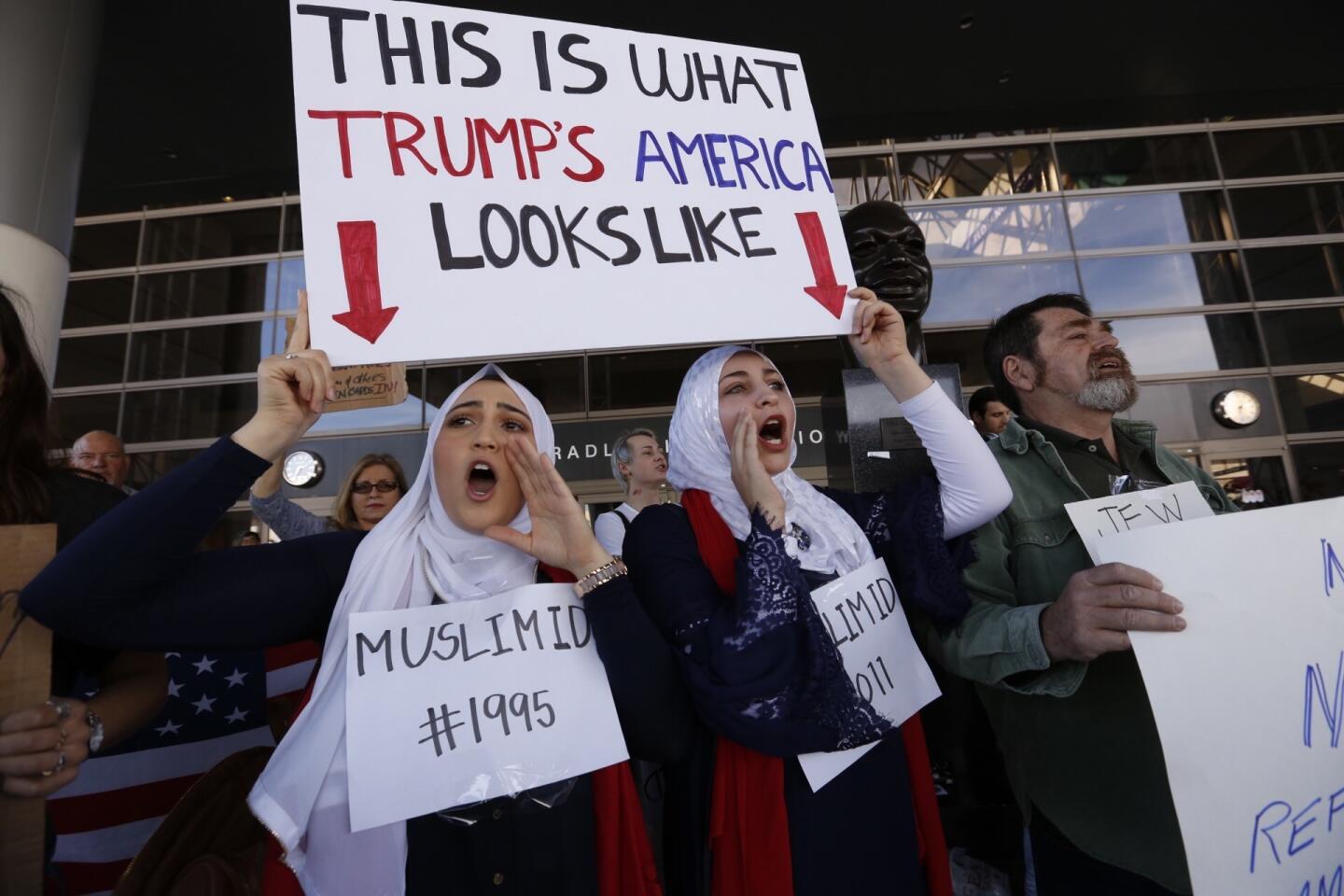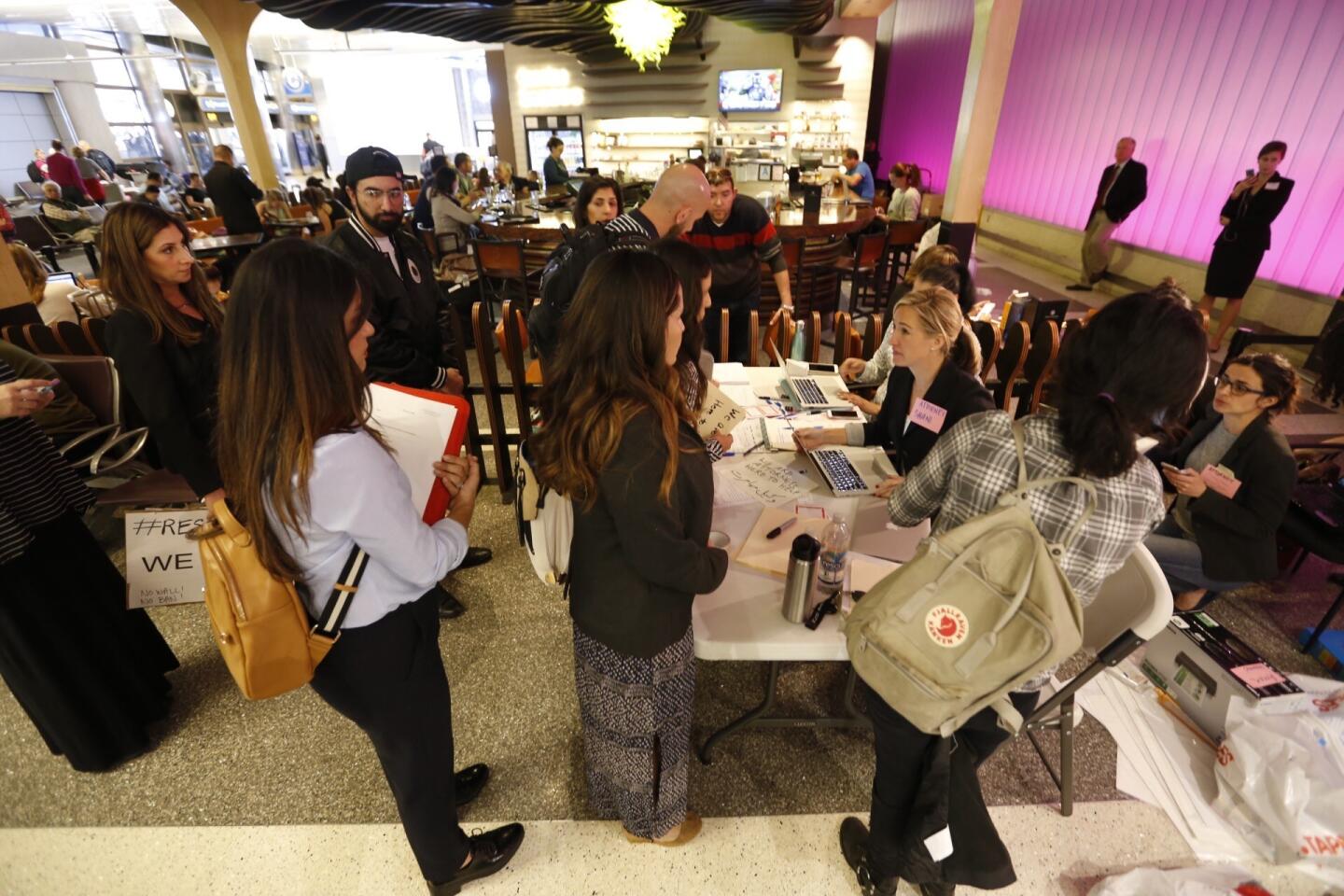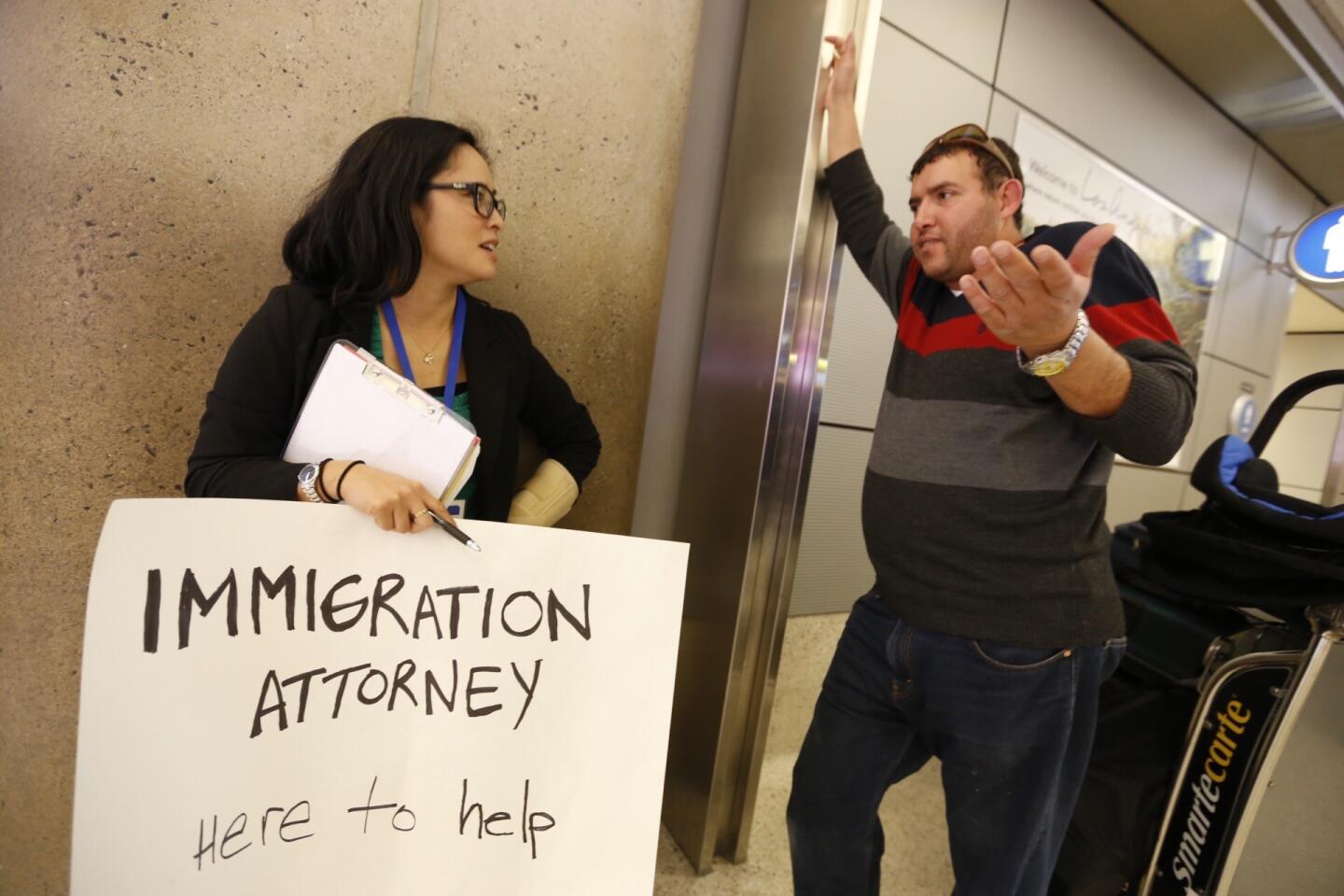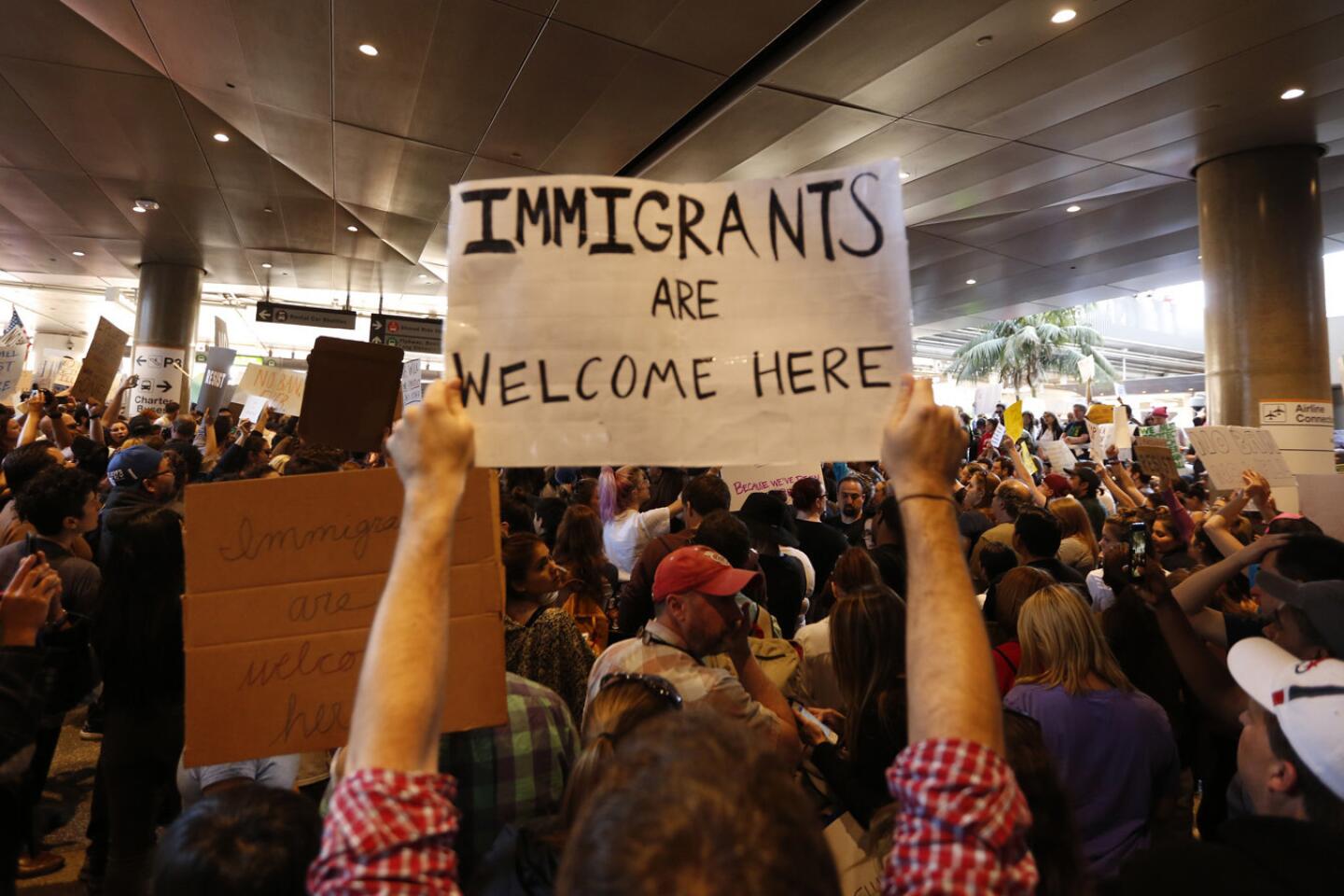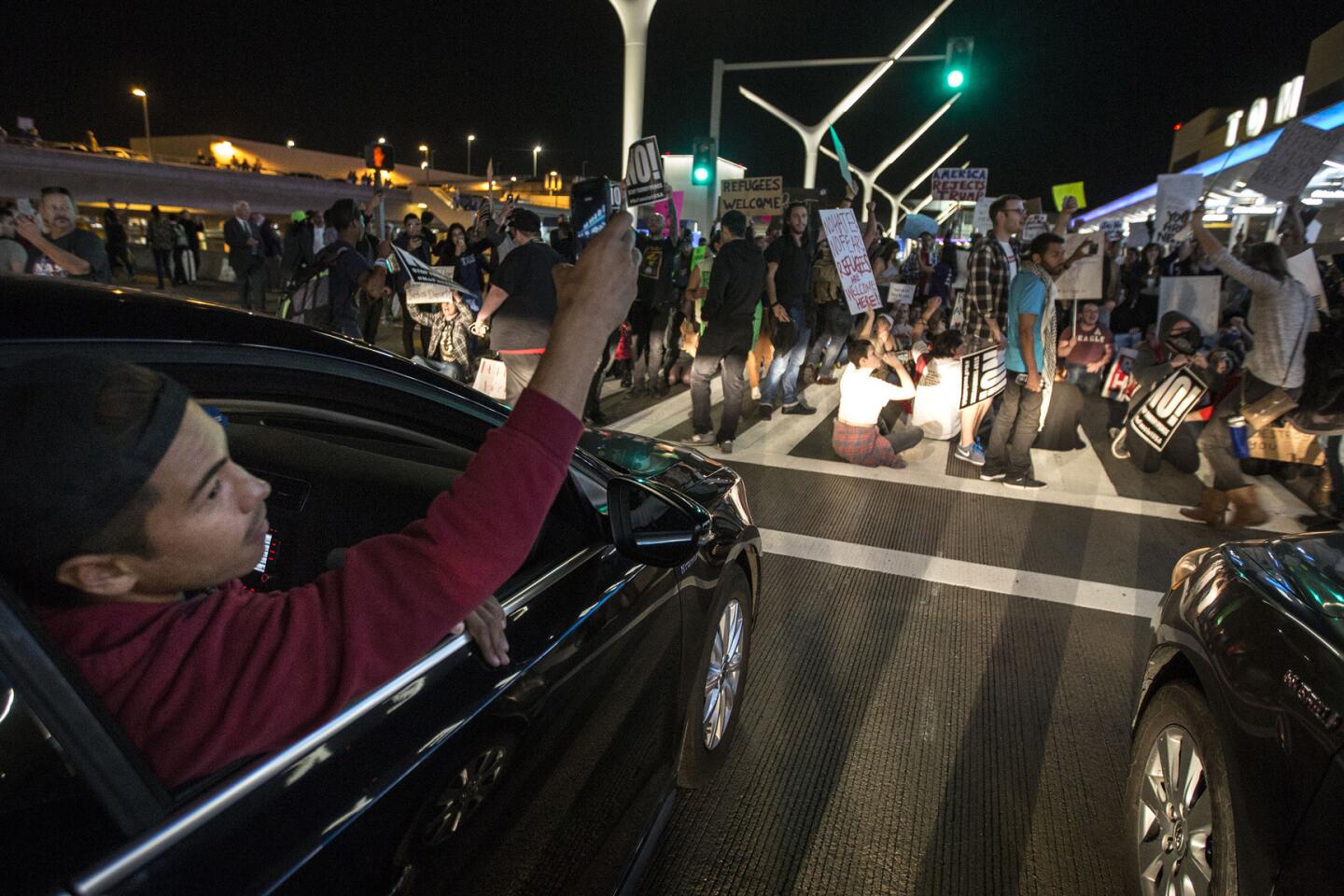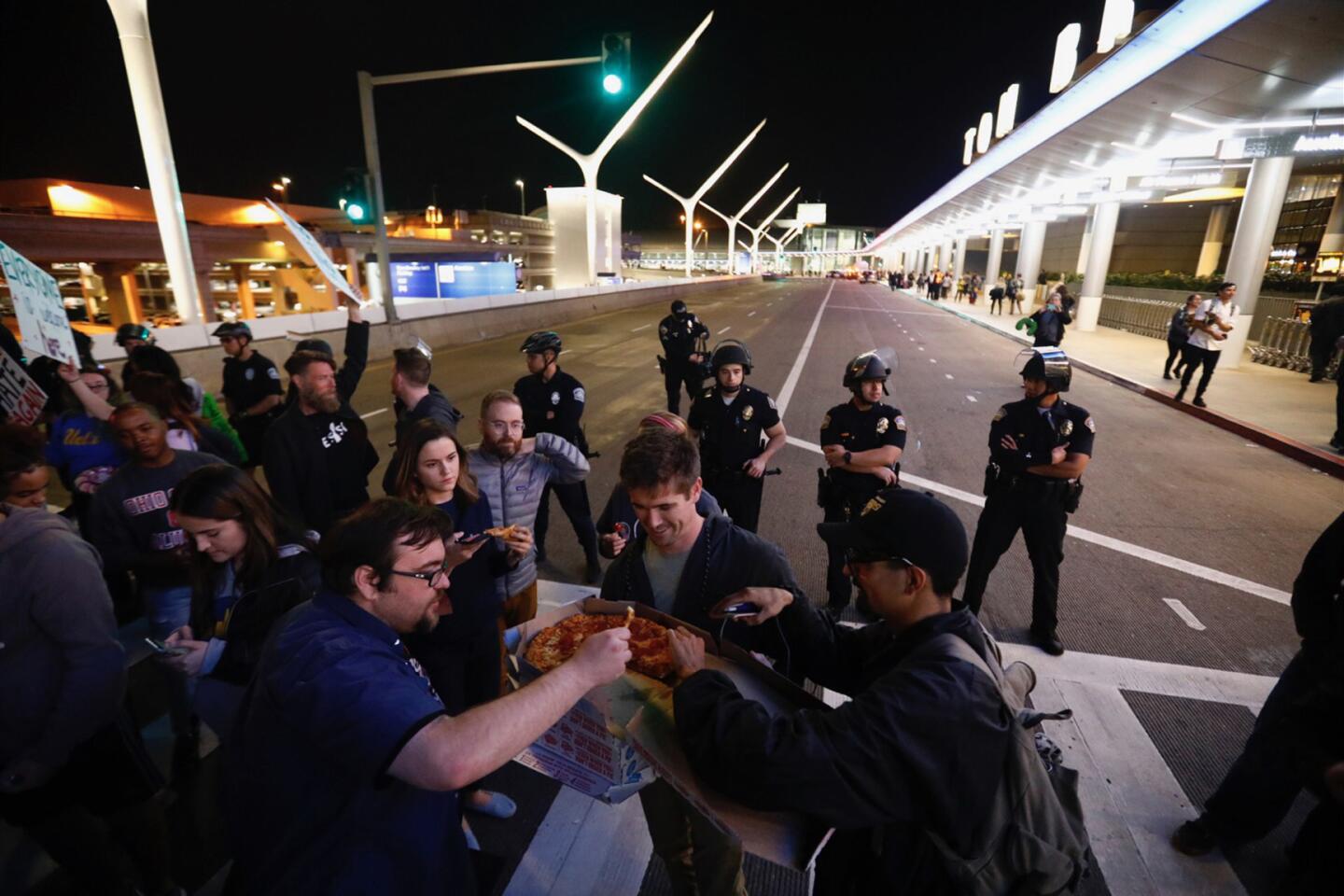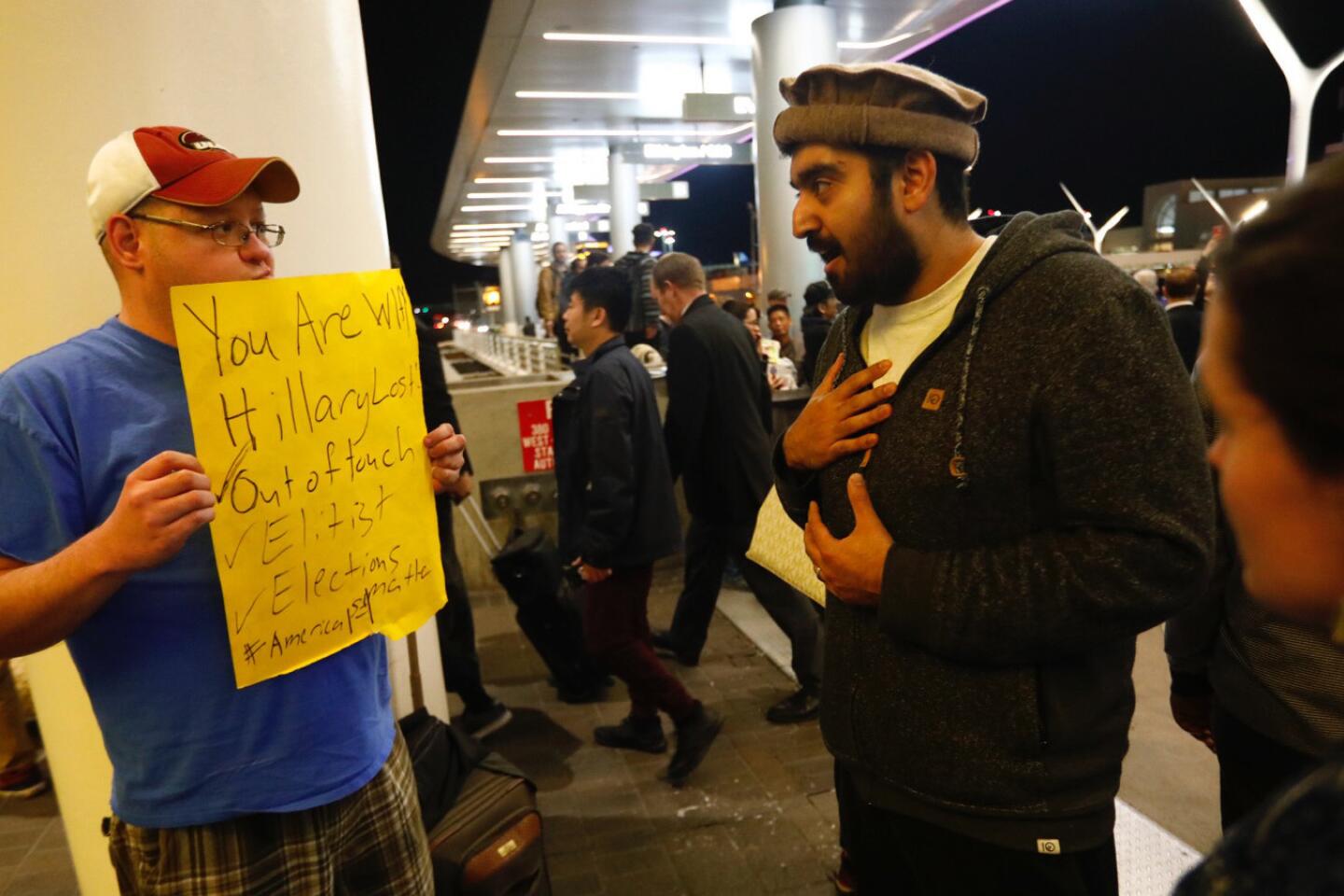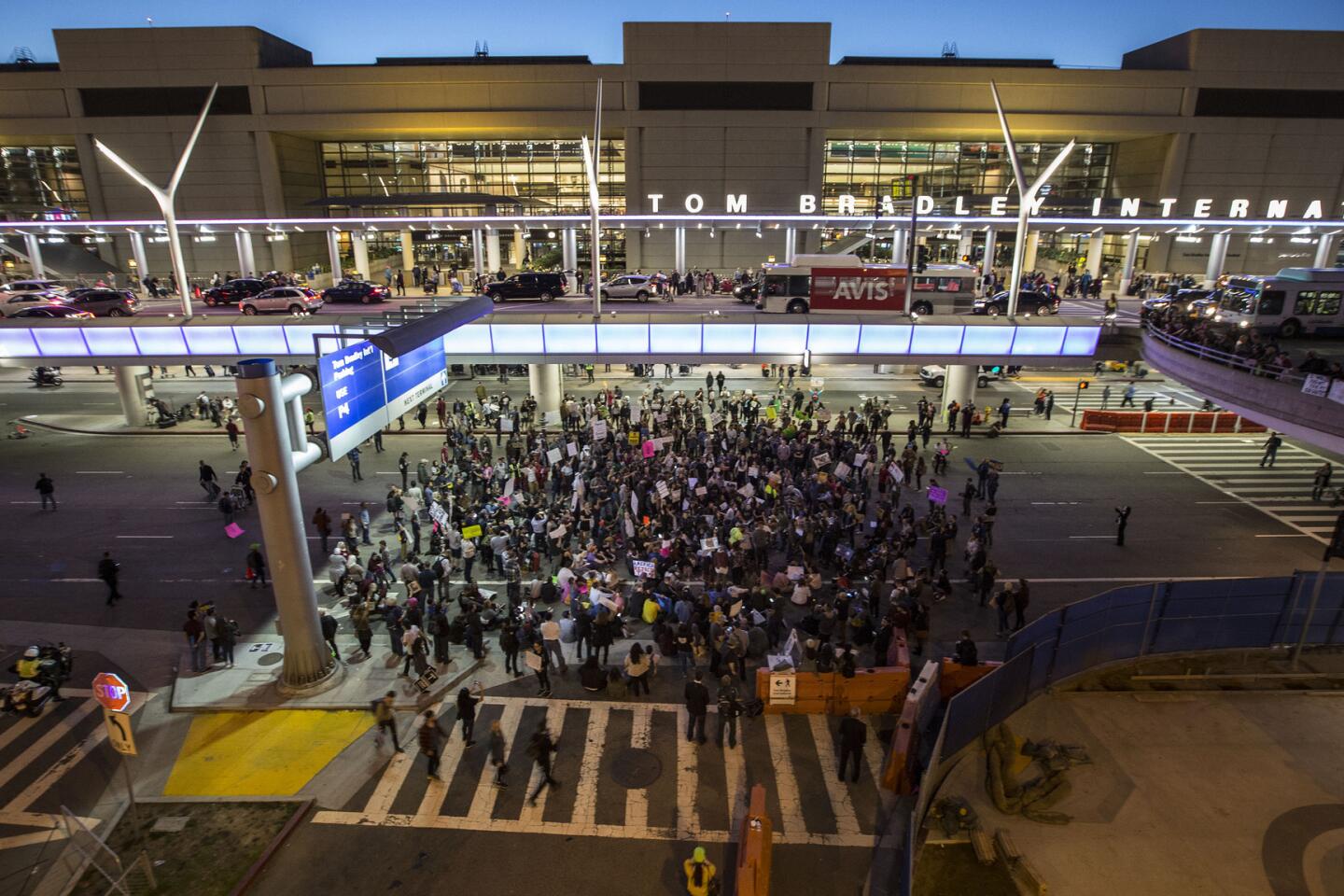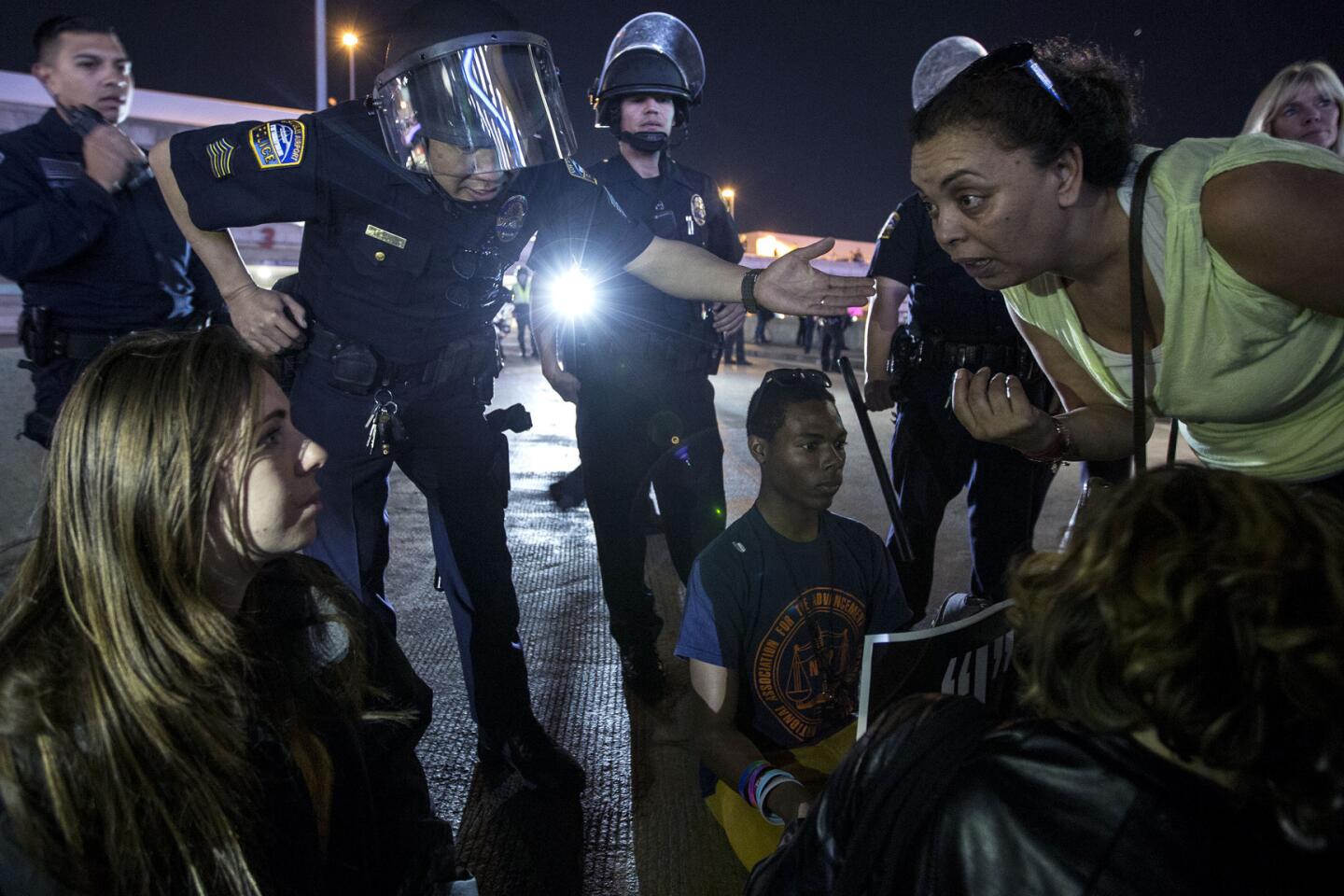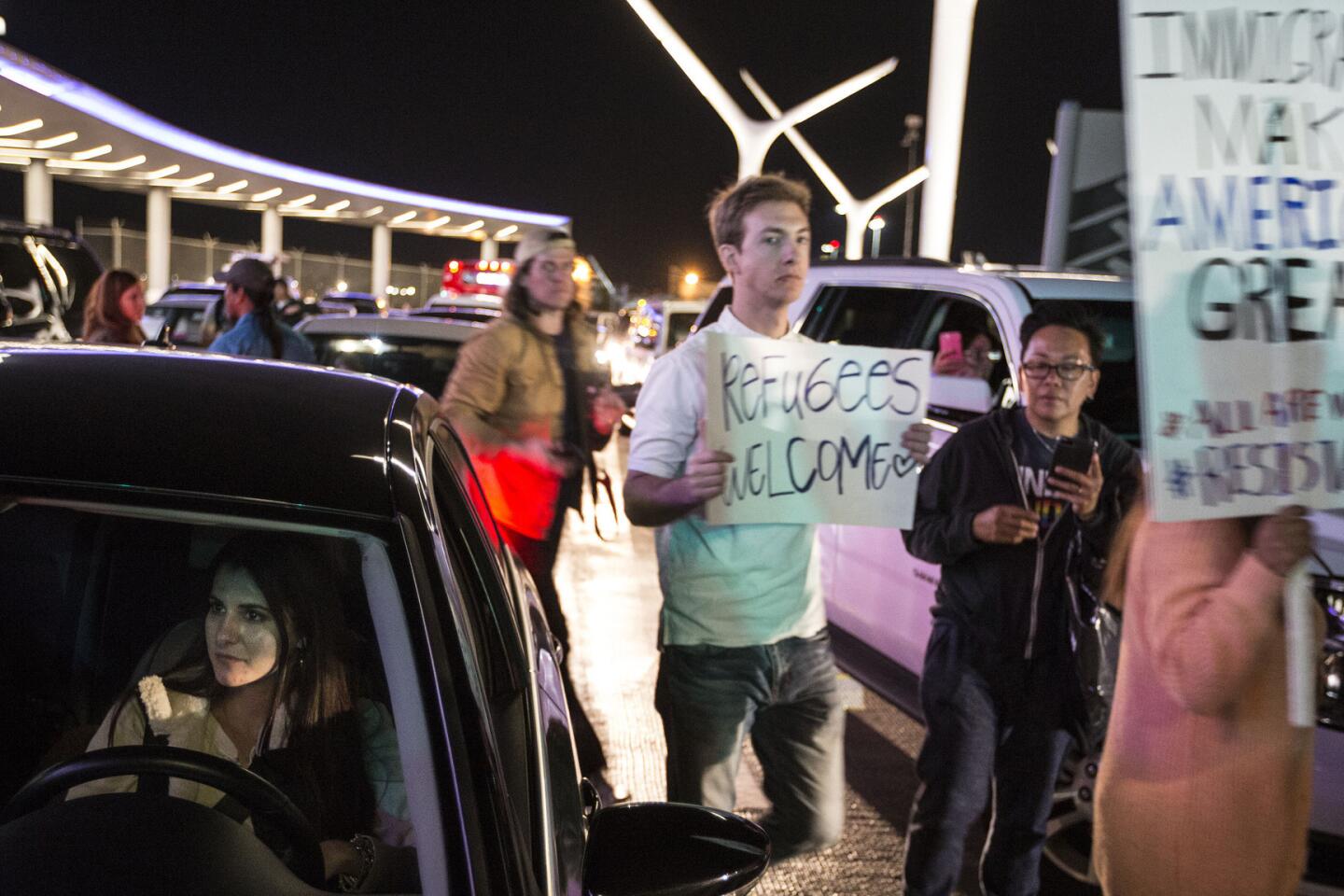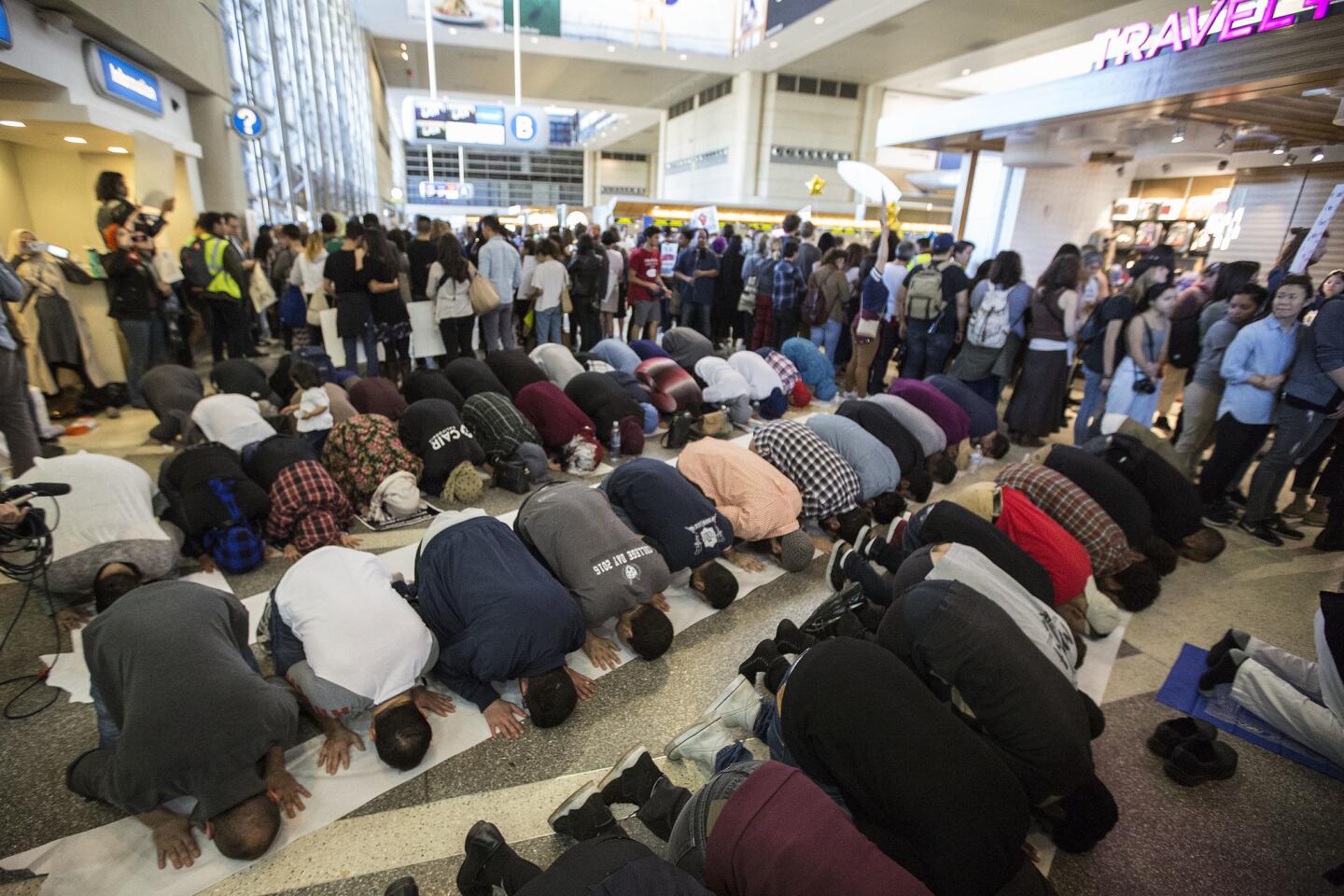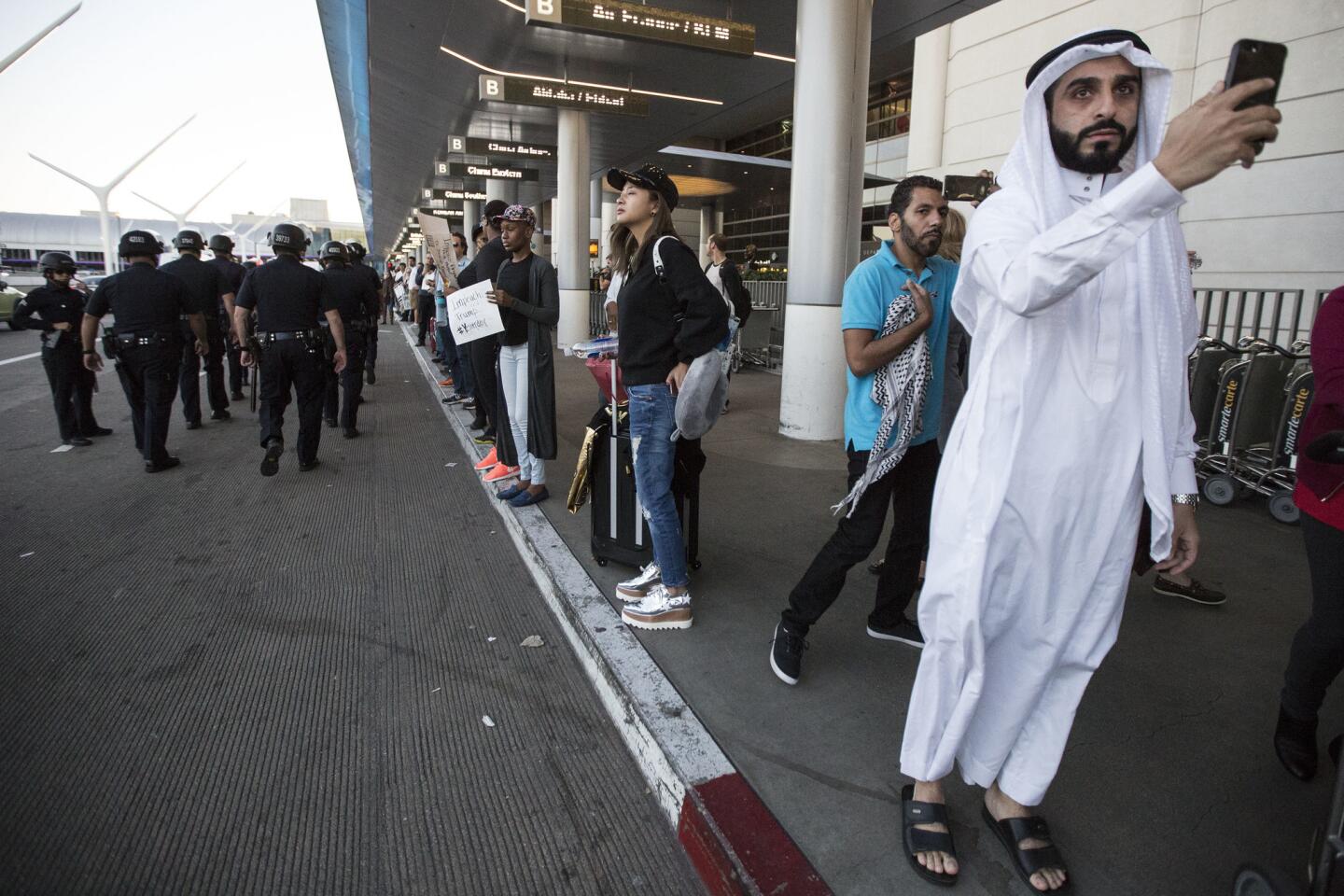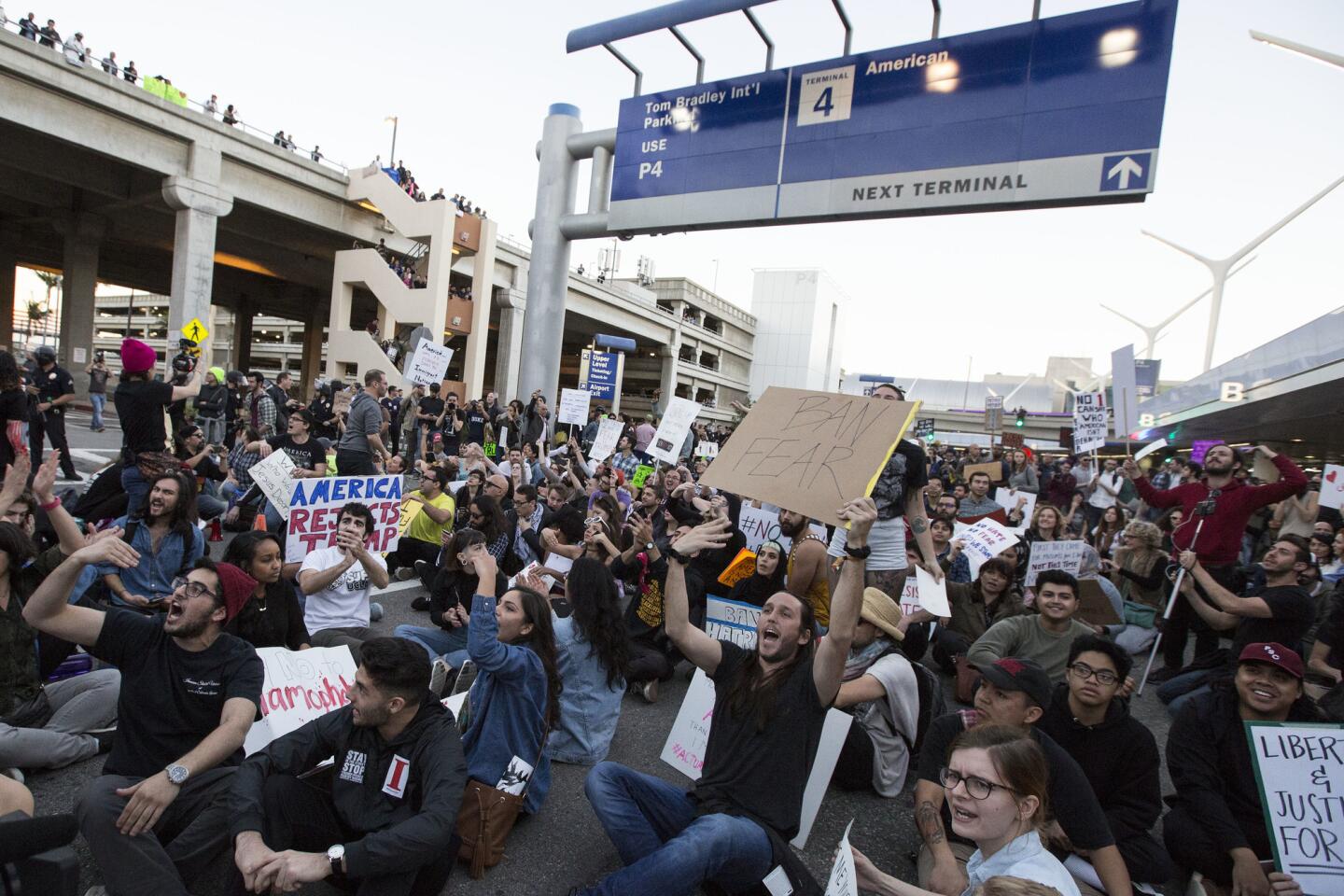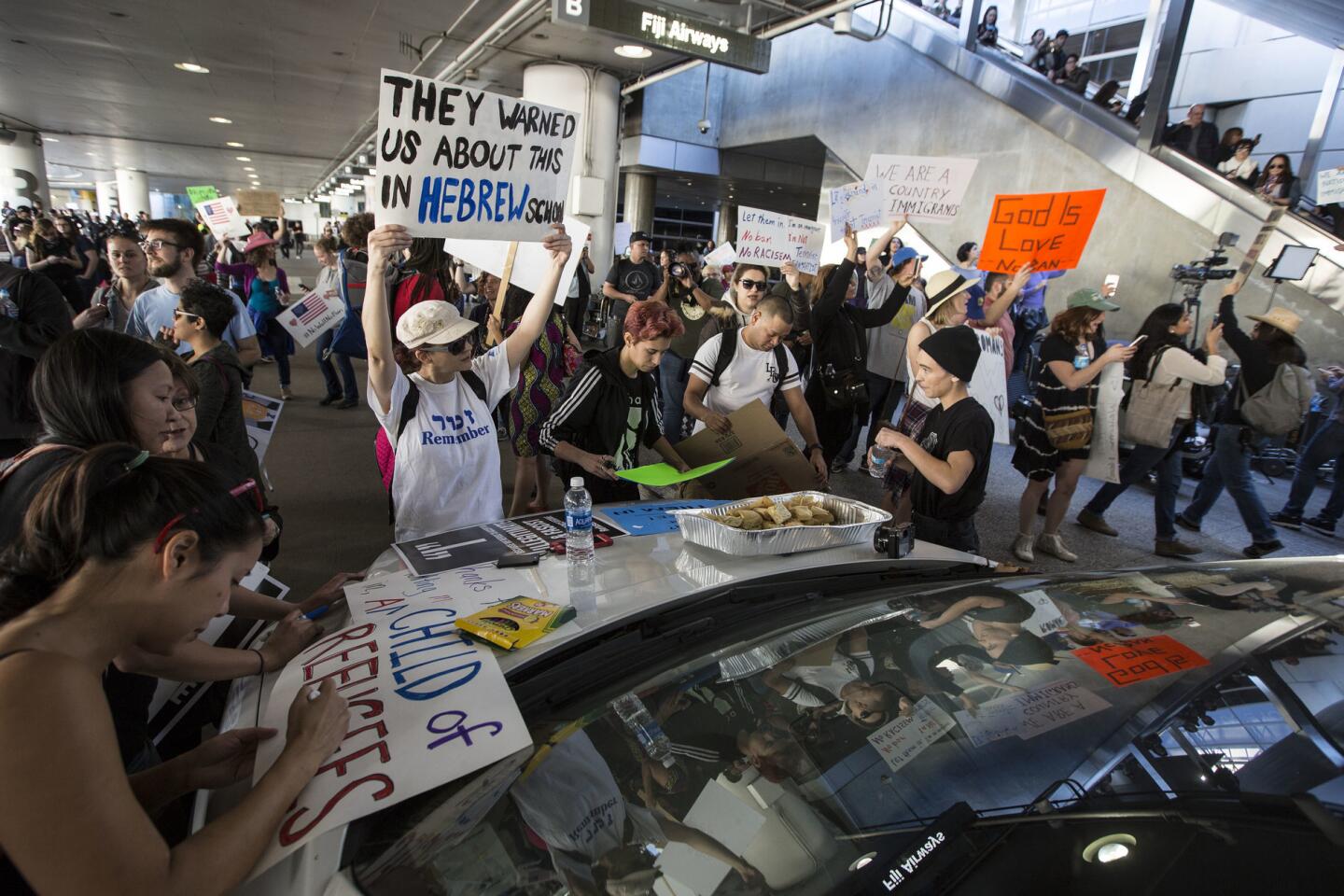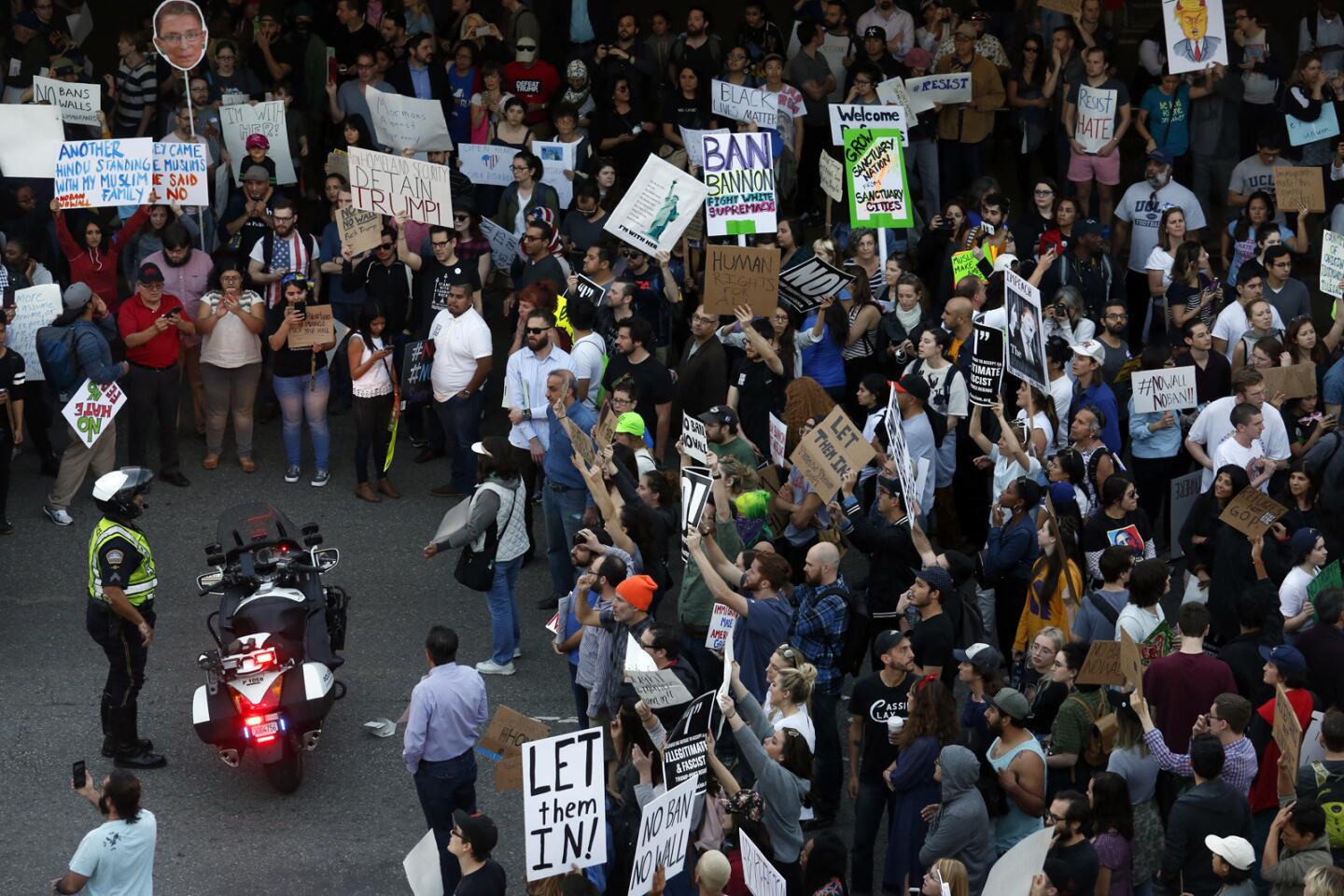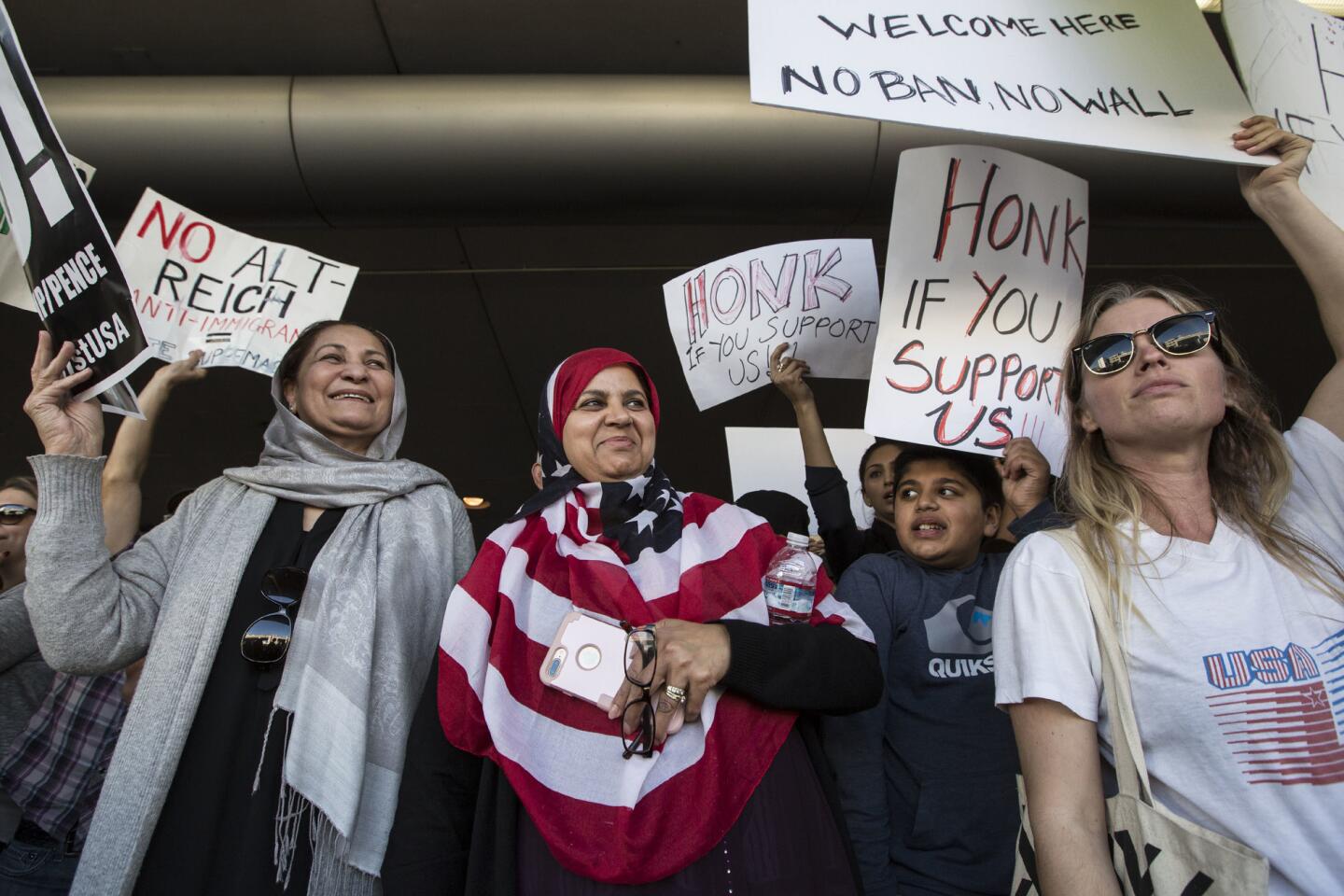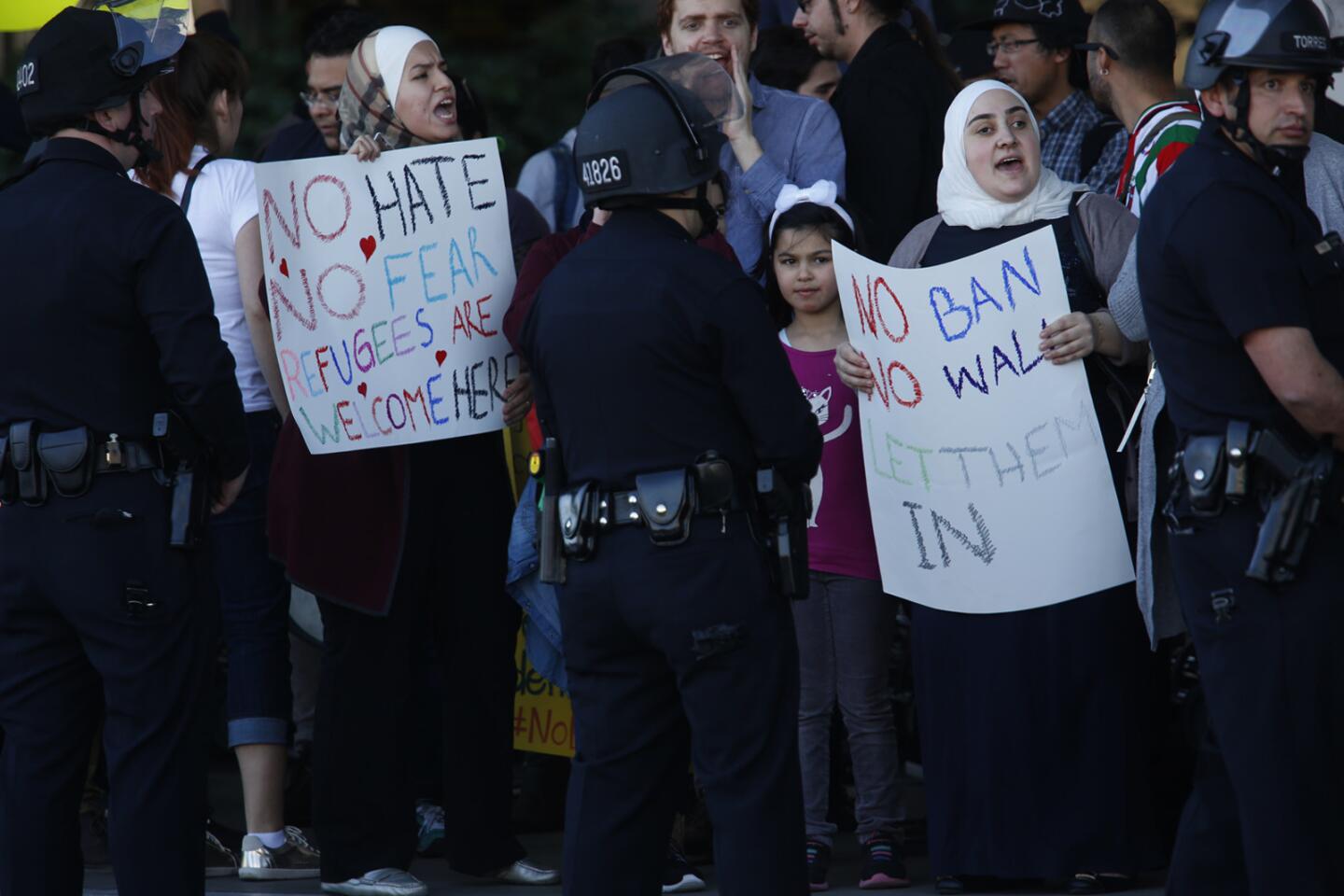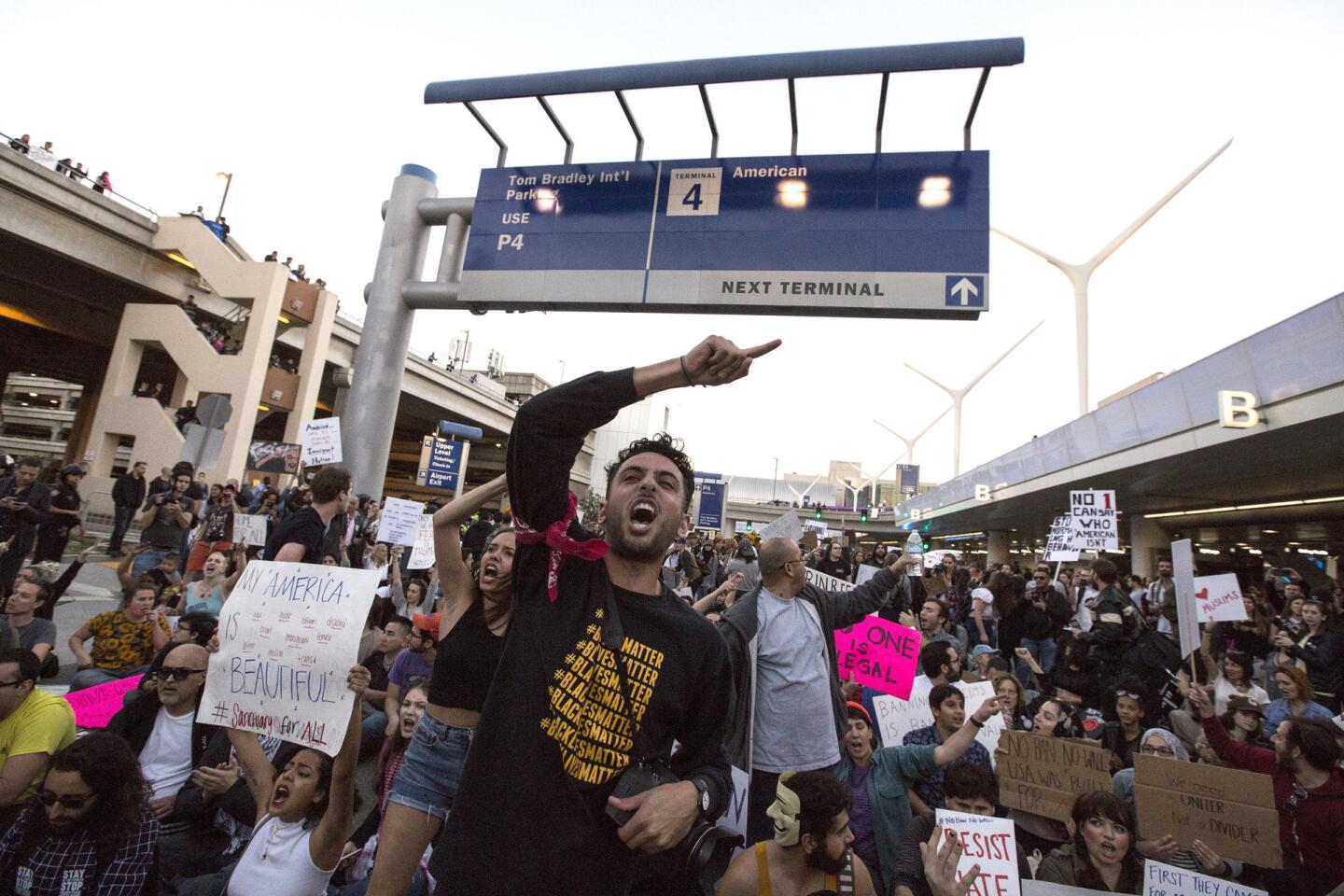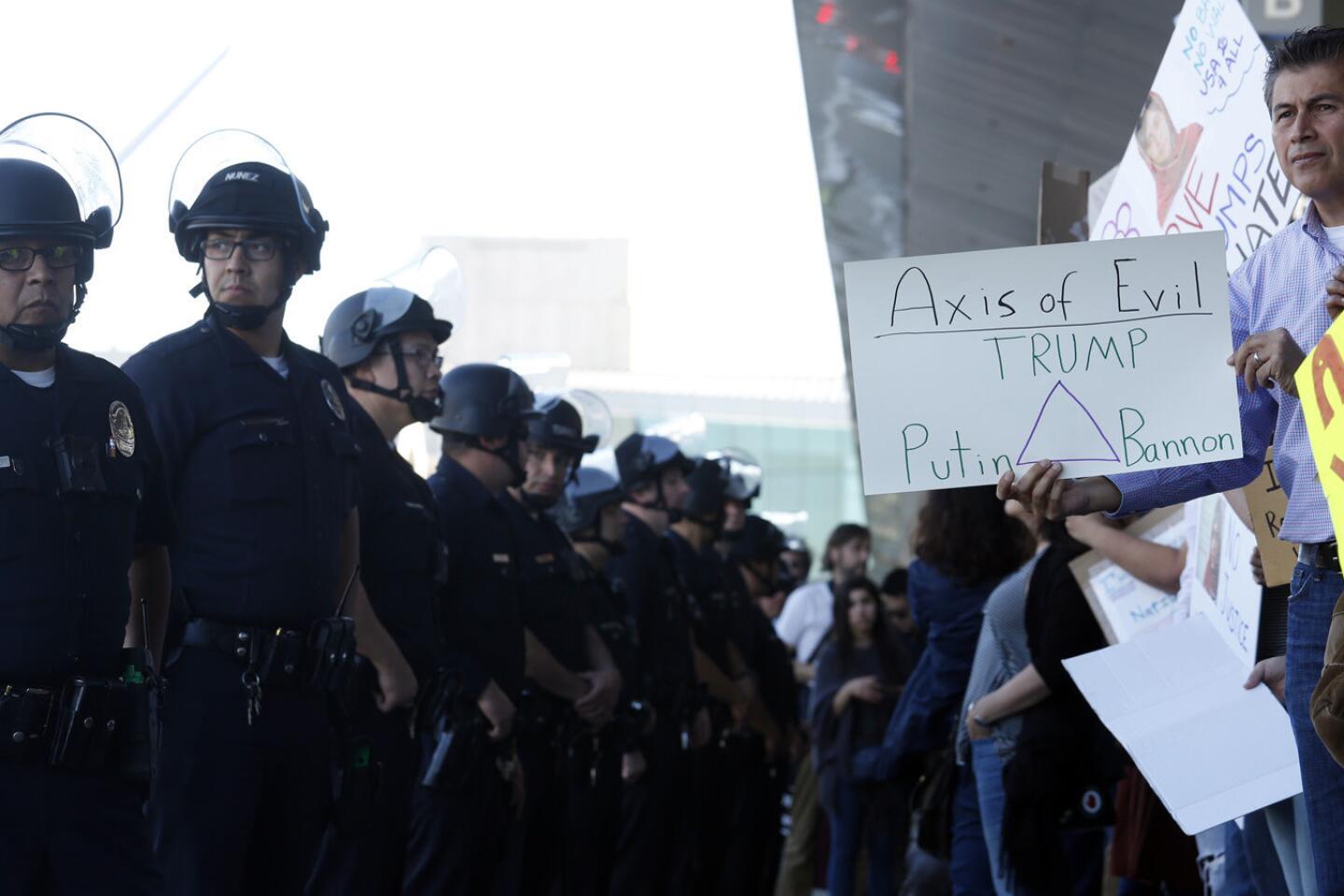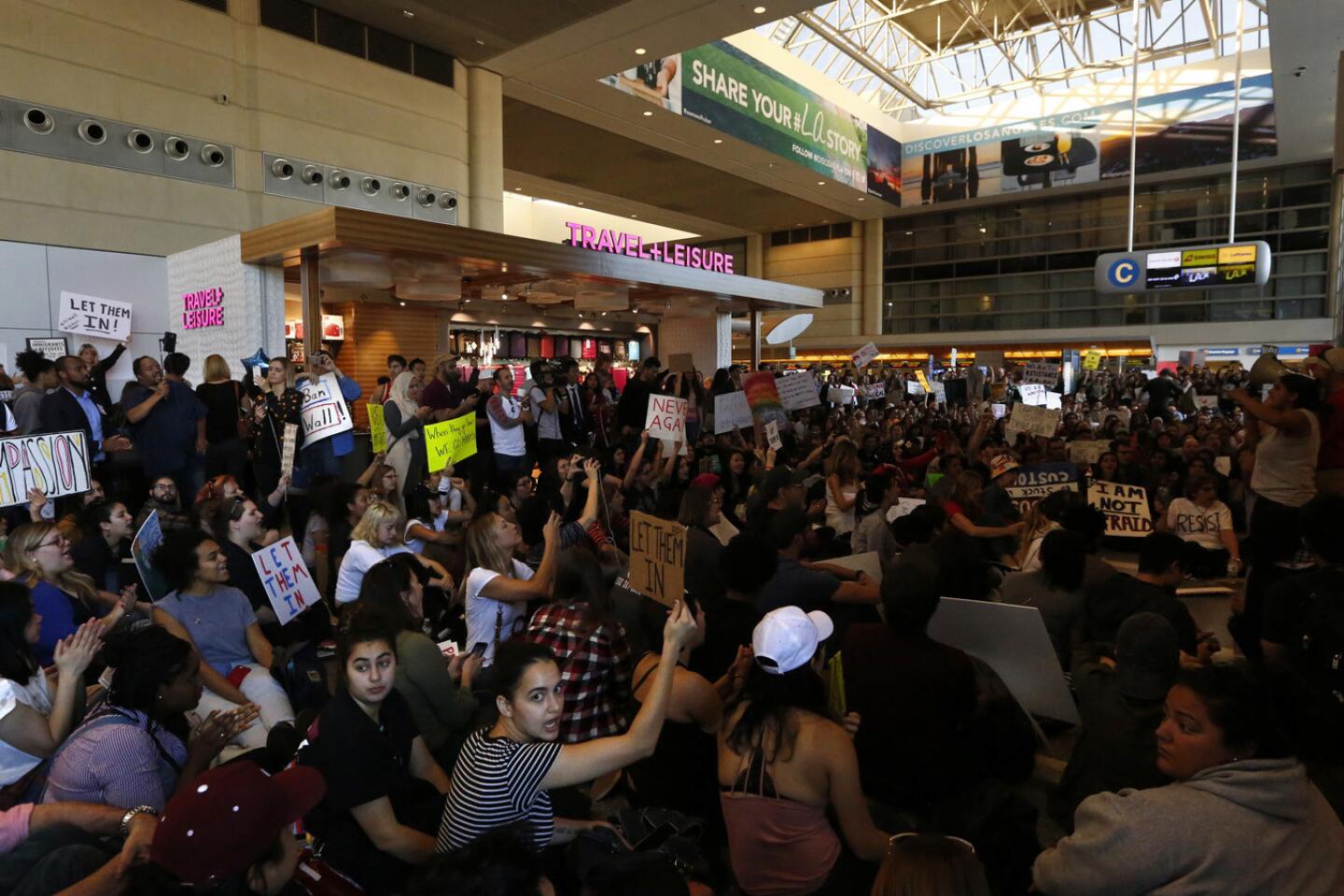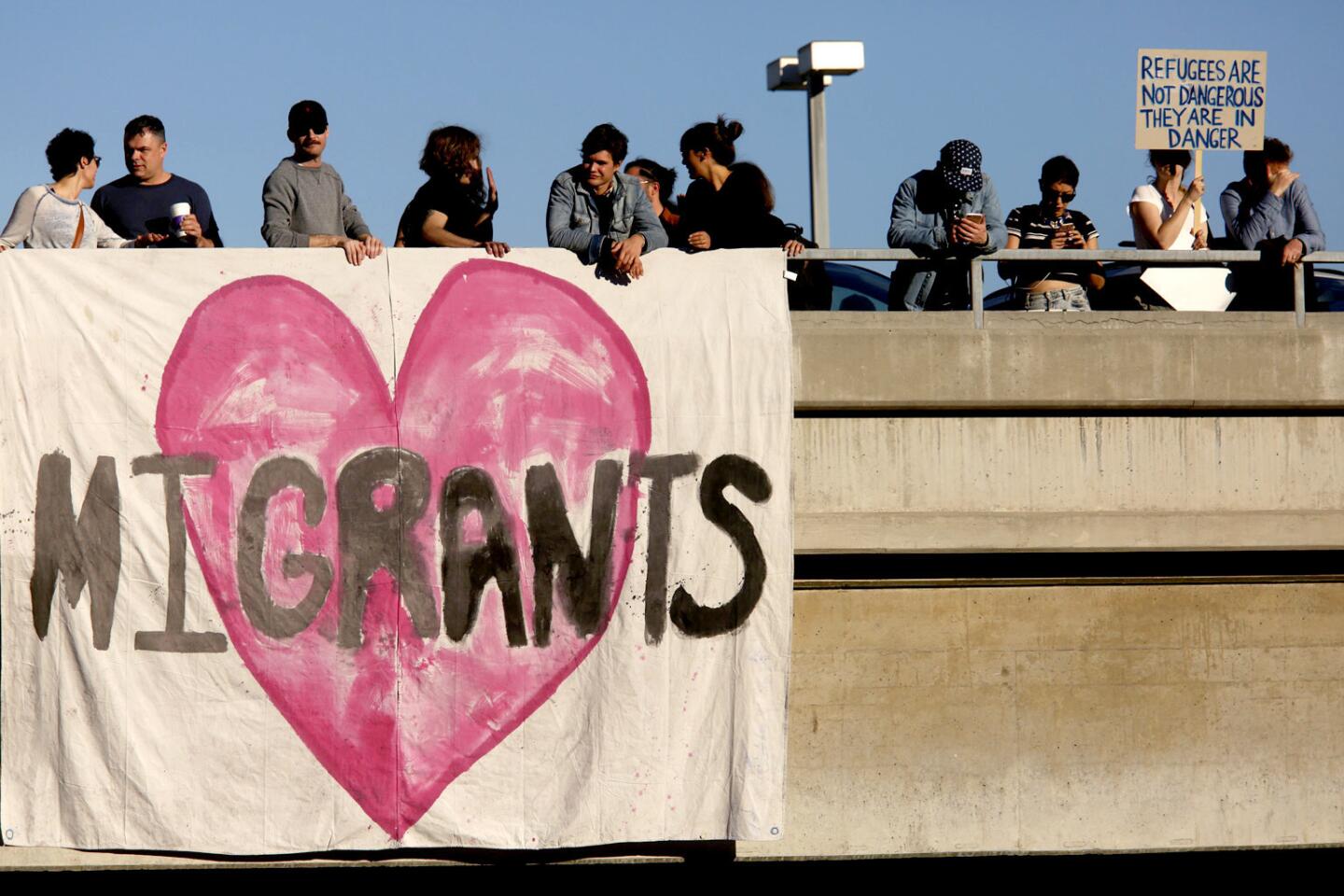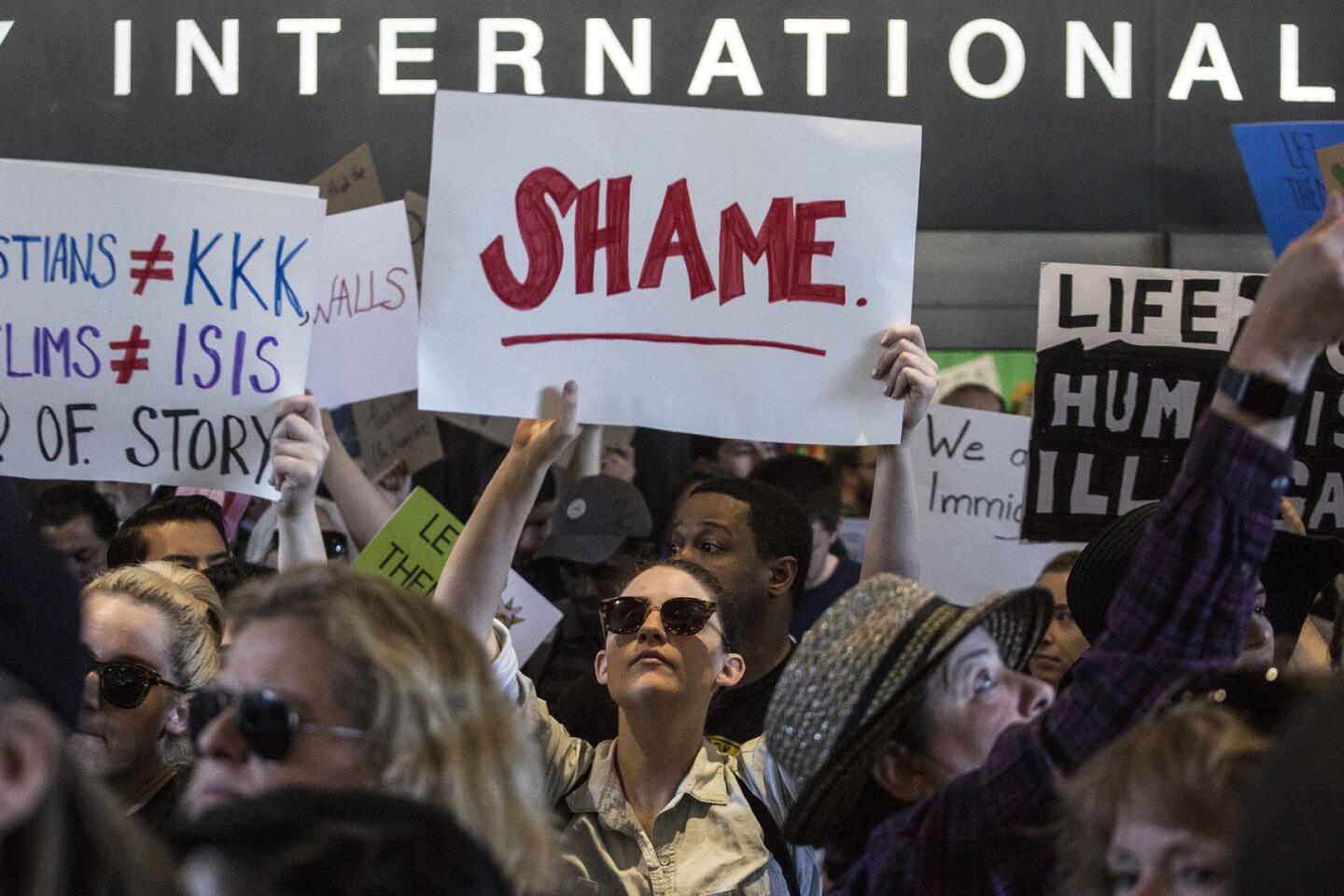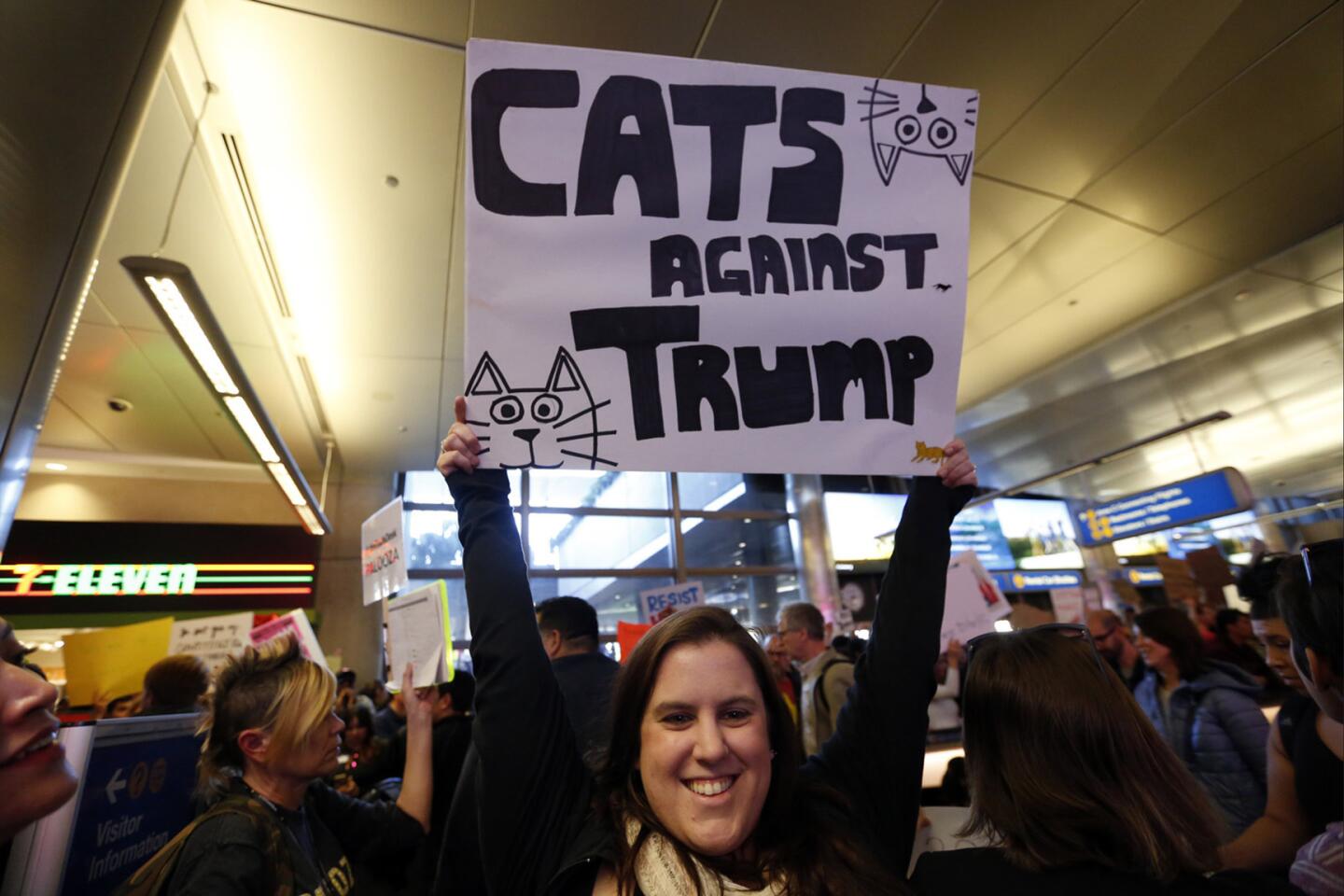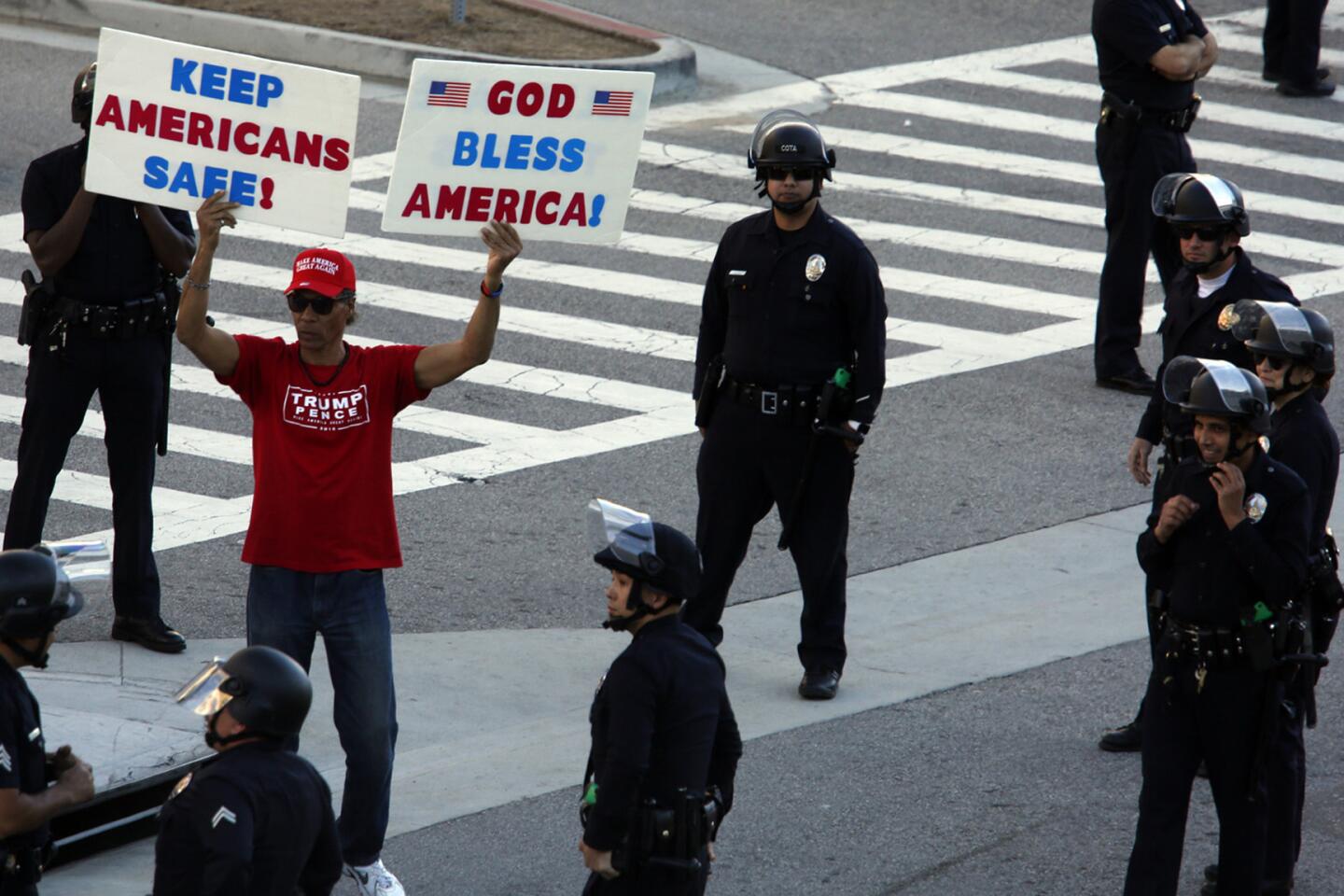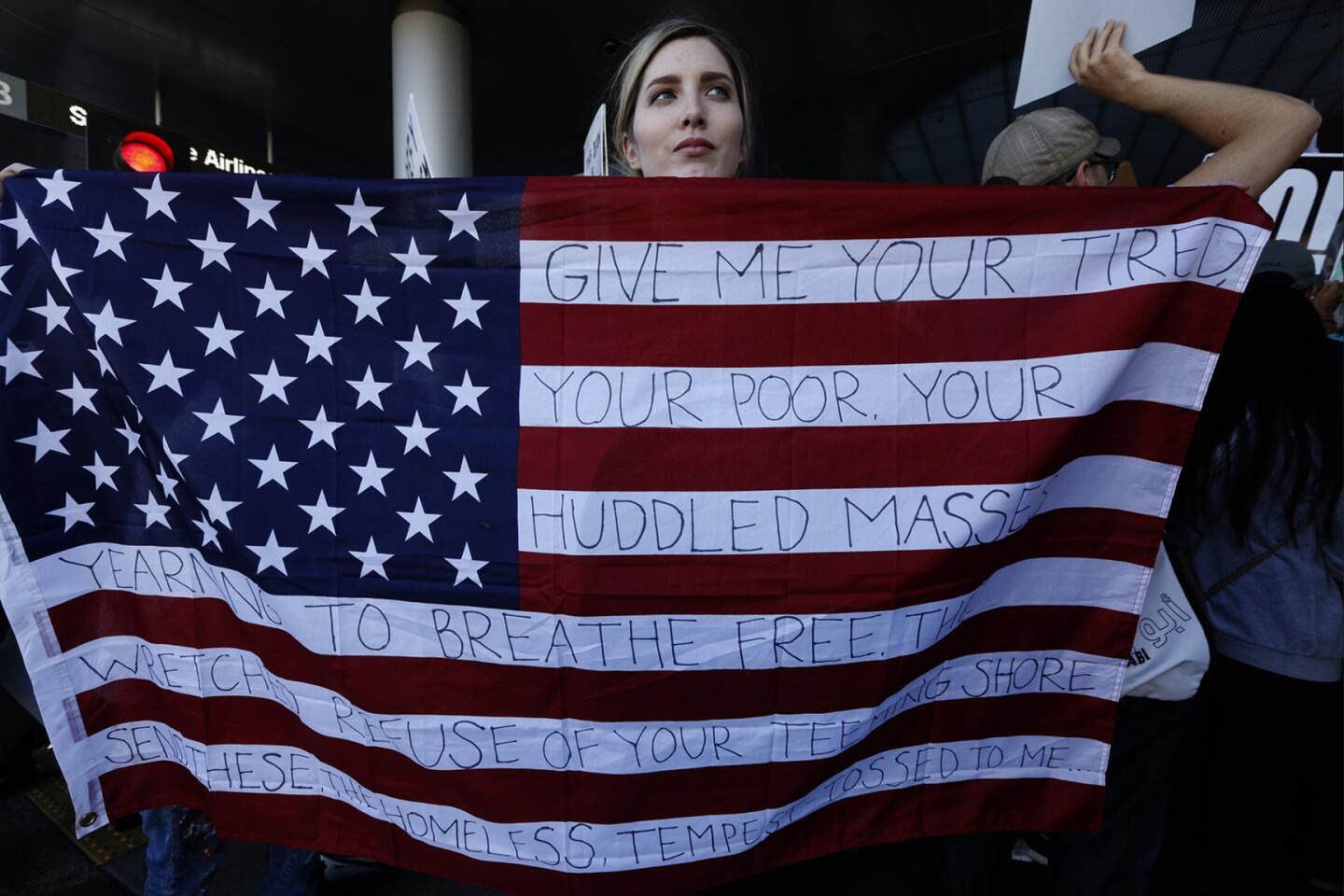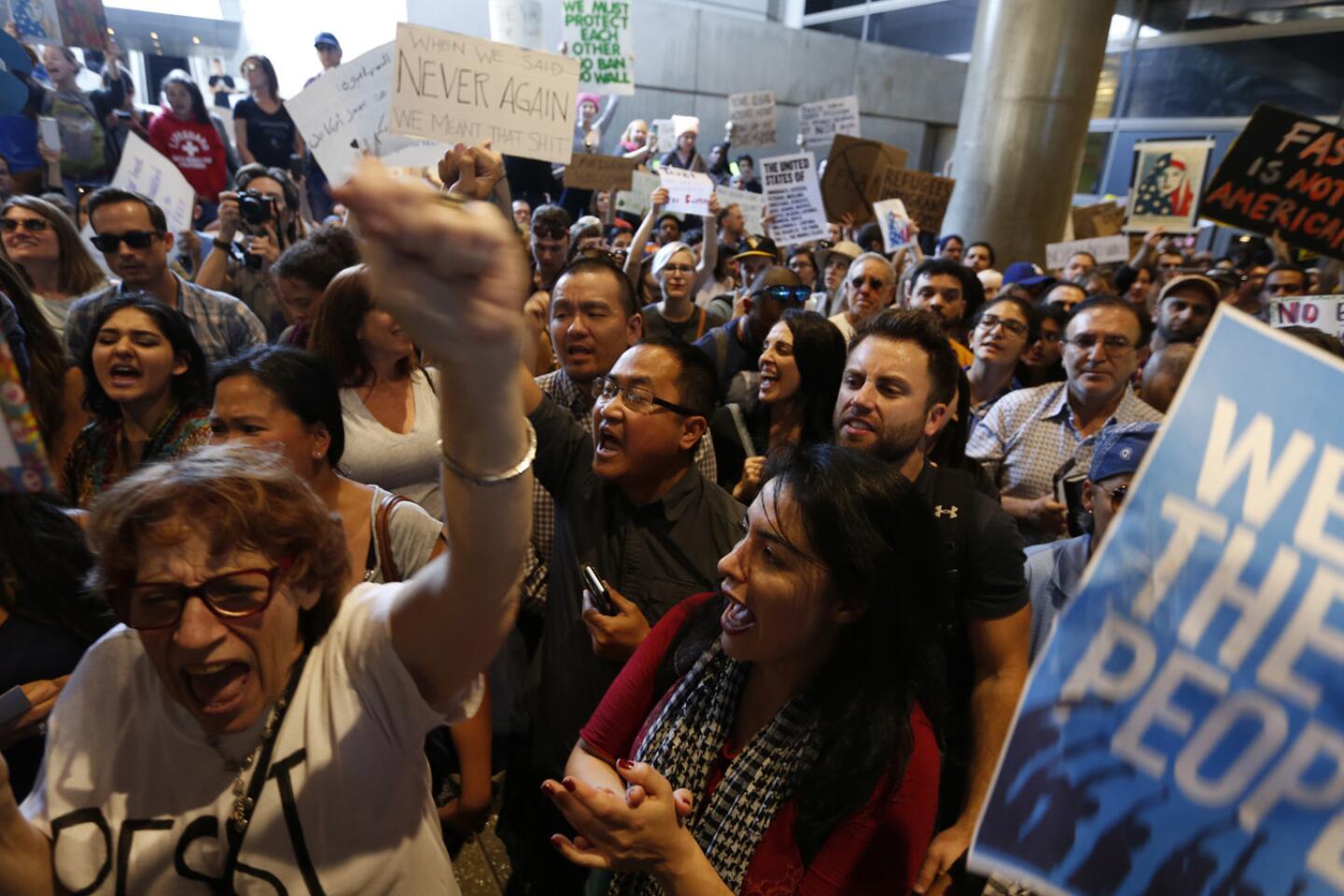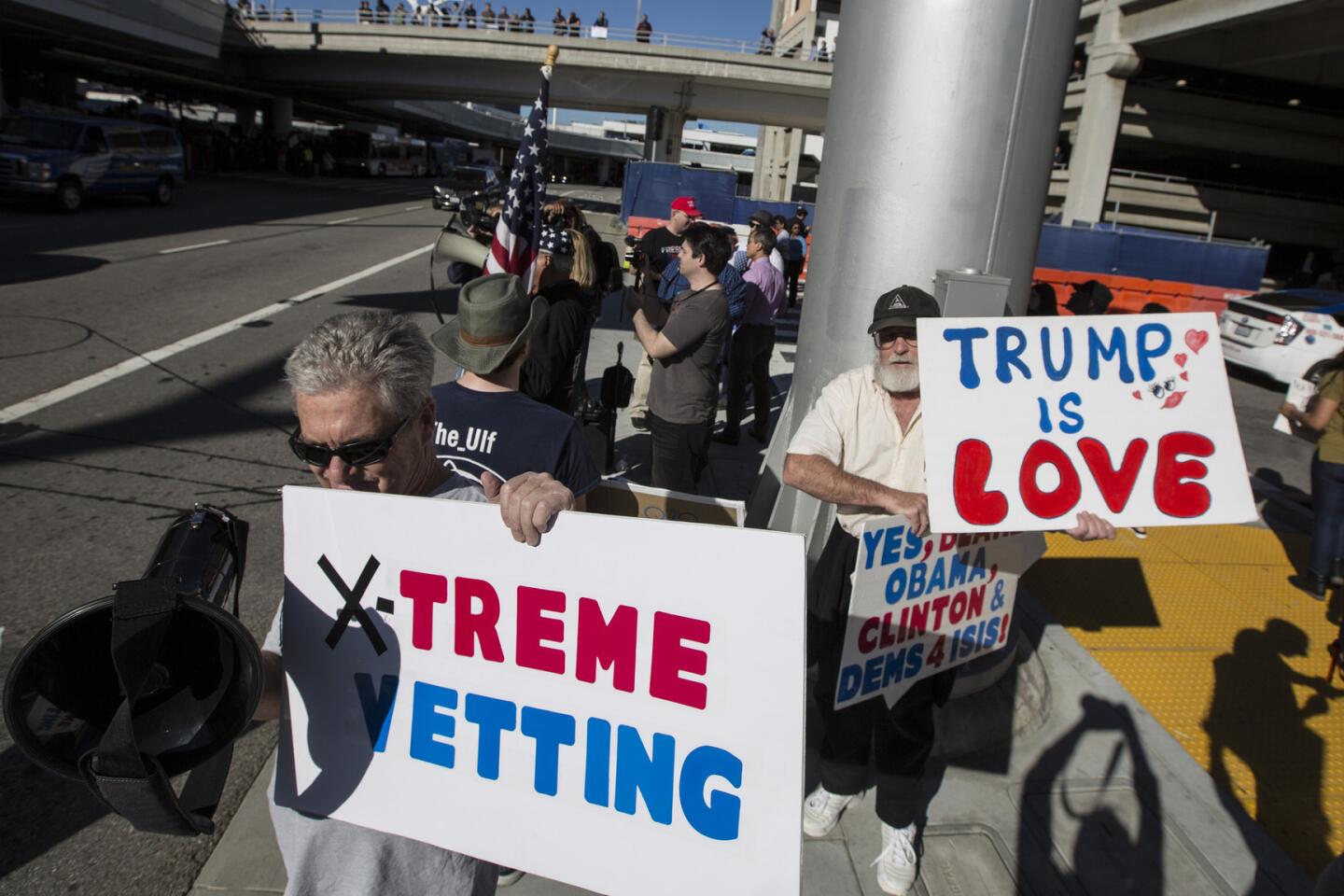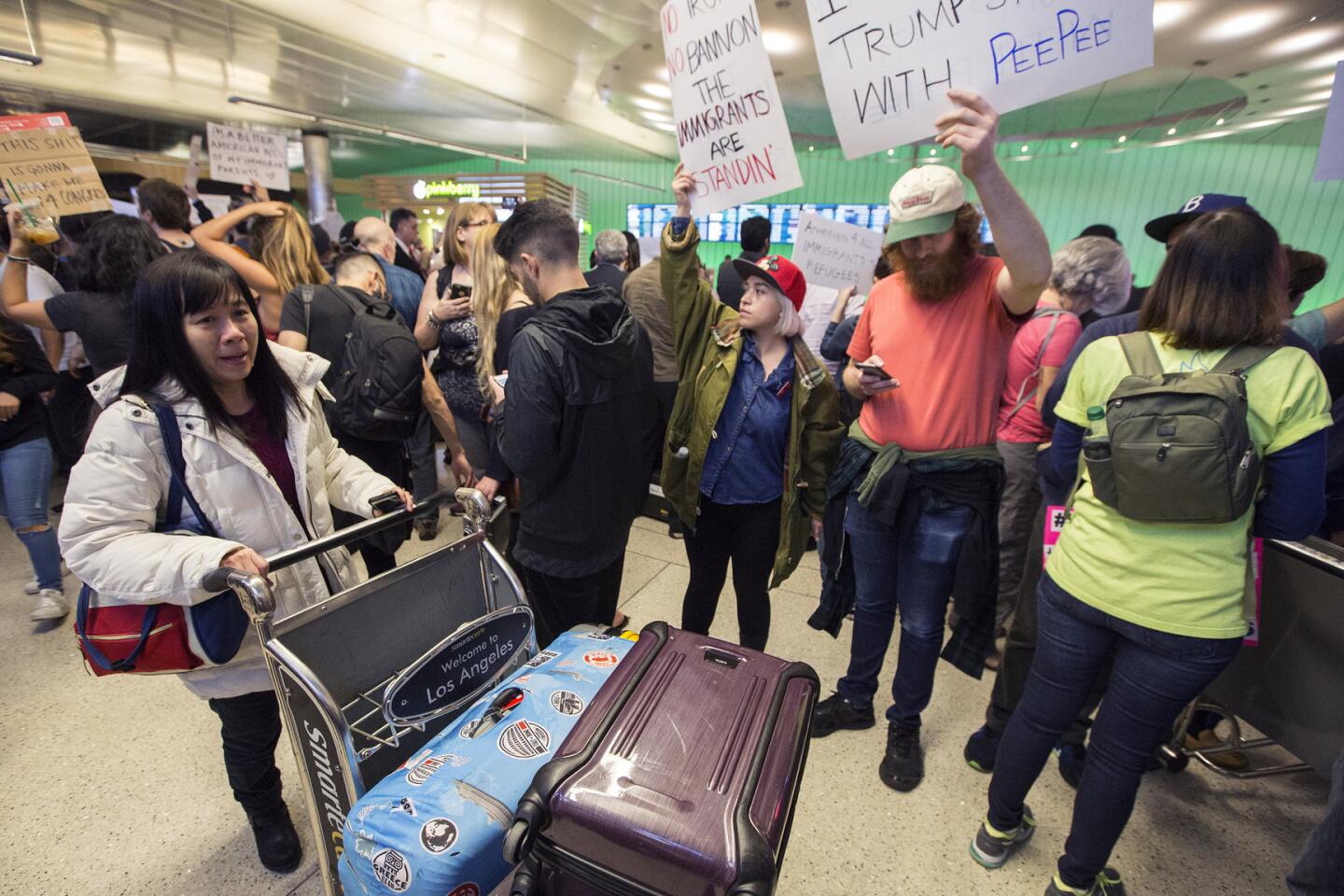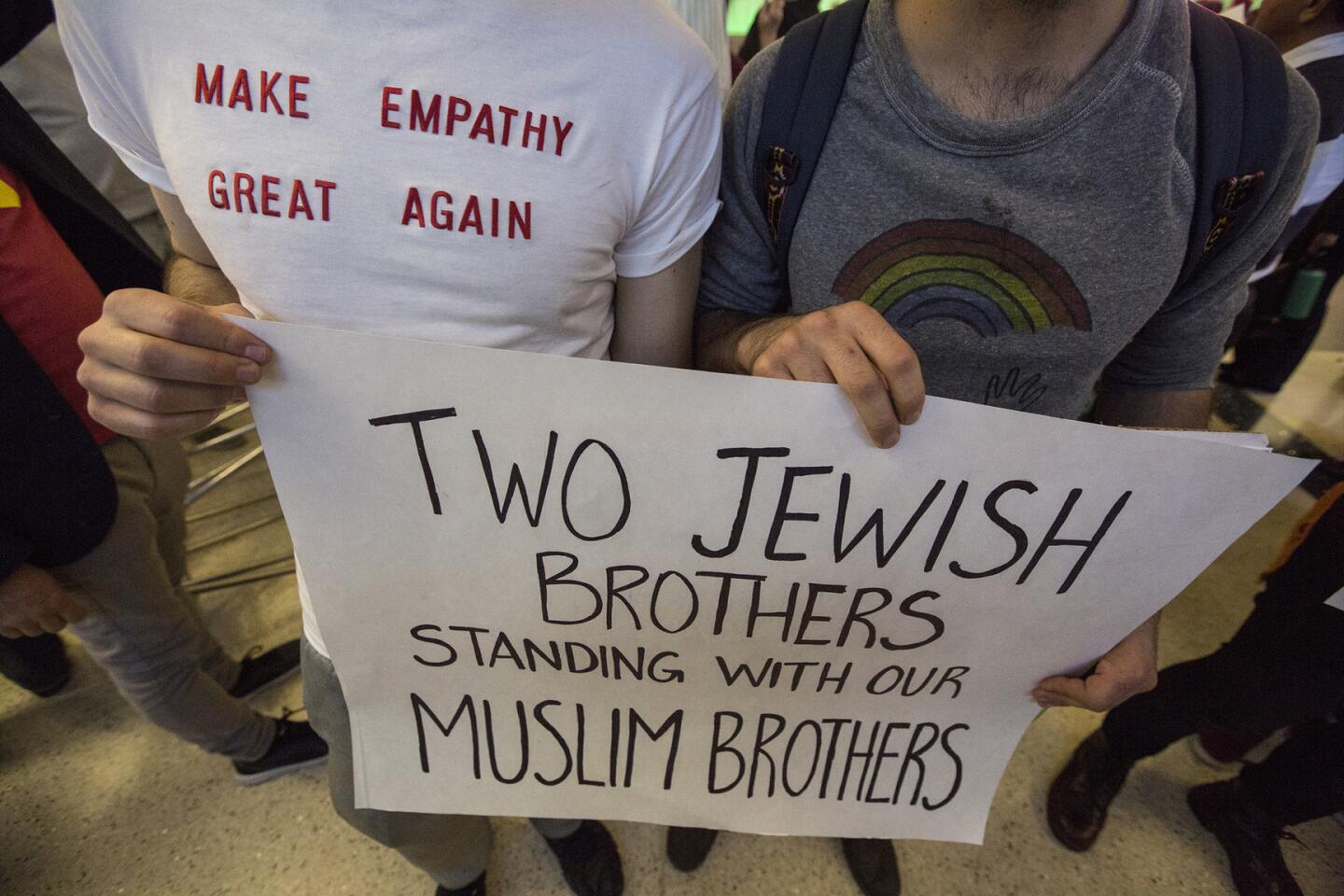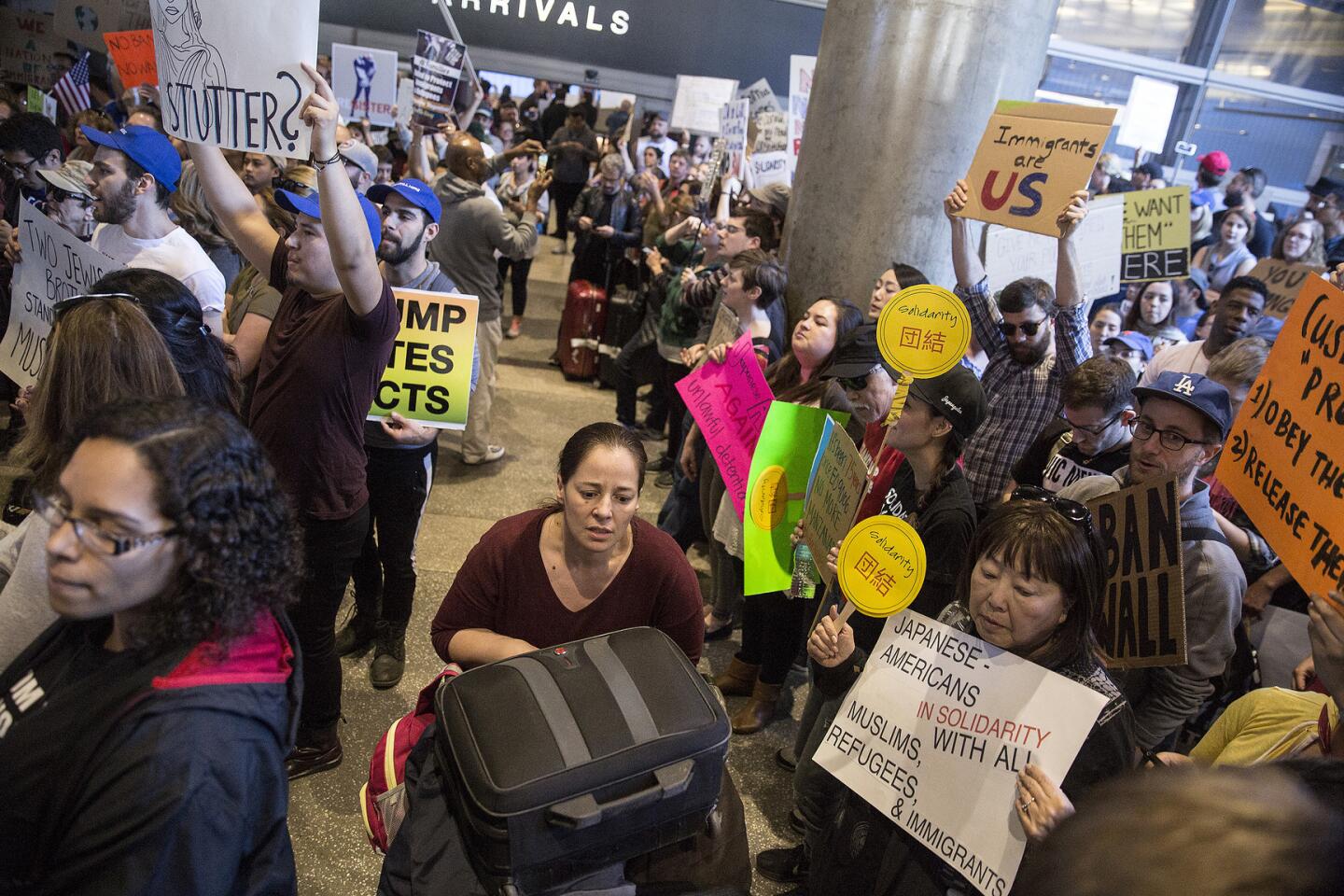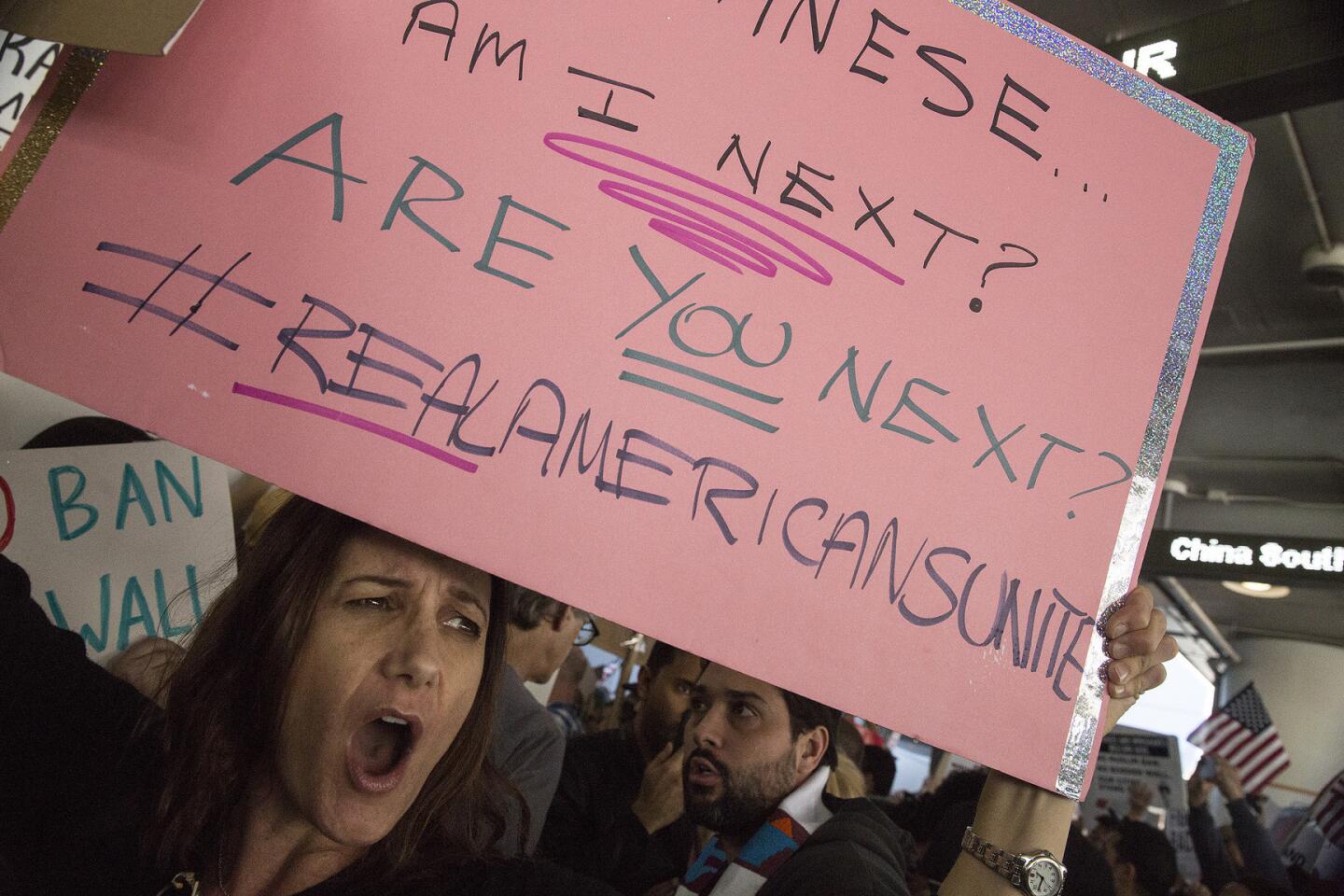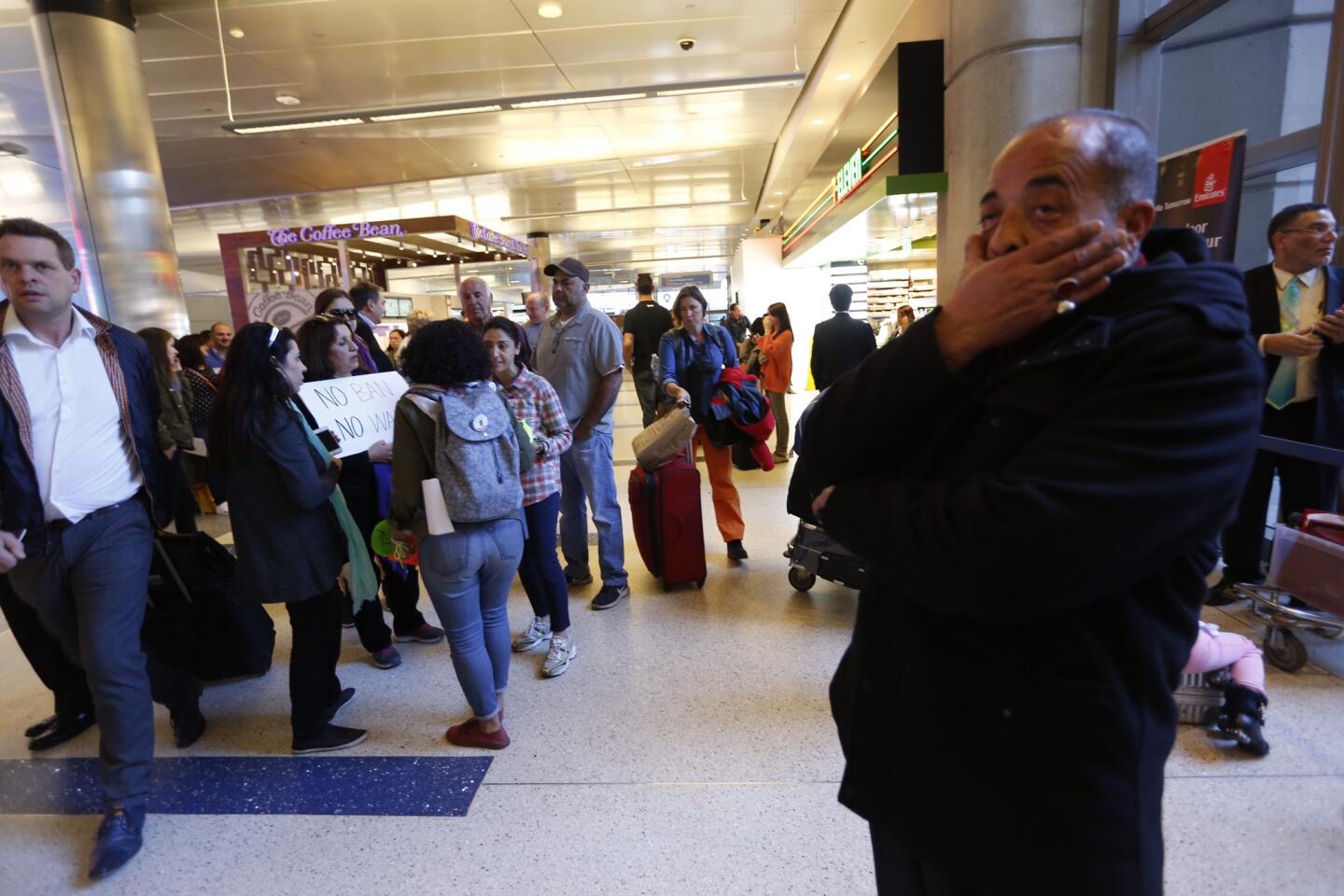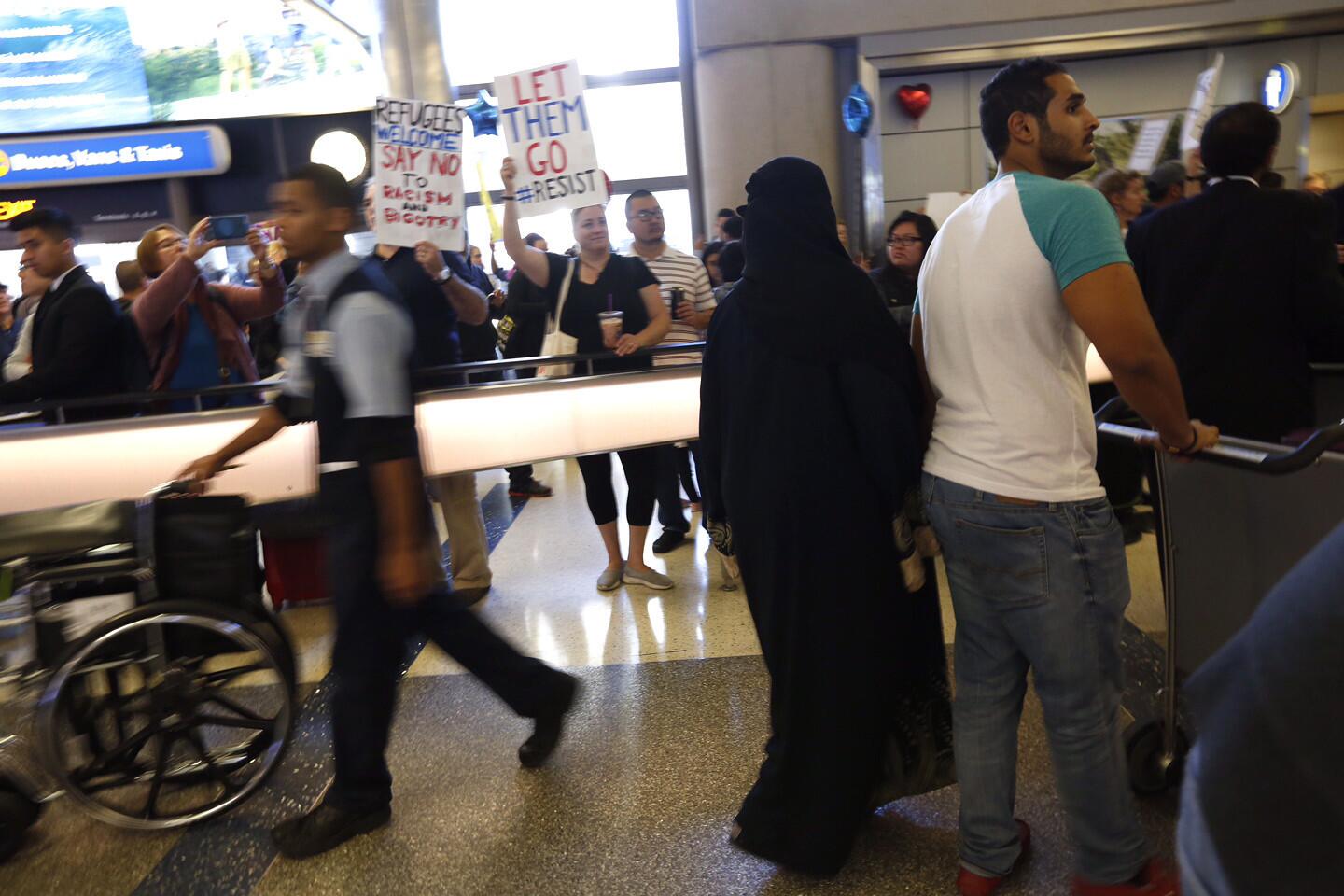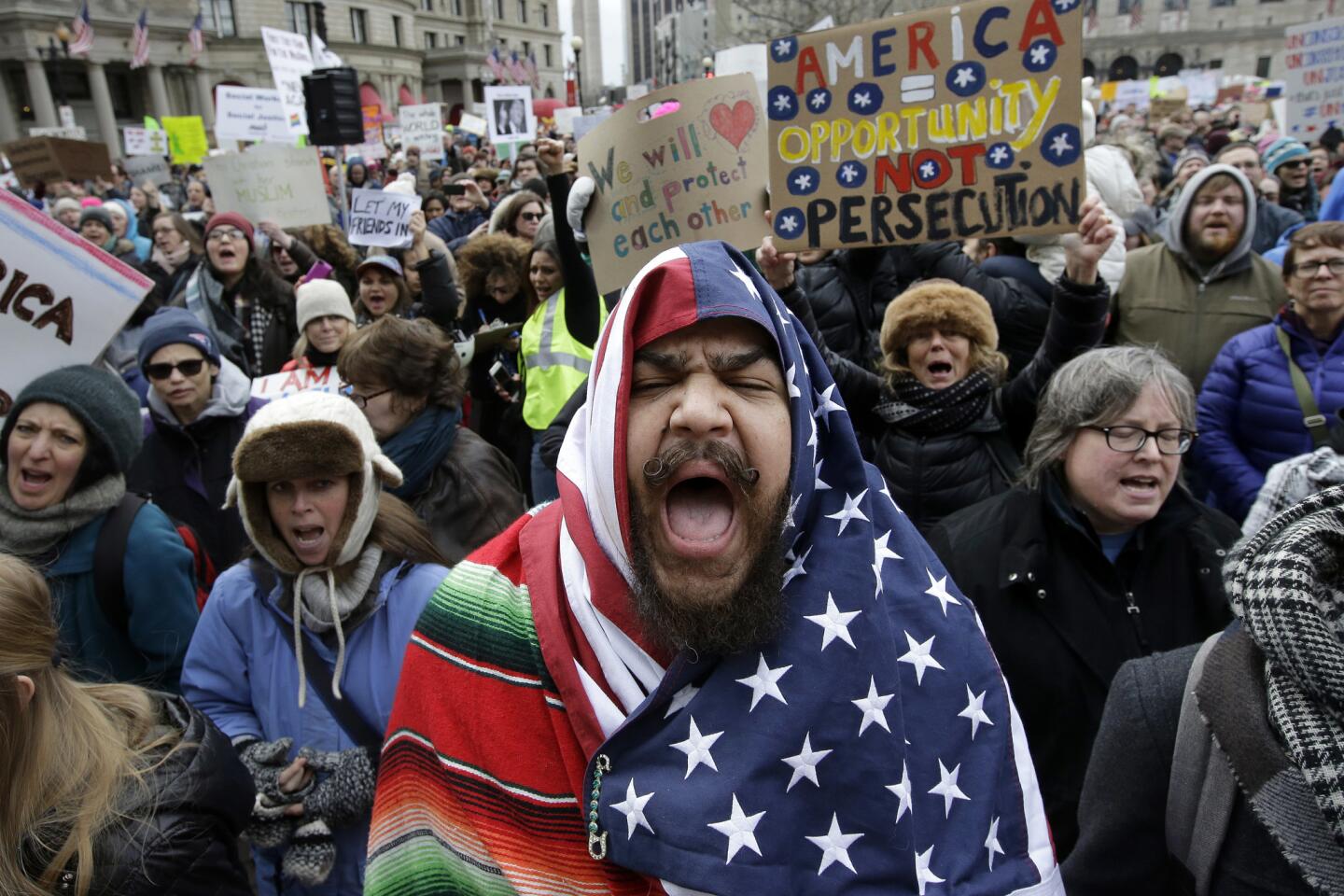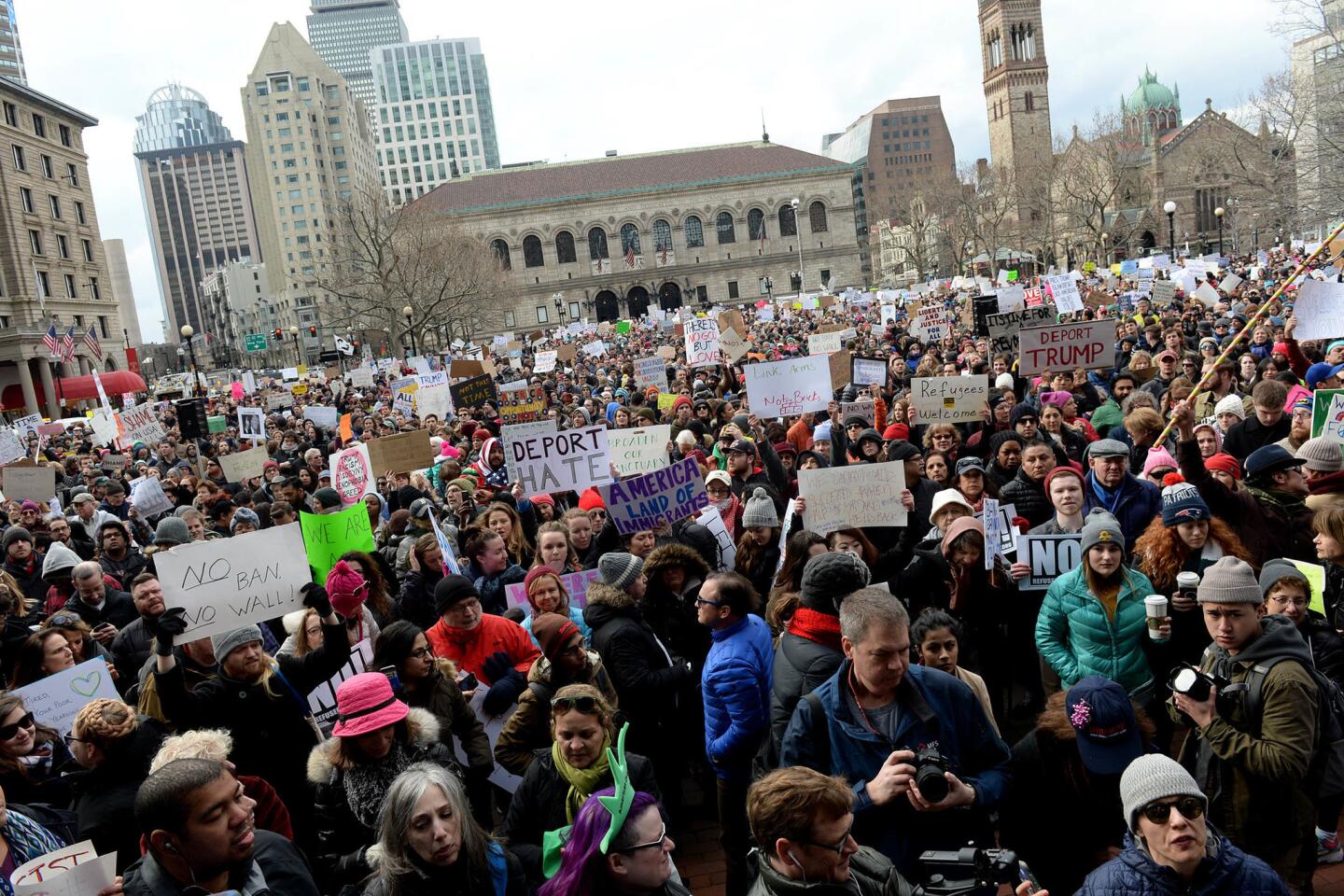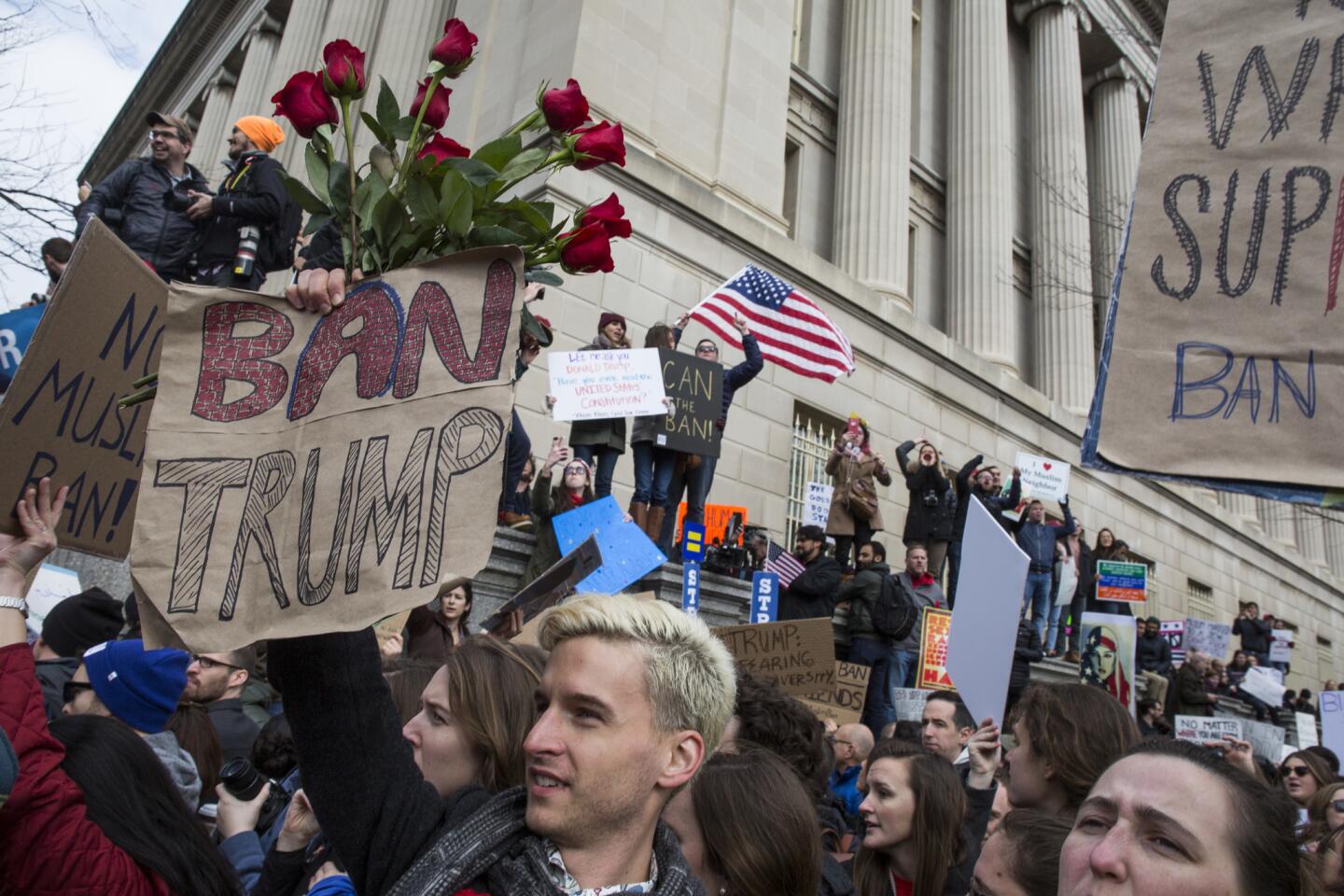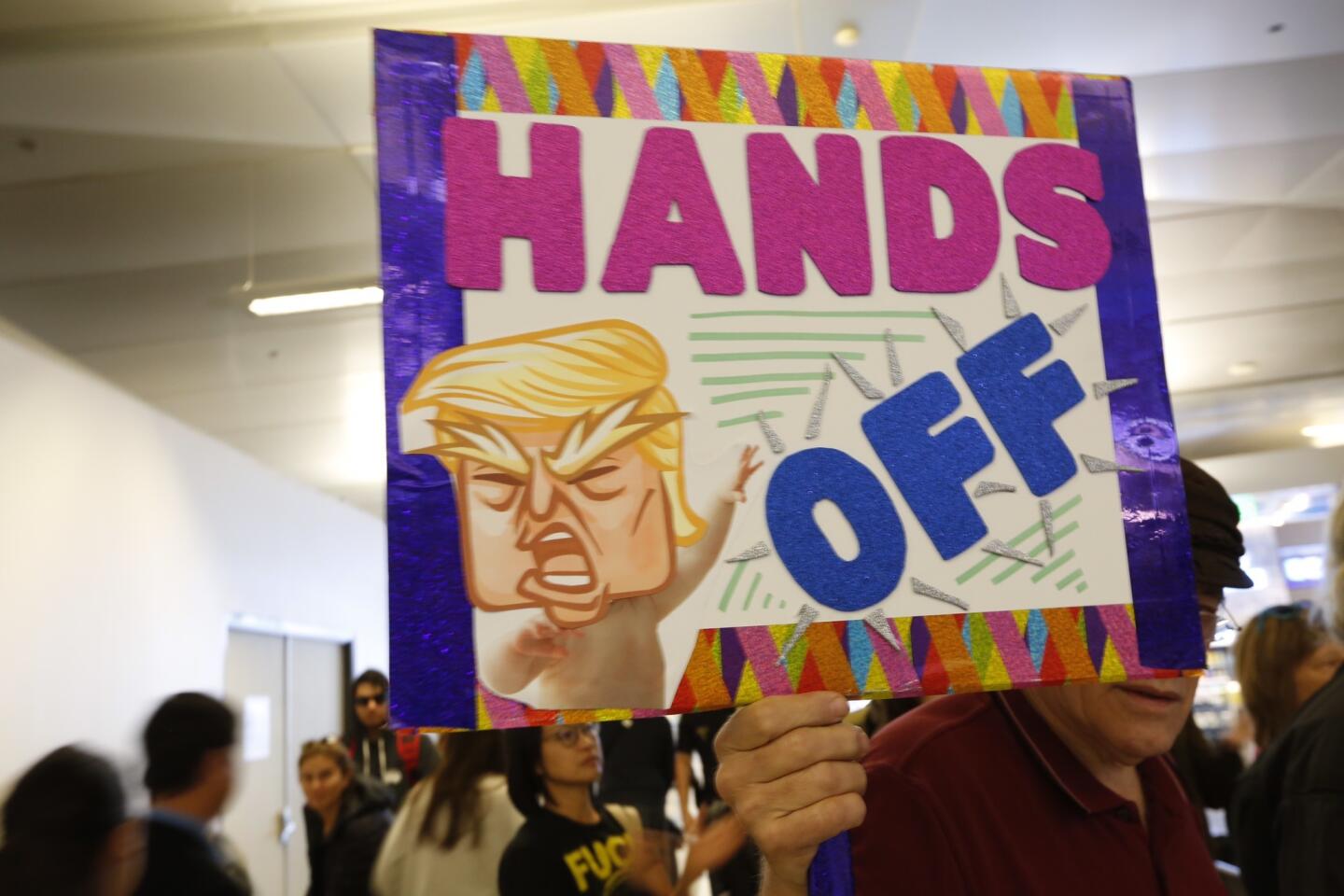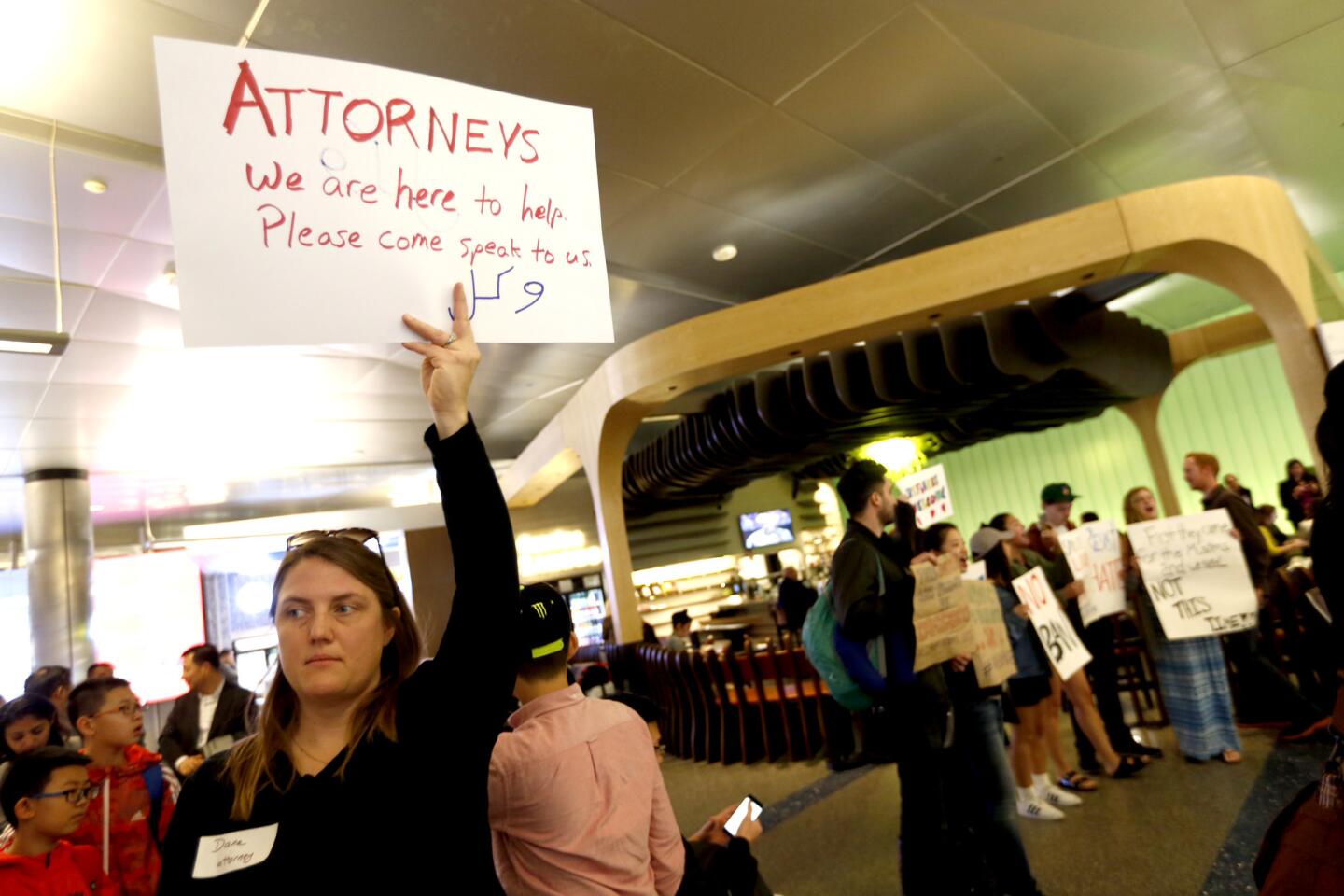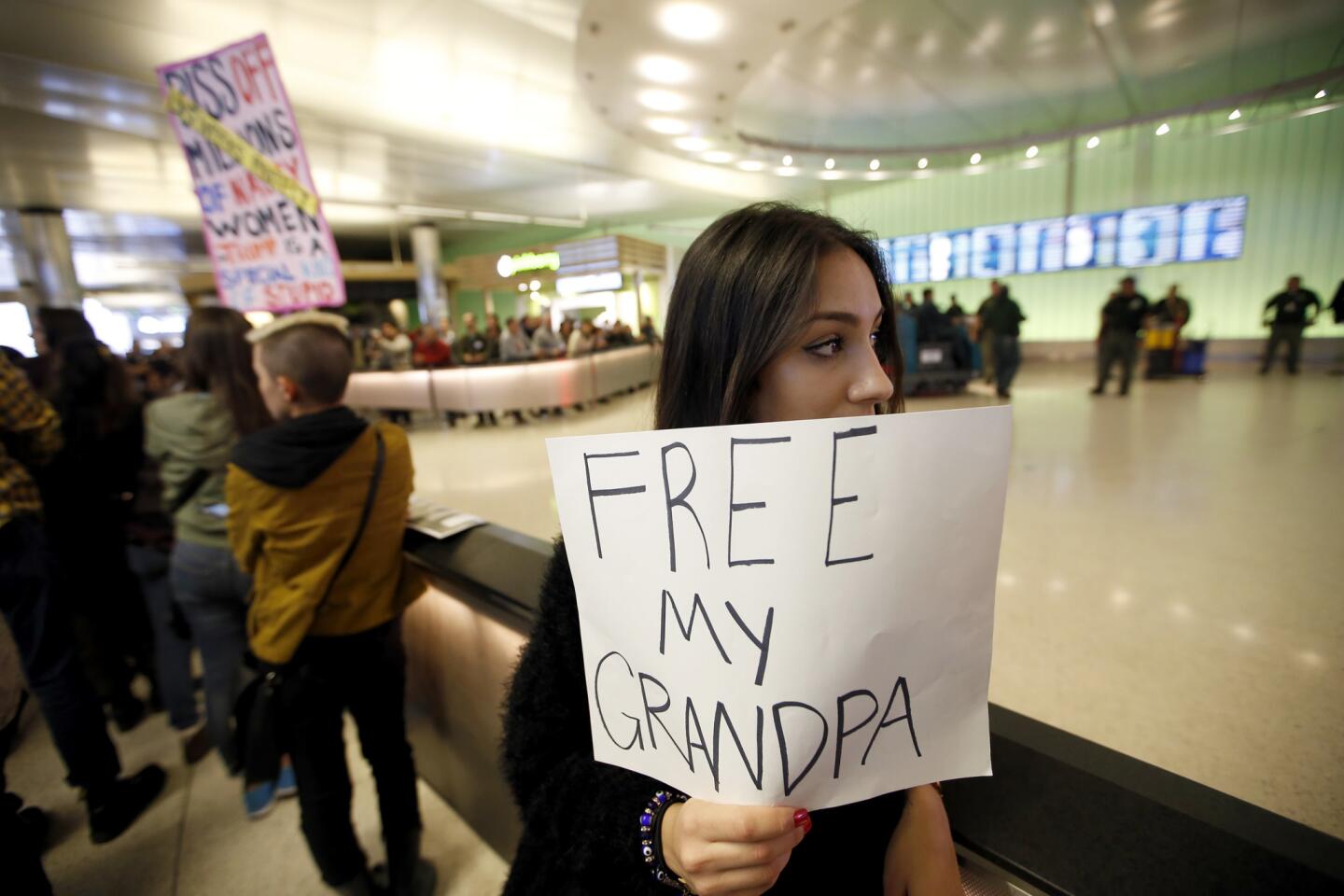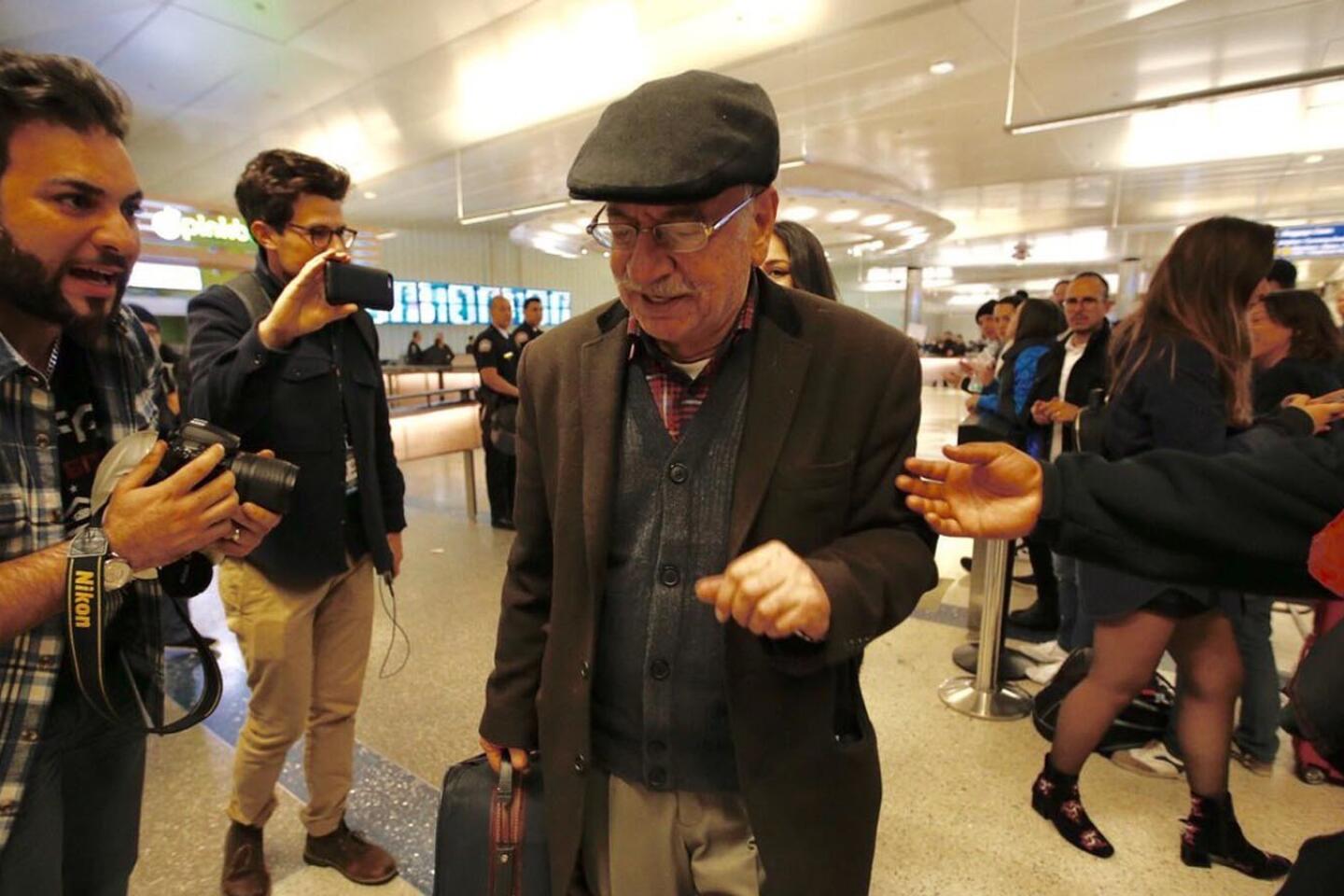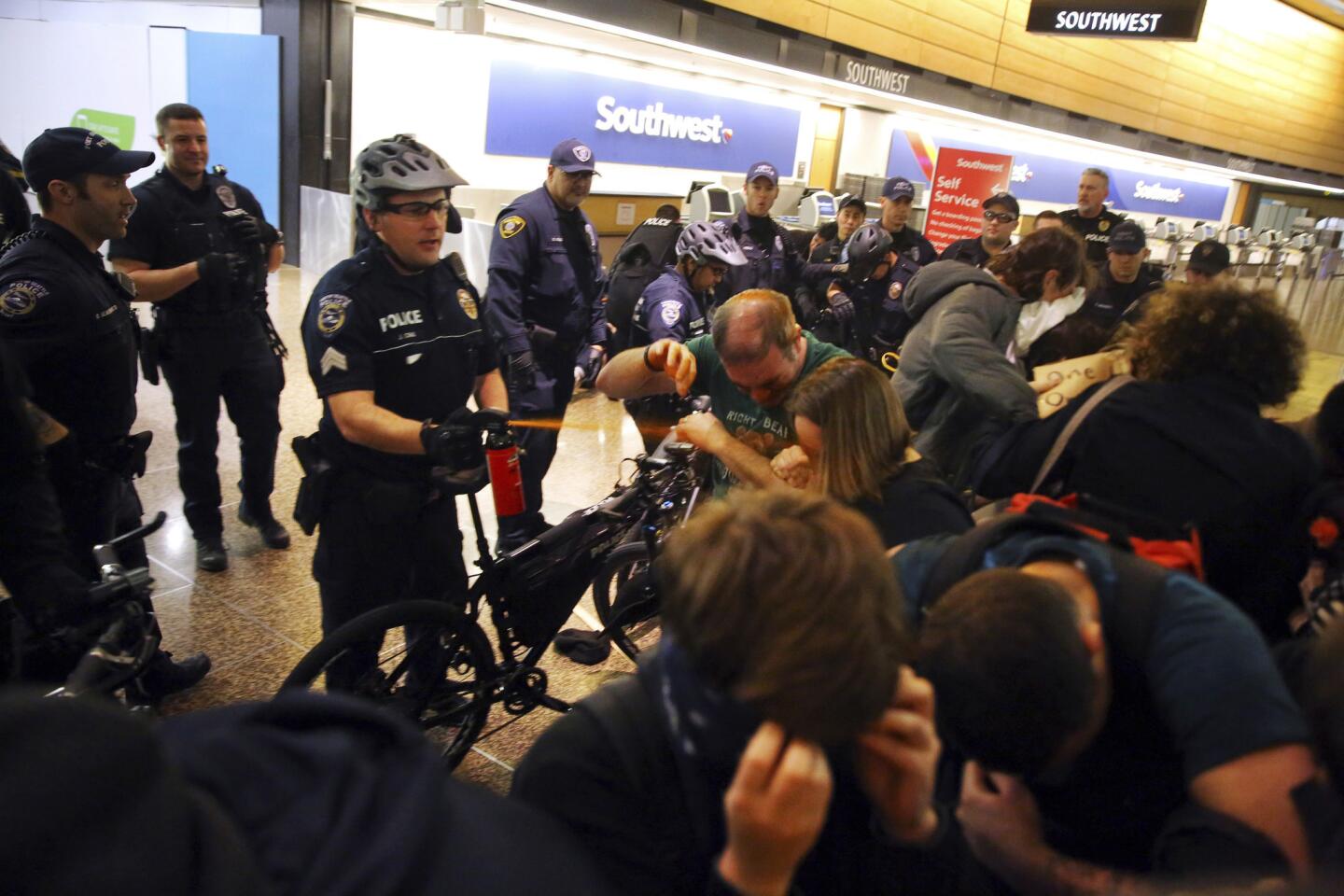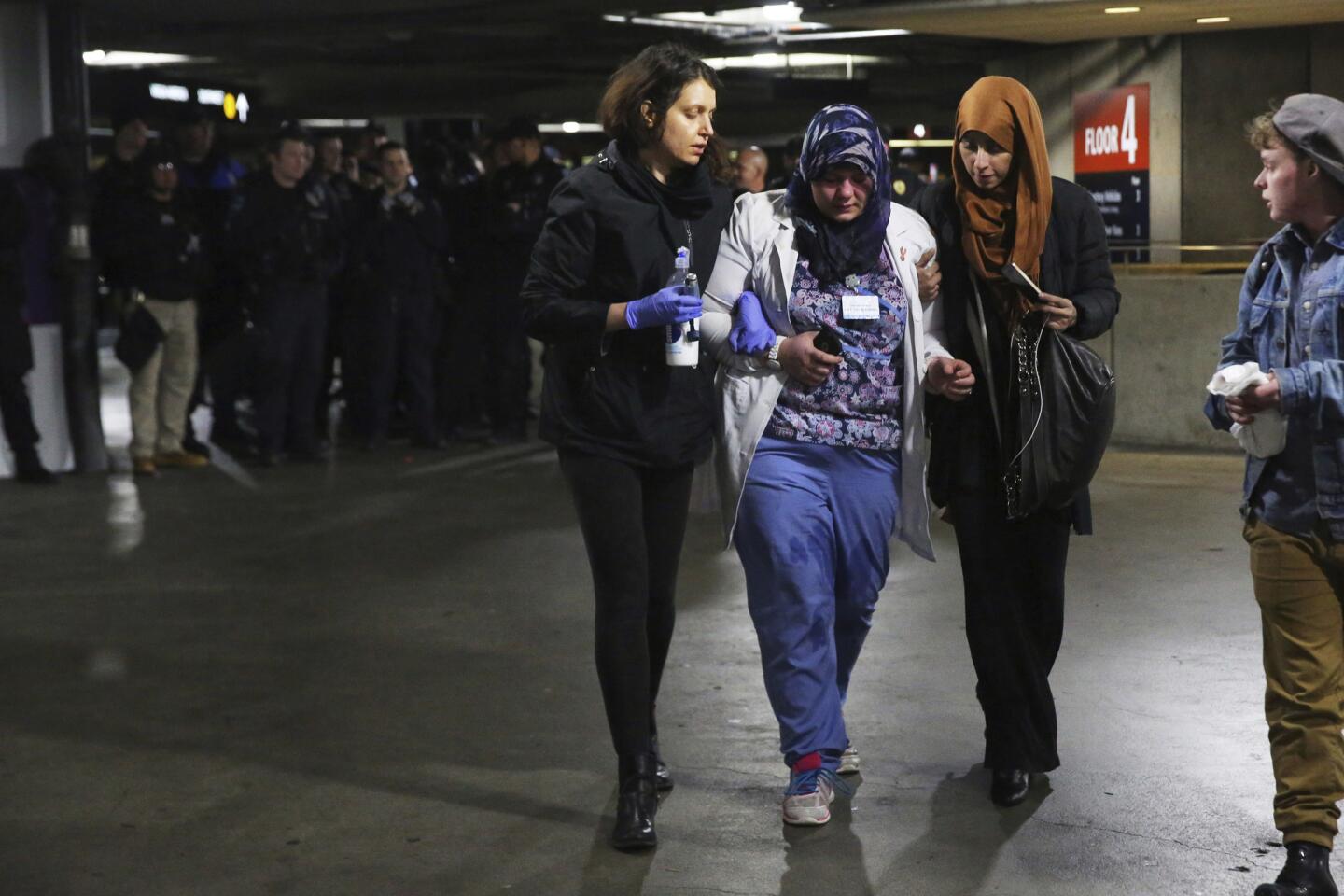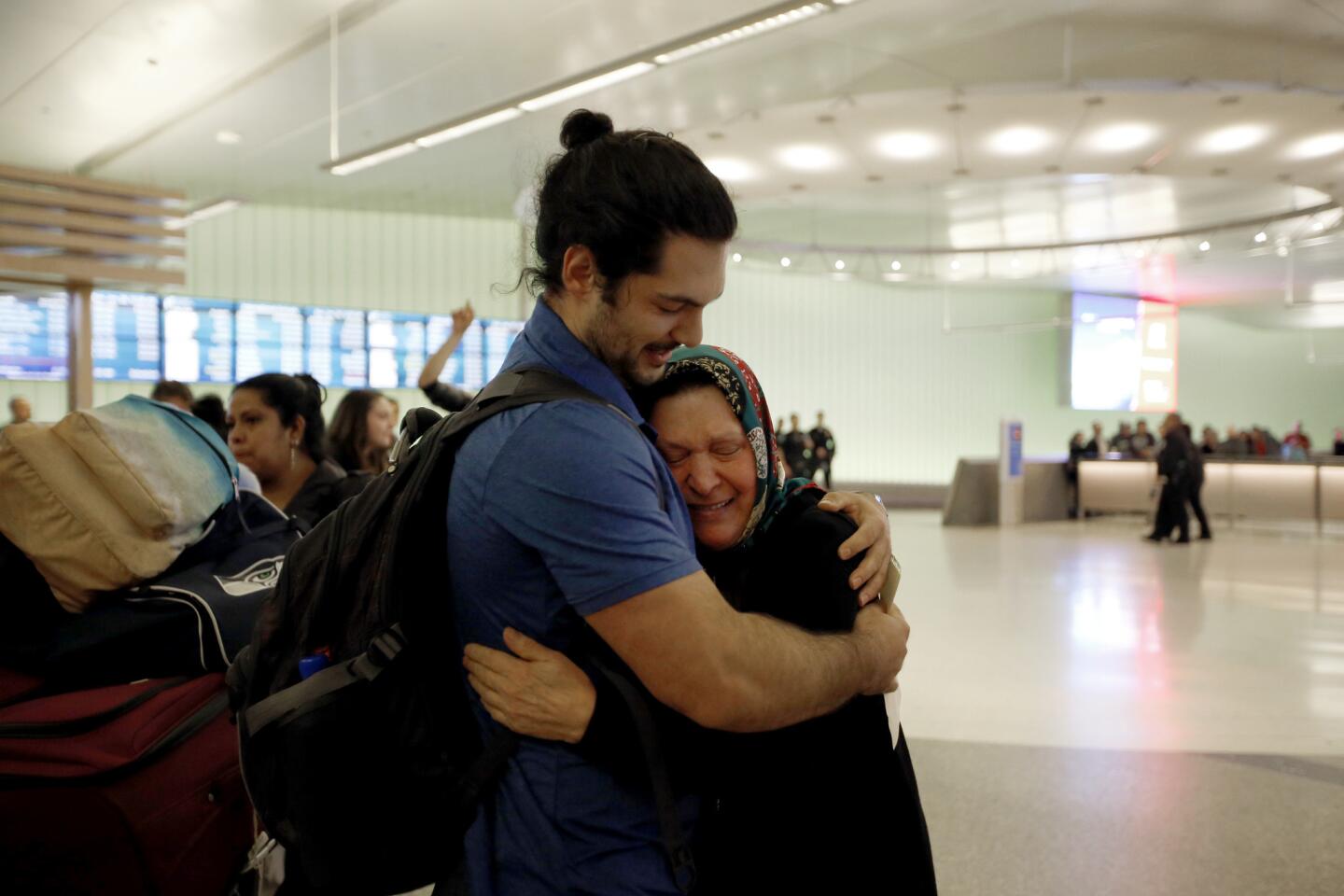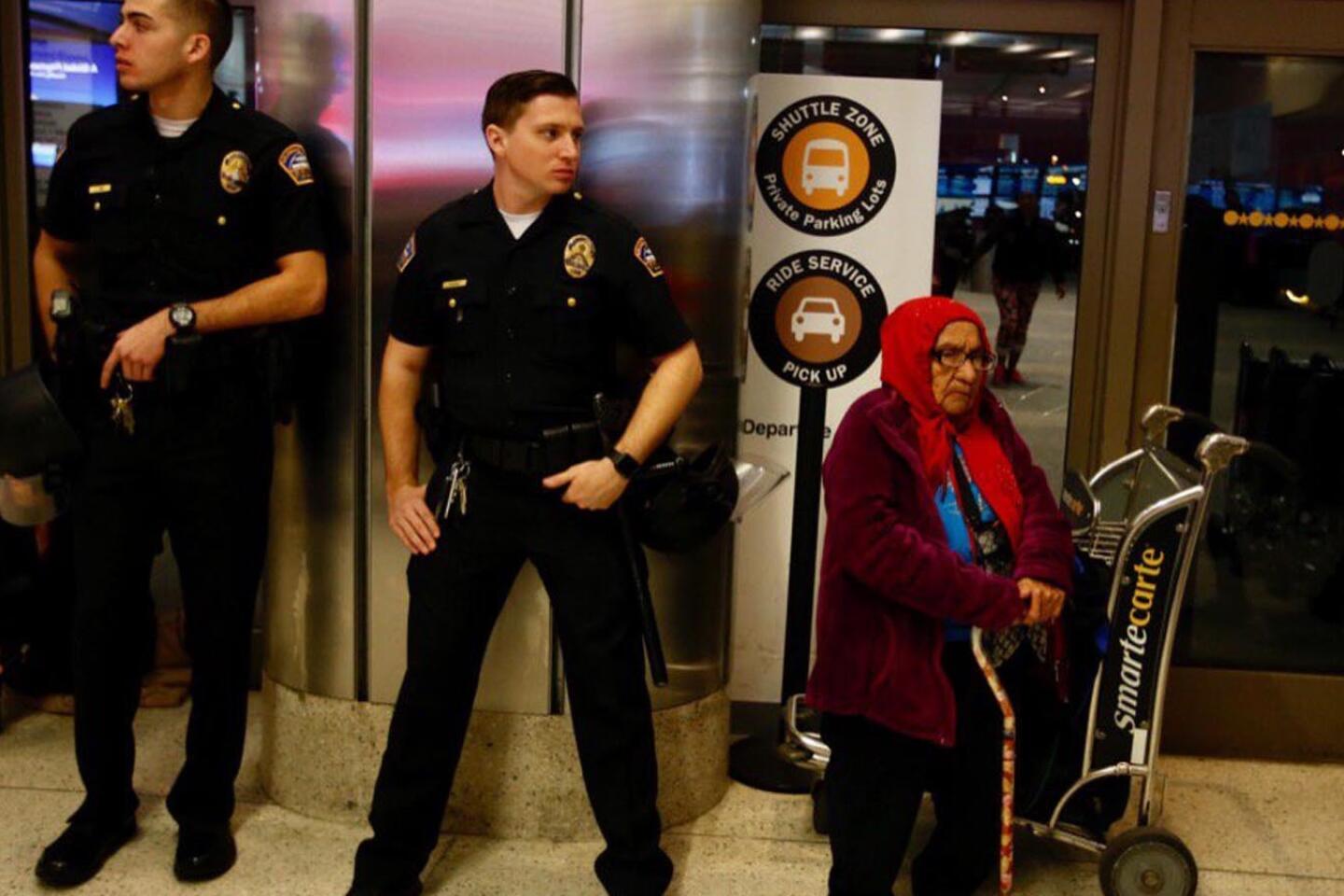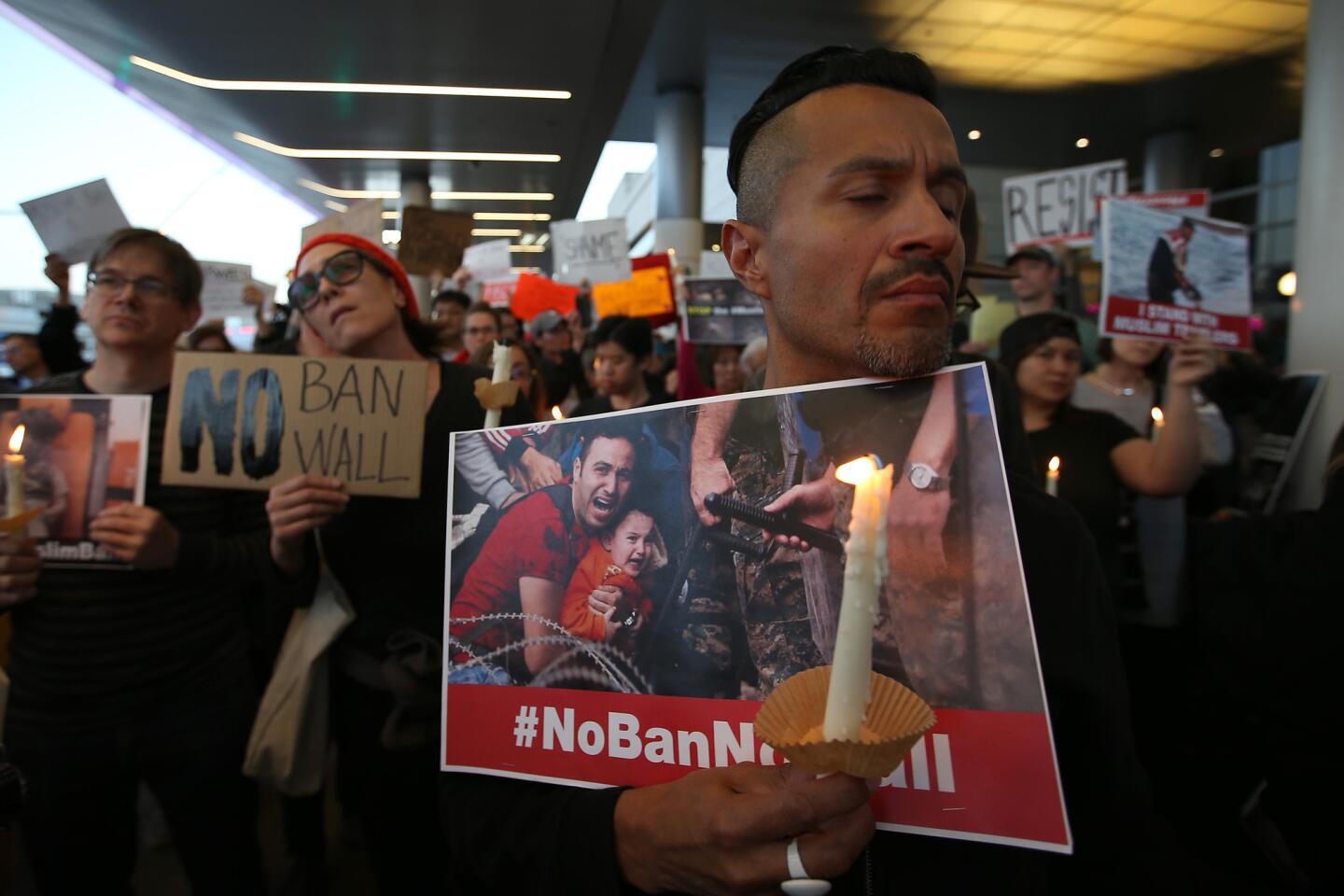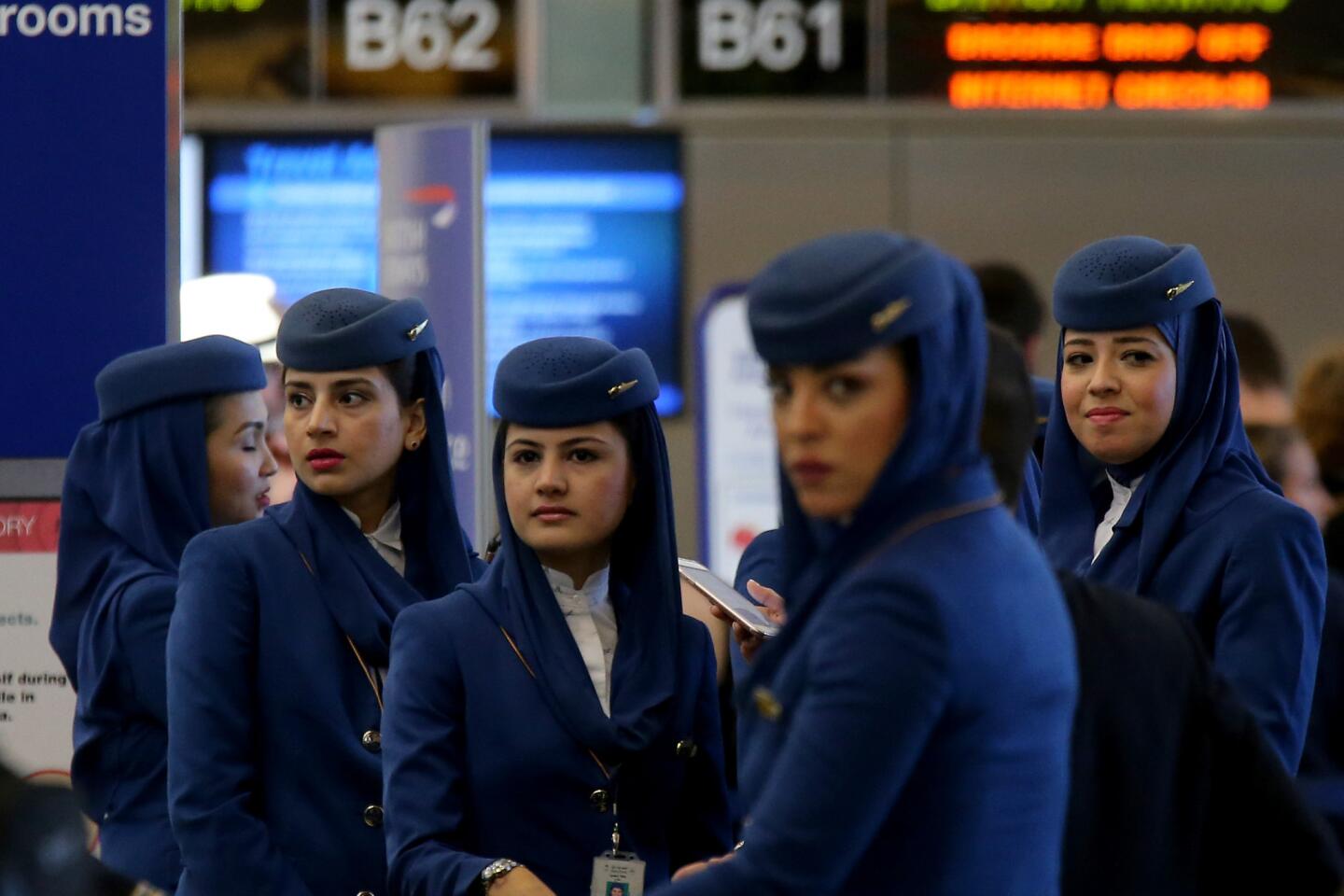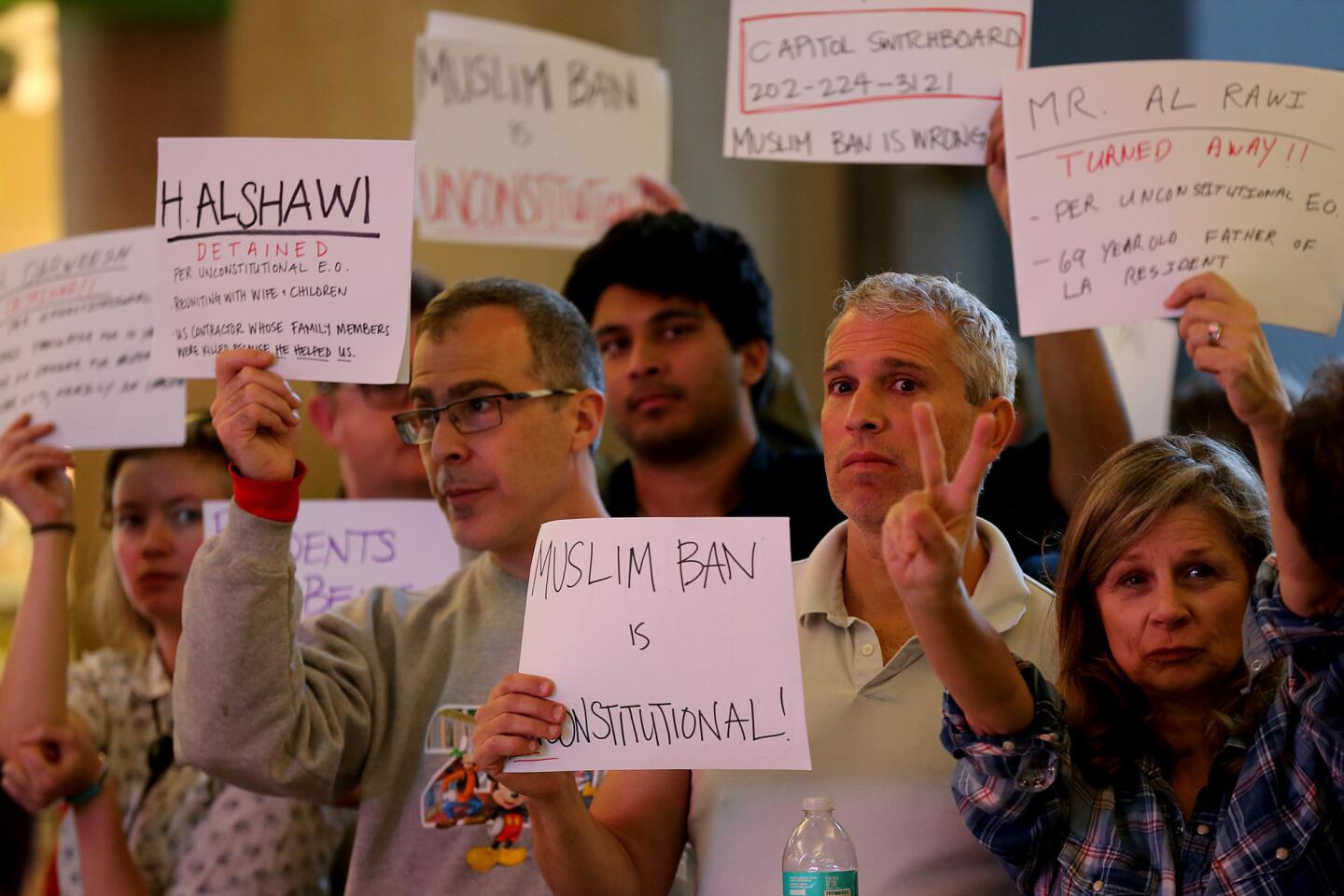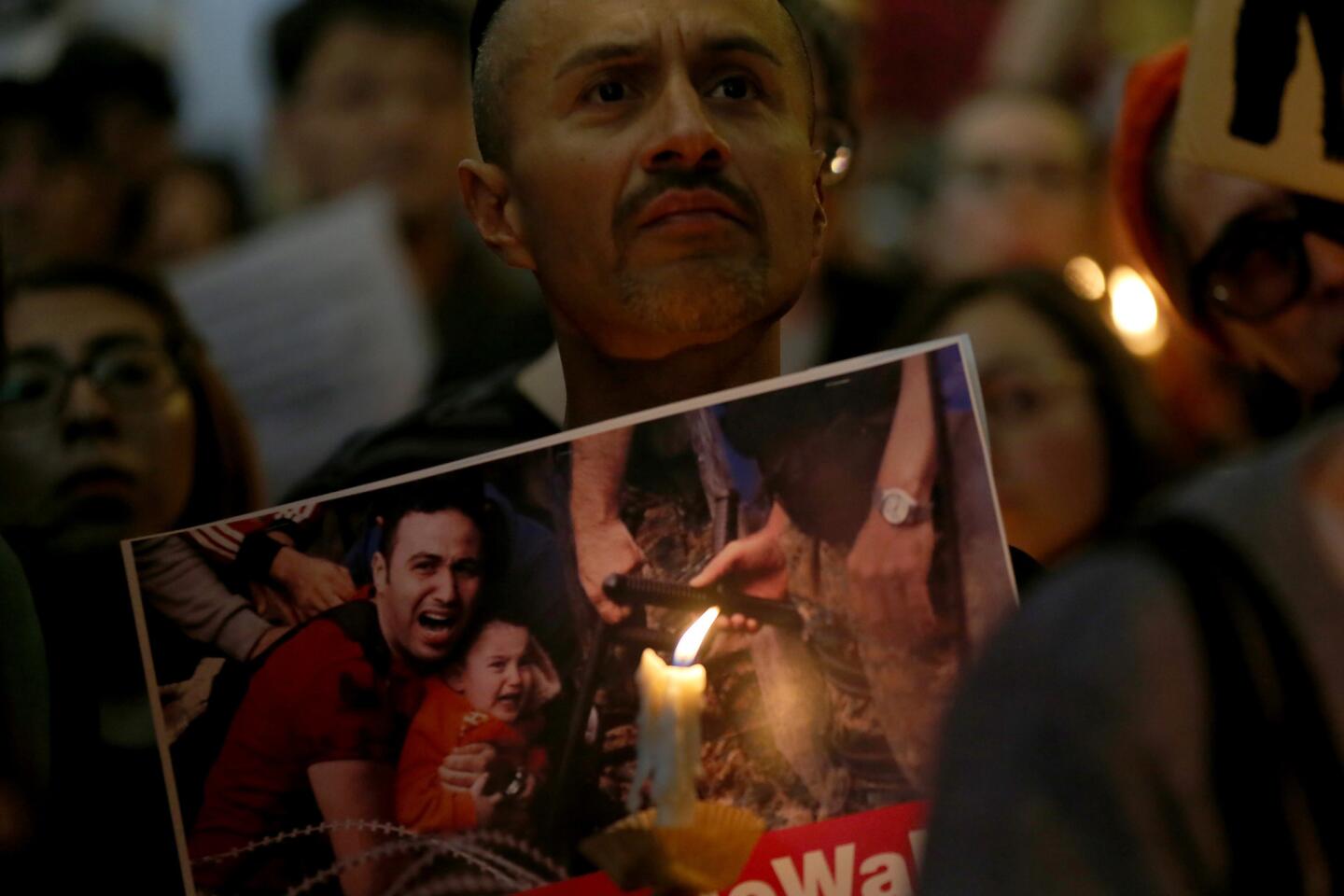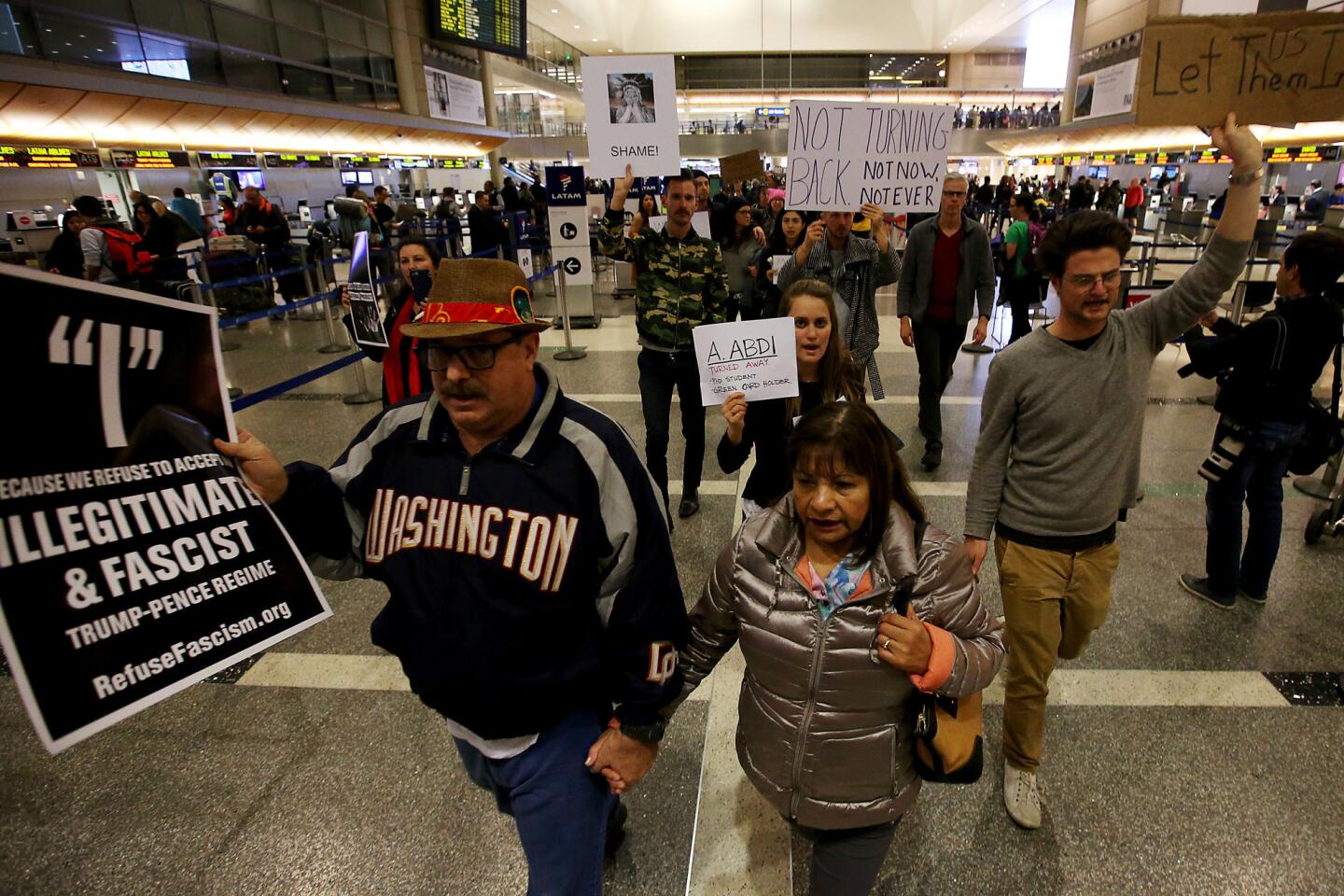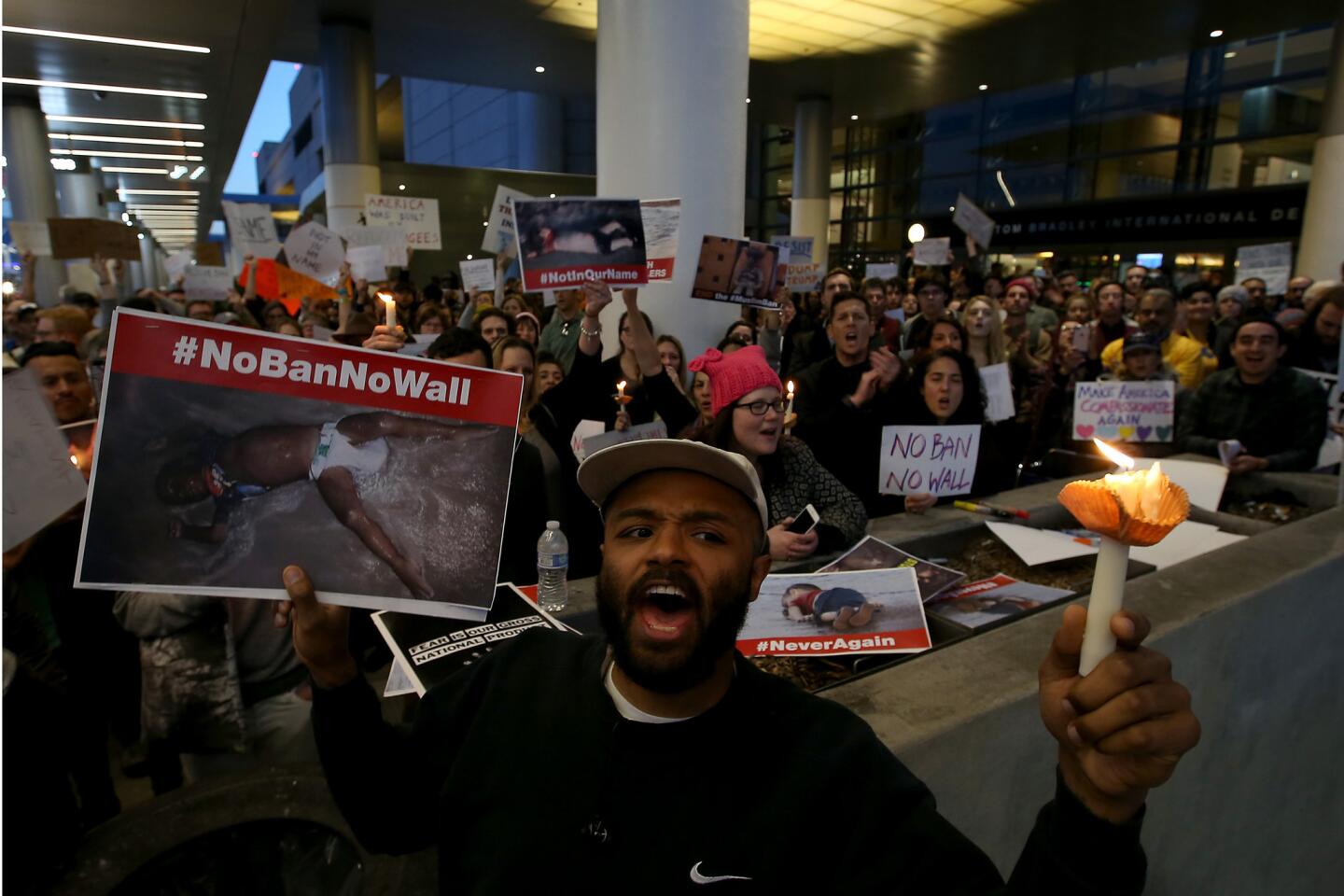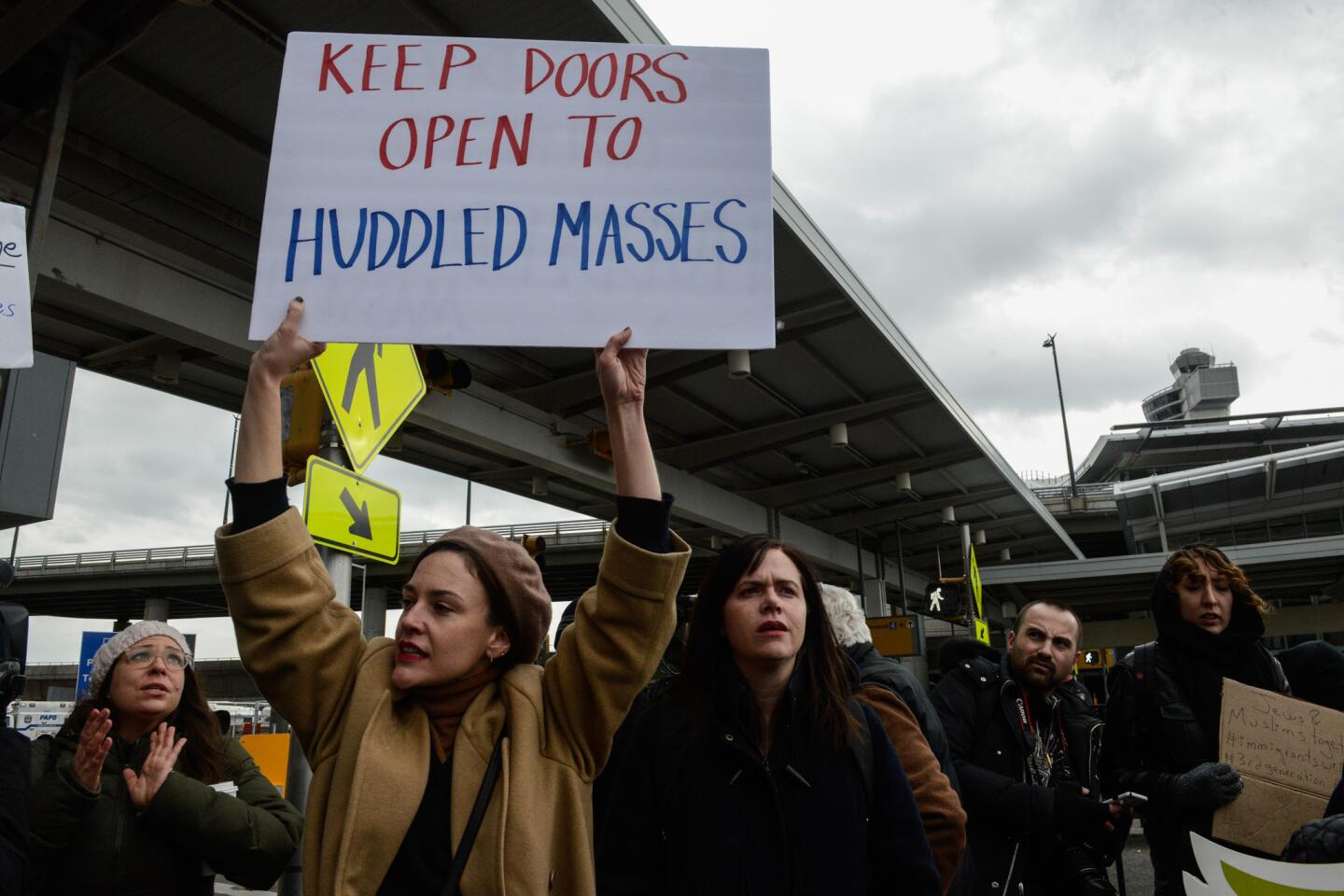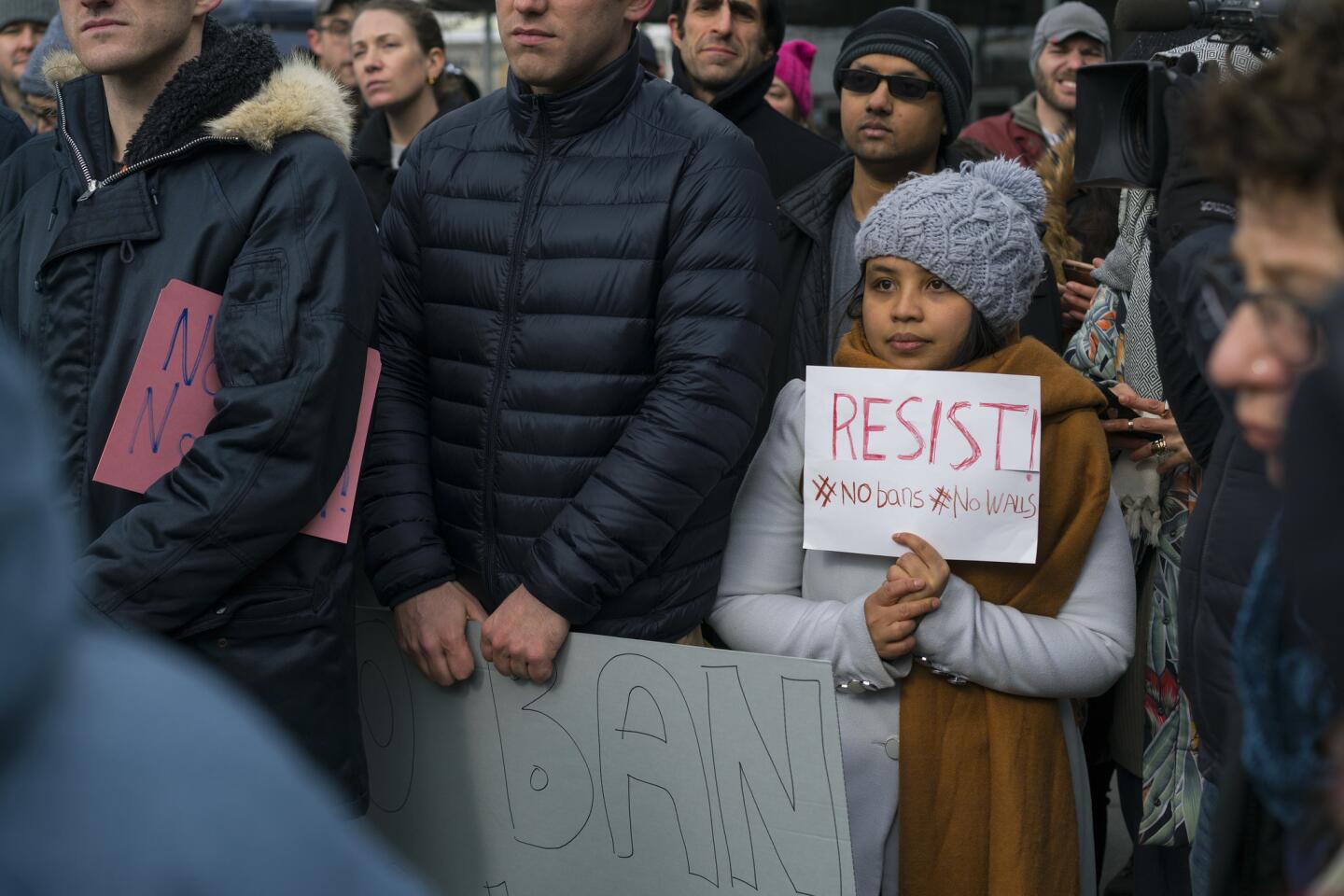Reporting from Washington — As havoc unfolded over the weekend following President Trump’s temporary ban on refugees coming into the country, some longtime Washington hands were alarmed by something else: the revamping of the National Security Council, the group of Cabinet-level officials and others who deliberate on the country’s most pressing — and often secret — national security issues.
Trump named one of his senior political counselors, Stephen K. Bannon, to a seat on the council’s principals committee. The president also limited the attendance of the chairman of the Joint Chiefs of Staff and the director of national intelligence to an as-needed basis at the panel’s meetings.
“Stone-cold crazy,” tweeted Susan Rice, former President Obama’s national security advisor, sarcastically asking, “Who needs military advice or intell to make policy on ISIL, Syria, Afghanistan, DPRK?” using acronyms for Islamic State and North Korea.
Another top Trump aide, Stephen Miller, effectively ran the National Security Council principals meeting Saturday, according to two Trump administration officials, a highly unusual move. Miller was a major architect of the refugee and visa ban.
The guiding hands of Bannon and Miller — “my two Steves,” as Trump has affectionately called them — who are only occasionally heard from publicly but almost constantly seen alongside Trump, were evident in much of the developments at the White House in Trump’s first week.
Bannon, the former head of the far-right website Breitbart News, once said his goal was to “bring everything crashing down, and destroy all of today’s establishment.” Trump made clear through a series of acts in his first week that he intends to upend government policy, not only on reassessing the refugee program but directives to build a wall along the border with Mexico and changes on environmental, healthcare and other issues.
Miller, who developed detailed knowledge of the nation’s immigration laws while working on the staff of Sen. Jeff Sessions (R-Ala.), Trump’s nominee to be attorney general, spent much of Saturday making policy decisions based on a strict interpretation of the immigration order and instructing senior Homeland Security officials on how to implement the plan.
Trump’s orders for stopping travelers from seven countries, blocking Syrian refugees and banning all refugee admissions for 120 days were pushed through at breakneck pace instead of what is usually a careful process of review by the departments of Justice and Homeland Security and the intelligence agencies for major changes to immigration policy. Instead, Homeland Security officials were given little time to review the order before it was made public.
On one of the order’s most controversial and confusing parts, the status of permanent residents, Bannon and Miller at one point overruled an interpretation by Homeland Security officials in favor of a more limited policy that blocked green card holders until they apply for a waiver from the ban, the officials said.
1/62
Supporters of President Trump rally in favor of his immigration ban executive order Saturday at Tom Bradley International Terminal at LAX.
(Luis Sinco / Los Angeles Times) 2/62
Protesters rallying against the first travel ban signed by President Trump march around Los Angeles International Airport in February. (Luis Sinco / Los Angeles Times)
3/62
Trump supporters gather at Tom Bradley International Terminal at LAX.
(Luis Sinco / Los Angeles Times) 4/62
Muhaned El Hindi protests the immigration ban Saturday during a rally at Tom Bradley International Terminal at LAX.
(Luis Sinco / Los Angeles Times) 5/62
Mathew Woods, a supporter of President Trump, voices support for an immigration ban during a rally at Tom Bradley International Terminal at LAX.
(Luis Sinco / Los Angeles Times) 6/62
Passengers stand in the doorway of a baggage claim area to take pictures and video of marchers protesting the immigration ban of President Trump at LAX on Saturday.
(Luis Sinco / Los Angeles Times) 7/62
Supporters of President Trump’s travel ban stand across the street from the #NoBanNoWall protesters at LAX on Saturday.
(Marcus Yam / Los Angeles Times) 8/62
Cooper Chvotkin, 6, gets a turn to voice his opinion on the megaphone with other protesters at LAX on Saturday.
(Marcus Yam / Los Angeles Times) 9/62
Protesters march through the Tom Bradley International terminal at LAX on Saturday to protest President Trump’s travel ban.
(Marcus Yam / Los Angeles Times) 10/62
Abeer Abdelrahman, left, hugs her sister Areej Ali at the Tom Bradley International Terminal at LAX on Monday after Ali, who has a green card, was able to come through the arrivals area with the help of an attorney after being detained and questioned. (Al Seib / Los Angeles Times)
11/62
Noor Hindi, left, and Sham Najjar, right, join the protest at the Tom Bradley International Terminal at Los Angeles International Airport on Monday.
(Al Seib / Los Angeles Times) 12/62
Attorney’s crowd a small table at the Tom Bradley International Terminal at LAX on Monday to assist travelers who require help due to President Trump’s travel restrictions.
(Al Seib / Los Angeles Times) 13/62
Immigration Attorney Monica Glicken, left, listens to Mohamed, right, as she tries to find travelers to help at the Tom Bradley International Terminal at LAX on Monday to assist travelers who require help due to President Trump’s travel restrictions.
(Al Seib / Los Angeles Times) 14/62
Hundreds of people protested President Trump’s original travel ban at LAX in January. (Genaro Molina / Los Angeles Times)
15/62
Protesters block traffic at LAX, stranding motorists at the Tom Bradley International Terminal.
(Brian van der Brug / Los Angeles Times) 16/62
Demonstrators take a pizza break while blocking traffic on the upper level of the Tom Bradley International Terminal while police monitor the rally.
(Patrick T. Fallon / For The Times) 17/62
A pro-Trump supporter argues with protesters about the president’s travel ban at the Tom Bradley International Terminal at LAX.
(Patrick T. Fallon / For The Times) 18/62
Hundreds sit in on the arrival level of LAX’s Tom Bradley International Terminal, blocking traffic to protest President Trump’s immigration order.
(Brian van der Brug / Los Angeles Times) 19/62
Airport police plead with protesters to get off the pavement in order to let stranded motorists exit.
(Brian van der Brug / Los Angeles Times) 20/62
Protesters block traffic, stranding motorists at the Tom Bradley International Terminal of LAX.
(Brian van der Brug / Los Angeles Times) 21/62
Muslims pray as hundreds stand in support on the departure level of the Tom Bradley International Terminal during a protest against President Trump’s immigration order. (Brian van der Brug / Los Angeles Times)
22/62
Police position themselves as a man takes photos on the on the departure level of the Tom Bradley International Terminal during protests to President Donald Trump’s new immigration order.
(Brian van der Brug / Los Angeles Times) 23/62
Hundreds block traffic on the arrival level of the Tom Bradley International Terminal to protest President Trump’s immigration order.
(Brian van der Brug / Los Angeles Times) 24/62
People gather at the Tom Bradley International Terminal to protest against President Trump’s immigration order.
(Brian van der Brug / Los Angeles Times) 25/62
A police officer watches protesters at the lower deck of the Tom Bradley International Terminal at LAX.
(Genaro Molina / Los Angeles Times) 26/62
People gather at the Tom Bradley International Terminal to protest President Trump’s immigration order.
(Brian van der Brug / Los Angeles Times) 27/62
Assmaa Kalm, left, and Rosanna Sounbl, right, protest President Trump’s travel ban at Los Angeles International Airport on Jan. 29, 2017. (Genaro Molina / Los Angeles Times)
28/62
Hundreds block traffic on the arrival level of the Tom Bradley International Terminal to protest President Trump’s immigration order.
(Brian van der Brug / Los Angeles Times) 29/62
Police keep an eye on people who continue to protest at the Tom Bradley International Terminal at LAX.
(Genaro Molina / Los Angeles Times) 30/62
Hundreds take part in an impromptu sit-in at the Tom Bradley International Terminal at LAX.
(Genaro Molina / Los Angeles Times) 31/62
People hang a banner in support of immigrants on a parking structure across the street from the Tom Bradley International Terminal at LAX. (Genaro Molina / Los Angeles Times)
32/62
Meg Heatherly, 27, of Los Angeles holds a “Shame” sign during a protest at the Tom Bradley International Terminal at LAX on Jan. 29, 2017. (Brian van der Brug / Los Angeles Times)
33/62
Attorney Lisa Smith joins people at LAX who continue to protest President Trump’s travel ban.
(Genaro Molina / Los Angeles Times) 34/62
A lone supporter of President Trump and Vice President Pence is protected by police while a large group of people continue to protest President Donald Trump’s travel ban at the Tom Bradley International Terminal at LAX.
(Genaro Molina / Los Angeles Times) 35/62
Chella, from Sherman Oaks, holds the U.S. flag with words from the tablet on the Statue of Liberty.
(Genaro Molina / Los Angeles Times) 36/62
Hundreds of people gather at Los Angeles International Airport to continue protesting President Trump’s travel ban.
(Genaro Molina / Los Angeles Times) 37/62
Donald Trump supporters hold signs across the road from protesters at Tom Bradley International Terminal.
(Brian van der Brug / Los Angeles Times) 38/62
A traveler tries to get by protesters at the Tom Bradley International Terminal.
(Brian van der Brug / Los Angeles Times) 39/62
Brothers Adam, left, and Noah Reich show their support of immigrants as they join opponents of Donald Trump’s new immigration order at the Tom Bradley International Terminal.
(Brian van der Brug / Los Angeles Times) 40/62
A traveler tries to get by protesters at Tom Bradley International Terminal.
(Brian van der Brug / Los Angeles Times) 41/62
A protester holds up sign at the Tom Bradley International Terminal.
(Brian van der Brug / Los Angeles Times) 42/62
Hassan Al Garaawi, of San Diego, right, looks for his mother-in-law Gish Alsaeedi who has been detained at the Tom Bradley International Terminal at LAX on Sunday.
(Genaro Molina / Los Angeles TImes) 43/62
Passengers arrive at LAX as protests continue Sunday over President Trump’s travel ban.
(Genaro Molina / Los Angeles TImes) 44/62
Izzy Berdan, of Boston wears an American flag as he chants slogans with other demonstrators Sunday during a rally against President Trump’s order that restricts travel to the U.S. by people from seven majority-Muslim nations.
(Steven Senne / Associated Press) 45/62
People gather in Boston’s Copley Square to protest the travel ban enacted by President Trump.
(Darren McCollester / Getty Images) 46/62
Demonstrators gather Sunday near the White House to protest President Donald Trump’s travel ban.
(Zach Gibson / Getty Images) 47/62
People continue to protest President Trump’s travel ban on Sunday at Los Angeles International Airport.
(Genaro Molina / Los Angeles TImes) 48/62
Attorney Dana Clausen waits on Sunday to help at the Tom Bradley International Terminal at LAX as people continue to protest President Trump’s executive order that led to travelers from several majority-Muslim countries being detained upon arrival.
(Genaro Molina / Los Angeles Times) 49/62
Kamryn Taghizadeh, 18, holds up a sign Saturday night as she waits for grandfather Reza Taghizadeh, 78, a minimalist painter who was detained as he arrived at Tom Bradley International Terminal from Iran. The artist and green-card holder was later released.
(Francine Orr / Los Angeles Times) 50/62
Reza Taghizadeh, 78, an artist from Iran who holds a U.S. green card, is released after being detained at Tom Bradley International Terminal.
(Francine Orr / Los Angeles Times) 51/62
Seattle police use pepper spray and push the last group of protesters out of a Seattle-Tacoma International Airport terminal after giving a final dispersal order at about 2 a.m Sunday.
(Genna Martin / Associated Press) 52/62
Saffiya Hrahsheh, center, is helped away from police by Liz Bates, left, and others after being pepper sprayed by officers breaking up protests early Sunday at Seattle-Tacoma International Airport.
(Genna Martin / Associated Press) 53/62
Siavosh Naji-Talakar greets his grandmother, Marzieh Moosavizadeh, 75, at LAX’s Tom Bradley International Terminal. She was detained upon arriving from Iran.
(Francine Orr / Los Angeles Times) 54/62
People arrive and LAPD officers stand by at Tom Bradley International Airport at LAX as the protest continues peacefully.
(Francine Orr / Los Angeles Times) 55/62
Protesters gather at Tom Bradley International Terminal at LAX to oppose President Trump’s refugee ban.
(Luis Sinco / Los Angeles Times) 56/62
Saudia Airlines flight attendants wait to pass through a securioty checkpoint at the Tom Bradley International Terminal at LAX on Saturday.
(Luis Sinco / Los Angeles Times) 57/62
Protesters rally against Trump’s refugee crackdown at at Tom Bradley International Terminal at LAX on Saturday.
(Luis Sinco / Los Angeles Times) 58/62
Protesters gather at Tom Bradley International Terminal at LAX to speak out against President Trump’s refugee policy Saturday.
(Luis Sinco / Los Angeles Times) 59/62
Protesters march through Tom Bradley International Terminal to voice opposition to President Trump’s refugee policy.
(Luis Sinco / Los Angeles Times) 60/62
Protesters rally against the new immigration order at Tom Bradley International Terminal at LAX.
(Luis Sinco / Los Angeles Times) 61/62
Protesters hold signs during a protest against Trump’s immigration executive order at John F. Kennedy International Airport in New York City.
(Stephanie Keith / Getty Images) 62/62
Protesters assemble at John F. Kennedy International Airport after two Iraqis were detained while trying to enter the country.
(Craig Ruttle / Associated Press) After a weekend of conflicting instructions to border officials at airports, the administration said late Sunday that green card holders would not be affected by Trump’s order. About 170 permanent residents from the banned countries had applied for waivers to enter by Sunday afternoon, and all had been granted, a senior administration official said.
After chaotic scenes at airport terminals across the country and multiple court orders limiting Trump’s directives, the White House defended the rollout of the policy. The implementation was done “seamlessly” and with “extraordinary professionalism,” a senior administration official told reporters Sunday, adding that the court orders had not undermined the policy’s “substance” or “purpose.”
Trump’s top spokesman, Sean Spicer, also defended Trump’s decision to expand Bannon’s reach, telling ABC News’ “This Week” on Sunday that Trump is simply trying to “streamline” decision-making and cut bureaucracy.
“He’s got a tremendous understanding of the world and the geopolitical landscape that we have now,” Spicer said of Bannon, noting that he is a former naval officer and adding that it’s only right for the president’s top strategist to “come in and talk about what the strategy is going forward.”
Bannon’s and Miller’s increasing power potentially portends a new era of political calculus being applied to decisions on how to deploy American spies and soldiers overseas. Former President George W. Bush kept his powerful strategist Karl Rove out of the Situation Room, where National Security Council meetings are usually held, Joshua Bolten, a White House chief of staff under Bush, said at a conference in September at the Lyndon Baines Johnson Library in Austin, Texas.
“The signal he wanted to send to the rest of his administration, the signal he wanted to send to the public, and the signal he especially wanted to send to the military is that the decisions I’m making that involve life and death for the people in uniform will not be tainted by any political decisions,” Bolten said of Bush.
The point was echoed by David Rothkopf, the CEO of Foreign Policy magazine’s parent company and an international relations expert.
“The idea that a purely political advisor should be at the table while the chairman of the Joint Chiefs of Staff and the director of national intelligence are not shows a profound lack of understanding of what the NSC has been — or what it should be,” he wrote.
Robert Gates, Defense secretary under both Bush and Obama, said that while he was not bothered by the addition of Bannon to the National Security Council, he was troubled by the removal of the chairman of the Joint Chiefs of Staff and the director of national intelligence, except when their issues are being discussed, calling the move a “big mistake.”
“They both bring a perspective and judgment and experience to bear that every president, whether they like it or not, finds useful,” Gates said on “This Week.”
National security experts and even some Republican lawmakers believe that Trump’s executive orders, which don’t target citizens who have been involved in attacks against the U.S., are more likely to inflame resentment against the U.S. than to make the country more secure.
The confusion over who was allowed in and who was sent back out of the country made clear the executive order “was not properly vetted,” Sens. John McCain (R-Ariz.) and Lindsey Graham (R-S.C.) said in a statement, adding that they feared retaliation from extremists.
The large majority of terrorism-related arrests on U.S. soil since the Sept. 11 attacks have been U.S. citizens or legal residents, not foreign travelers, according to a study by the New America Foundation that was released last year.
“Far from being foreign infiltrators, the large majority of jihadist terrorists in the United States have been American citizens or legal residents,” the study’s authors wrote. “In addition, about a quarter of the extremists are converts, further confirming that the challenge cannot be reduced to one of immigration.”
Times staff writer Christi Parsons contributed to this report.
[email protected]
Twitter: @ByBrianBennett
ALSO
Amid backlash, White House appears to back down on applying new ban to green card holders
When Muslims got blocked at American airports, U.S. veterans rushed to help
75-year-old grandmother from Iran tells the story of her detention at LAX
